More on Moore
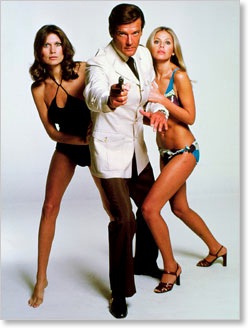
Entertainment Weekly continues to be kind to my childhood hero. In this week’s issue that arrived in the mail yesterday (yes, we subscribe), I was very pleased to see an interview/profile of the 81-year-old Moore titled, “And the Bond Plays On” by Chris Nashawaty. The article’s a good read whether Moore’s your Bond or not. A number of sections resonated with me (my apologies for highlighting the dig at Craig below):
I was 8 years old when I saw my first James Bond film. It was the summer of 1977. I consider myself blessed by the timing. The Spy Who Loved Me was not only the best Bond movie Moore ever made (an opinion he shares, by the way), it was also — thanks to the luscious Barbara Bach and the steel-toothed giant Jaws — one of the best films in the series.
Moore was the first Bond I knew. Like anyone who grew up in the '70s, I'd later catch up with the older Sean Connery films on TV. But they didn't compare. They just seemed like smudgy Xeroxes of the Bond I'd first seen in the theater. And where was the fun? Sure, Connery was more dangerous, rougher around the edges, deadlier with a Walther PPK. But Moore was lethal from 10 paces, armed with nothing more than a cocked eyebrow and a saucy bon mot. And if there was some sort of sexual double entendre in that bon mot, well, all the better for an 8-year-old.
Moore had the good luck to play Bond during the last gasp of the Cold War. Often the plots were needlessly byzantine and downright absurd (the outer-space love story involving Jaws in Moonraker comes to mind). But most of Moore's Bond flicks were catnip to boys who hadn't discovered girls yet. In Live and Let Die, he got entangled in Caribbean voodoo. In The Man With the Golden Gun, the villain had a superfluous nipple. And in For Your Eyes Only, he was chased down the Italian Alps by Aryans on motorcycles — Aryans on motorcycles! Cheese, yes. But served up with just the right amount of ham, thanks to Moore.
Moore played 007 more times than any other actor. By rights of possession, he owns the part. Connery appeared in only six, if you exclude the unofficial and embarrassing 1983 comeback Never Say Never Again (I doubt even Connery wants to include that one). And as any apprentice-level 007 aficionado knows, there were also the blink-and-miss George Lazenby (one film), the placeholding charisma vacuum Timothy Dalton (two), and the so-suave-he-was-almost-bland Pierce Brosnan (four). Now, of course, we have Daniel Craig, who's updated Bond into a sort of sadistic, knuckle-scraping Jason Bourne in a tux. He's serious, flawed, and, if you ask me, kind of a drag.
The knock on Moore has always been that he played the character too lightly. He was too arch. Too jokey. But that seems a bit rigid. Moore's Bond films grossed $1.2 billion worldwide. He took over a hugely popular franchise after its leading man walked and kept it humming for 12 more years. As far as I'm concerned, Moore is, was, and will always be Bond. It's not a critical argument, just one from the heart.
When I explain this to Moore — that the Bond you love first is the Bond you'll always love most, he seems genuinely touched. I think he even calls me ''dear boy'' before turning to Kristina and saying, ''Darling, get Sean on the phone. He needs to hear this.''
Good stuff. Read the whole article for more/Moore.
Quantum of Solace

The weekend numbers are in. Quantum of Solace earned over $70 million dollars its opening weekend, a record best for the franchise, even adjusted for inflation. I hope you like the “new” Bond because with this kind of revenue, there will be no other “course corrections” for quite some time. Daniel Craig is under contract for at least two more films.
For my full thoughts on Craig as Bond, see my review of Casino Royale. However, it goes without saying that even with a second movie under his belt, how well Craig fits the role is still a hot topic of conversation and debate. And it’s not so much that Craig is new in the role or even that he’s blond. Rather, the debate continues because of how much the Bond character himself has had a complete makeover.
As I mentioned in my previous review, the old saying about Bond that “Every woman wants him; every man wants to be him” no longer applies--at least not the last part. I would not want to be this Bond. It would be too painful physically and emotionally. But it’s interesting now how many women are interested in Bond than ever before. This is especially true for those women who in the past, simply saw Bond as a “man’s” movie series. This is a Bond who is more vulnerable and can even be pitied. And yet this is also a more dangerous Bond. In one brief conversation about the movie I had yesterday, a friend of mine described Craig’s Bond perfectly in one word: tortured.
As Kathy and I were driving to the movie on Friday, we heard a less than positive review of the movie on the radio. The reviewer pointed out that in the new movie there are no fancy sports cars and the only love interest came in the previous movie. This is partially untrue. Bond does, in fact, drive the characteristic Aston-Martin at the beginning of Quantum, but to copy a title from an earlier Bond film, it gets the living daylights knocked out of it. When Bond arrives back to his MI6 hideout, the Aston Martin is missing a door and is scratched and dented enough to simply have the whole thing totaled. That car, especially the treatment given to it at the beginning of the movie is a good analogy of what’s been done with the James Bond character. He’s being completely deconstructed. No longer will he fight bad guys without getting his tuxedo dirtied. Now it gets dirty, torn, and bloodied--and so does the character himself.
Many will claim that this Bond is much closer to Fleming’s original vision. Maybe, but not quite. I’ve read most of the Fleming books as well as those of his successor, John Gardner. I can tell you that this Bond is probably closer to Fleming’s vision, but he goes even further. He’s much darker than Fleming imagined. Fleming’s Bond still liked his martinis “shaken, not stirred.” The new Bond, as you might remember from Casino Royale doesn’t “give a damn.”
All of this might leave you with the impression that I didn’t like the movie or that I don’t like the new Bond. Not so. But I admit that I think of this Bond differently. Almost as if he’s a separate character, and this is a separate series. In some ways, it really is. And at times I still miss the old Bond, and I will continue to wish that Brosnan could have made one final movie before the reboot. But enough about that.
Quantum of Solace picks up immediately where the previous movie left off, and I mean immediately. I had watched Casino Royale again a few months back, but it wasn’t recent enough. Ideally the best way to view Quantum of Solace is by watching the previous movie at home and then driving immediately to the theater.
Quantum has been billed as “Bond out for revenge,” but that’s too simplistic. Yes, Bond does go a bit rogue in this movie while M, head of British Intelligence is trying to reign him in, but the real question is whether Bond is motivated more by revenge or more by duty. The answer to that question becomes a bit more clear by the end of the movie.
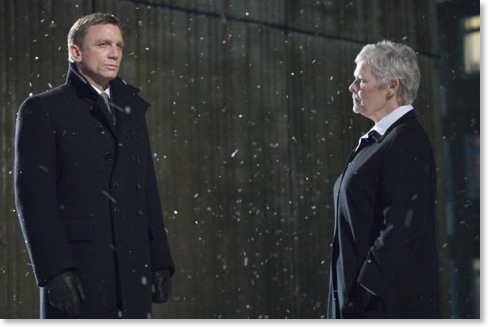
As already mentioned, although there are a couple of “Bond girls” in this movie, the real love interest in Quantum is still Vesper from the previous movie and she’s dead. Bond obviously had feelings for her, but feels betrayed by her in this movie and the feeling stings. Although there are a few quips here and there, the traditional Bond humor is gone in this installment, but the action and suspense is heightened.
As for the villain, there not much I can say without giving away crucial plot points. However, I will say that this Bond villain will not go down in history as the most memorable bad guy James Bond has ever faced. But maybe that’s by design. Maybe Bond’s wrestling with his own inner demons is the more crucial conflict of the film.
My hope is that by now Bond has dealt with his anger and angst over the scenarios created in Casino Royale and that now he and we, his audience, can move on. I don’t expect we’ll ever go back to the Roger Moore days of nearly winking at the camera, but a bit of levity would be appreciated. Too much of what we see in Quantum to the complete exclusion of the “fun” of the traditional Bond movies could become tiring after a while.
Unless I’m mistaken, the title “Quantum of Solace,” one of Fleming’s short stories about Bond, has now exhausted all of Fleming’s original works (the movie had nothing to do with the story other than the title itself). I don’t want to give away the ending of the movie, but it seems to me that for the next time around, it might be a perfect time to start introducing John Gardner’s works beginning appropriately with his first title License Renewed.
CT Posts Review of Bill Maher's Religulous
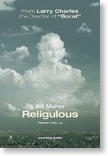
Honestly, it's not the hardest thing in the world to make a religion look silly when you only focus on the kitschiest, most grimace-inducing practitioners of it. Sure, we have to own up to these unfortunate (but fortunately fringe) elements within our ranks, but Maher shores up little credibility for his cause by refusing to talk with any opponent with an ounce of nuance of theological rigor.
Here’s an idea: let’s spend the next year praying for Bill Mahar’s conversion to Christianity. Let’s pray that God sends him on a dramatic and undeniable “Damascus Road” type of experience. Sometimes this is what it takes for those who are furthest from God. Knowing Mahar, you might think this is an impossible thing to pray for, but remember Jesus’ words in relation to those of whom we doubt can find salvation: “The things that are impossible with people are possible with God” (Luke 18:27, NASB).
After the Fact: Reflections Upon The Dark Knight
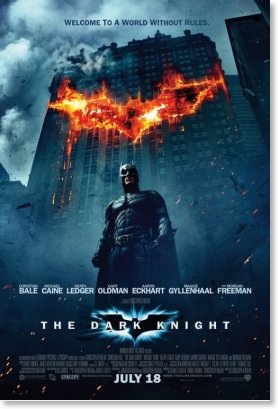
I grew up reading comic books, transported away to a land of super heroes and super villains. I don’t buy comic books anymore except perhaps a rare purchase of a graphic novel or a collection of stories that have received acclaim. But even to this day, in any life or death situations I might find myself in, I often ask “WWBD?” (What would Batman do?).
The Dark Knight was one of the most intense super hero movies I’ve seen to date, and while I am not going to write a review this far after the fact, I thought I would offer a few thoughts for conversation now that I’ve been able to reflect upon the movie.
- This was the first Batman movie to not have the name “Batman” in the title. I was very pleased with the title itself, The Dark Knight, because it sets the stage to one day produce a movie based on Frank Miller’s graphic novel The Dark Knight Returns. If you aren’t familiar with Returns, this is the story of an aged Batman who, with the help of technology comes out of retirement to face old foes and his own mortality. People often point to Frank Miller as the greatest influence on the Batman stories that have been told since 1989; however, I would suggest that Miller was building upon the Batman from the Denny Miller and Neal Adams stories of the seventies. Miller and O’Neal singlehandedly rescued Batman from the camp of the 60’s television show and took the character back to his darker roots. To this day, Adams may still be my favorite comic book artist of all time. I would hope that Warner Bros wouldn’t wait 20 to 30 years for Christian Bale to get older for a Returns movie, but I’m not certain who would play an aged Bruce Wayne right now among current Hollywood actors. In ten years George Clooney would be a good pick if it weren’t for the fact that he’s actually played Batman and the movie was absolutely horrid.
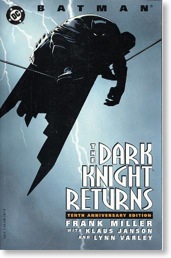
- Heath Ledger was magnificent as the Joker. His tragic death at such a young age is, indeed, an incredibly unfortunate turn of events. To say what I’m going to say next would have been deemed insensitive a few months ago, but perhaps now we can ponder where his death leaves us in regard to the current film series. My long complaint against superhero movies is how often a villain is killed off at the end. Comic books, which have to produce multiple stories around the main characters every year can never afford to kill off villains. They have to return by the nature of the medium. Contrary to the ending of 1989’s Batman, in The Dark Knight, the Joker actually lives to face his nemesis another day. There was even dialogue in the movie about how much the two characters needed each other. I’d heard rumors that originally there was discussion that the next movie might be loosely adapted from The Trial of the Joker. But now with not only Ledger’s death, but with Ledger’s magnificent performance we probably won’t see the Joker again until the series is rebooted yet again in 15 to 20 years. My friend Rob Carson suggested to me that if anyone could take over the reigns of the Joker, it might be Johnny Depp. However,
now it’s been confirmedrumor has it that Johnny Depp may play the Riddler in the next movie.
- Christian Bale makes for an excellent Batman (although I think his voice became too gravelly near the end of the movie, making him hard to understand). However, I think he could do better with his portrayal of Bruce Wayne. Few characters in comic books are as complex psychologically as Bruce Wayne. On one hand he has to portray himself as the millionaire (now billionaire) apathetic playboy, yet in reality from a psychological standpoint, he’s slightly batty (pun intended) himself. Batman is a bit on edge (and much meaner than Superman) because he’s not quite right in the head as Bruce Wayne. And he’s not quite right in the head as Bruce Wayne because he has to dress up as a giant bat every night. Michael Keaton wasn’t as good of a Batman, but he may have been a better Bruce Wayne.
- Speaking of the psychology of these characters, I believe that Harvey Dent/Two Face got a bit short changed (another pun, but I’m stretching it this time in regard to his silver dollar). Actor Aaron Eckhart said that he actually studied split personalities in preparation for the role, but really there’s not much in the script for him to make use of this background. In the comic books, Two Face actually has a split personality. At one moment, he might be able to talk to someone rationally as Harvey Dent, but then in the next, he flips a coin and kills the person in cold blood as Two Face. I originally thought they were building the Harvey Dent character up for the next movie, and I really feel his short time as Two Face was wasted. My biggest gripe about most superhero movies is that they try to do too much. They fit in two bad guys when it would be much better to just focus on the one. I really wish that the Joker had been the main antagonist in this movie and perhaps Two Face in the next or even the one after. By the way, if Two Face was underdeveloped for this movie, that means by necessity that killing off the Rachel Dawes character was a bit of a waste as well.
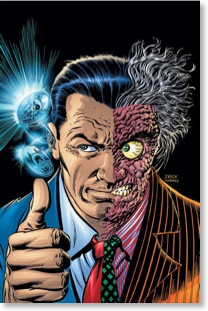
- Did you notice that the director went out of the way to never show the face of Commissioner Gordon’s daughter? Contrary to the awful Batman and Robin of 1997, Batgirl is not Alfred’s niece but rather Commissioner Gordon’s daughter, Barbara Gordon. Evidently, the PTB did not want anyone’s face associated with Barbara Gordon/Batgirl this early in the stories.
- Personally I thought the ending of the movie was a bit convoluted. So...Gotham needs a hero besides Batman to look to, even if it’s not true? Why did Batman have to take the blame for Dent’s death? Why couldn’t it have simply been made known that the Joker was at fault but that Batman had beat the Joker? And ultimately, does that mean that the Joker, in his desire for anarchy and chaos simply for their own sake, ultimately won? Now granted, many movie trilogies present a middle story with a somber climax (Empire Strikes Back, Back to the Future II, The Two Towers, etc.) so that the final victory in the third part is magnified. However, knowing that the script for the third movie isn’t written yet, I have doubts that Christopher Nolan and company have that solid of an overaching plan. I don’t believe we are going to see the unity of subplots that we saw in Sam Raimi’s Spider-Man trilogy in these movies, especially with the death of Rachel, but that’s not necessarily their goal either. They may simply desire to create a series of movies that focus on the character more than the events in the character’s life--much like way the James Bond movies have traditionally been made.
In my previous post, I mentioned my friend Andrew who died in 2006. His favorite Batman movie had been the much darker Batman Returns (1992). I wish I knew what he thought of The Dark Knight. His interpretation of the style and plot points would have been interesting to hear.
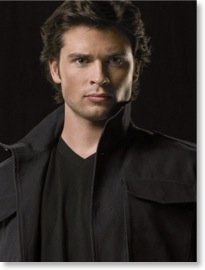
Personally, I think it would be a mistake to go to too radical of a revision (say a cyborg Superman or a Superman with long hair and sunglasses as they’ve done at times in the comic books). A radical revision would drive away the moderate fans who just want to see Superman in action.
However, after watching the two most recent 8th season episodes of Smallville, I have to think it would be a shame if Tom Welling never gets to actually don the costume. I believe that if the PTB at Warner Bros were smart, they’d cap off this final season of the television show and immediately launch Welling into the full blown Superman role. They could keep the continuity of the television show for a series of movies. For what it’s worth, Welling is actually older than Brandon Routh who portrayed Superman in the most recent movie.
The Assassination of Jesse James by the Coward Robert Ford (Blu-ray review)
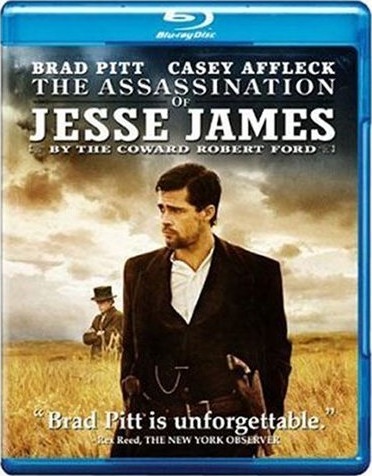
I still remember the first time I ever heard the name “Jesse James.” It was on an episode of the Brady Bunch in which Bobby announced that his new hero was the outlaw Jesse James. Of course Mike and Carol were horrified so greatly that they went to all the trouble to find someone whose family had been killed (decades earlier) by the notorious outlaw. Then Bobby saw how wrong he had been and all was right in the Brady world until Marcia broke her nose in the next episode.
Of course at the time, I had to wonder how Jesse James could have ever been anyone’s hero. Nevertheless, both in James’ own lifetime, and in the years that would follow, he was very much the hero to many people, especially to those in the post Civil War South. He was looked upon as “Robin Hood” character to some, one who as a former Confederate guerrilla stood up to “Northern oppressors” both during the Civil War and afterwards. The real Jesse James was a bit of a psychopath, in spite of his role as a family man and his singing in the church choir. But of course, the neighbors of serial killers are always shocked, too, because after all, “he seemed so normal.”
The James brothers were so popular in their day that when Frank James finally turned himself in (not depicted in the movie), he only faced two trials and no jury would sentence him to jail time, let alone pass down a death sentence which the average criminal of his day committing similar crimes would have surely received.
The Assassination of Jesse James by the Coward Robert Ford is also the name of the novel by Ron Hansen upon which the screenplay was based. According to the trivia at the Internet Movie Database, Brad Pitt (who stars as Jesse James) had a clause in his contract that would not allow the name of the movie to be changed. No doubt he was concerned that some studio executive with more power than insight might feat that the title is too long. And perhaps it is, but within that title the entire plot (and perspective) of the movie is told.
In the original novel Hansen attempted to write an account that may have been truer to the actual events as opposed to a lot of the sensationalized accounts surrounding Jesse James that began to appear even within the outlaw’s lifetime. Certain elements such as dialogue and even motives are fictionalized, but the fiction is based upon known events and reasoned speculation. Due to this approach, the movie is not the fast paced, action packed western that many fans of the genre may be used to. In fact, the story simply plods along at times, but this is not by accident. The events surrounding James’ death are complex and the creators of this movie take the time to introduce characters and establish intricate relationships. The original cut came in at an epic length of four hours, but the studio required that it be cut further; and the final running time is two hours and forty minutes.
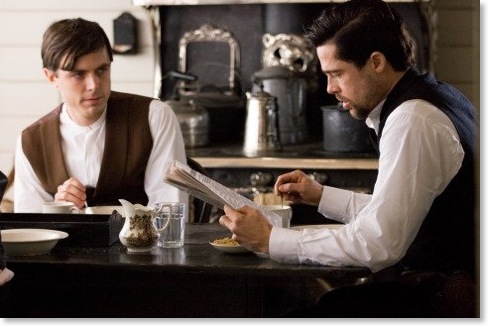
Part of the reason Pitt was able to keep me on edge was due largely to the outstanding performance by Casey Affleck who played Robert Ford. Despite Pitt’s top billing, the movie is mostly told from Ford’s point of view. Affleck expertly portrays the insecure, hero-worshiping friend-turned-traitor, Robert Ford. In his first scene when Ford is trying to persuade Frank James to let him be his “sidekick” for a train robbery, Affleck demonstrates Ford’s uncertainty and admiration at the same time by rushing his words and failing to look James in the eye. Affleck’s portrayal of Robert Ford reminded me of a fellow in high school I knew who wasn’t initially part of a popular clique but became accepted by them nonetheless. And after his acceptance, his enthusiasm to fit in became obnoxious to the point that he actually began to view his new clique with contempt and eventually moved on to another. I remember some of the fellows saying, “We created a monster.”
In Ford’s admiration of the James brothers’ celebrity, he desired to have celebrity of his own which he found by turning on his mentor, Jesse James. But Ford’s celebrity would be short lived as he turned from being the man who brought down the most infamous outlaw of the 19th century to the one sung of as “the coward who shot Mr. Howard” (one of Jesse James’ aliases).
More interesting to me than the movie itself was the documentary included on the disc that provided the factual background to the movie including a social-psychological profile on James regarding what may have made him into the person he was and what led up to his assassination by one of his own gang members. However, the documentary would not have been as intriguing without seeing the movie first. Other than this, the disc is bereft of any additional features. Despite Blu-ray’s claim to 50 GB per disc, studios seem to rarely take advantage of the disc’s capacity. Despite the excellent high def movie experience, if Blu-ray fails to catch on, it may be from distributors creating limited offerings while charging premium prices.
My copy of The Assassination of Jesse James by the Coward Robert Ford came through my NetFlix subscription. The movie is good enough for a rental, but unless you have other interests in the historical character or the period, I don’t recommend it for your private collection.
Get Smart Could've Been Smarter
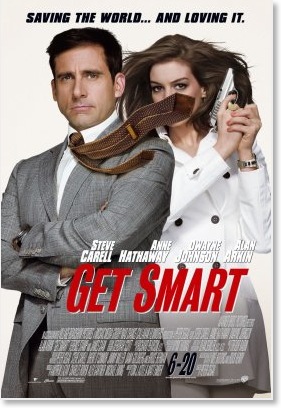
I’ll cut to the chase: the timing of the dialogue was off. It lacked the quick wit of the original television series. The movie dragged a bit at times, especially at the beginning.
Part of the gag with the original Don Adams version is that he was NEVER self-aware of the fact that he was a bumbling idiot. This Maxwell Smart, played by Steve Carell, was often insecure and way too self-analytical. He was well... your typical Steve Carell character. Don’t get me wrong--I like Steve Carell, especially in The Office, but the character of Maxwell Smart in this version was obviously tweaked for Carell’s trademark style.
I’m certain the movie will be successful enough for sequels, but this just made me long for the original show. And I hear that the 1989 reunion movie, Get Smart, Again!, isn’t too bad (1980’s The Nude Bomb was made without Barbara Feldon, so it never felt complete to me).
There were some funny and even clever parts in this movie, but they seemed too spread out, and the movie could have been better. For instance...
The story explains that Agent 99 (played by Anne Hathaway) had disguised herself through plastic surgery to make herself look younger. Hathaway is 20 years younger than Carrell, so I guess they were concerned about the age difference. She showed him a picture of some blond that was supposed to be her former self. I don’t think it was supposed to be someone familiar, but if it was the joke went past me. But more importantly, I believe they missed a perfect chance to show a picture of the ever-lovely Barbara Feldon (the original Agent 99) and say that this was what Hathaway originally looked like.
Finally, I guess I’m becoming more of a prude as I get older, but it distresses me that someone felt the need to make what had originally been Rated-G type material and add enough sexual inuendo and language to end up with a PG-13 rating. The original was the kind of show that the entire family could watch together. The new Get Smart is not for children, and it distresses me that there were very small children in the theater in which we saw the movie.
This is growing trend that continues to bother me, but I’ll write more about that another day.
The Look and Sound of Disappointment
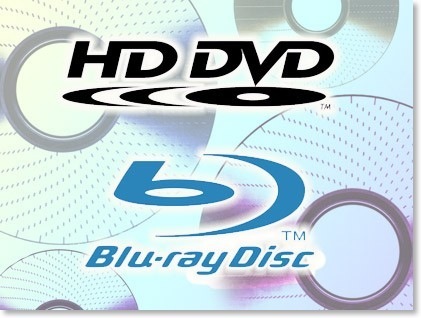
Early adoption involves risk.
A year ago this month I wrote about my "free*" plasma television I received as well as an HD DVD player added into the deal. My follow-up post described the format war in high definition video between HD DVD and Blu-ray.
In the past year, I've found that most people--even those who have high definition televisions (those wide, flat ones)--are mostly uninformed about high definition video. A friend of mine was quite proud of his new HD television that had been set up in his basement. I asked him, "Do you have a high definition video player?"
He paused, not sure what I was asking. "Yes," he said, unsure of his answer.
"What do you have--HD DVD or Blu-ray?" I asked.
Again a pause. "Well, I have an up-converter for my DVD's. Is that what you mean?"
Well... no.
A number of videos have been released with high definition on one side of the disc and standard DVD format on the other. It's a great way to show the difference between the quality of "old-school" DVD's and new high-definition video disks. It's an unbelievable difference, and once you go truly high def with a high def movie player, you can't go back to regular DVD's.
When I got my HD DVD player, I said that there were three main film or film series that I wanted in high definition: the Lord of the Rings trilogy, Blade Runner and the Matrix trilogy. As of Christmas since Kathy gave me Blade Runner (all five versions!), I have two of the three. The Lord of the Rings has been yet to be released in high definition. But it was promised to be on its way from New Line Cinema.
Nevertheless, in spite of the wonders of high def video, there's been a war going on. A war between formats. A war that harkens back in spirit to the old days of VHS vs. Betamax. This time the war has been between HD DVD and Blu-ray, with some studios backing one and some studios backing the other. For instance, Disney, Sony, and 20th Century Fox only deliver movies in Blu-ray format while Universal and Paramount only deliver HD DVD titles. The only major fence sitter left was Warner Bros who sells videos in both formats.
It's tough on the consumer because unless you have both players or unless you have one of the few dual format players (that cost upwards of $1,000), you simply can't get certain movies in high definition. When people asked me which format to invest in, I told them HD DVD, of course since that's what I had. But then I'd tell them that honestly, there was not any real difference in picture quality. I'd tell folks to make a decision so that the market could help decide things.
But I knew deep down that this could be a long war. I mentioned that in my post last January. See, when VHS and Betamax were battling it out, folks didn't have to get a whole new television to take advantage of the new technology. But for HD DVD and Blu-ray, they do. And even the change in broadcast channels to HD next February doesn't mean that everyone is going to throw away their old sets. Most will probably opt for a converter box.
Nevertheless, my collection of HD DVD movies has been growing. And I enjoy nothing more than popping in a new one and enjoying the experience.
But then there was last Friday... black Friday as some HD DVD owners are calling the day. The day when the format war was pronounced all but over except for the shouting. If you haven't heard, that was the day when Warner Bros., the last of the fence sitters, picked a side.
And they didn't pick my side.
WB stated that beginning in May, they would only release high definition movies in Blu-ray. Although I'm sure the corporate backers of HD DVD will fight till the end, most think that HD DVD is now sunk.
It's disappointing because in this format war that had gone back and forth, I was really starting to think that HD DVD might turn out to be the winner in the long run. With players dropping below $200 and brisk Christmas sales, things were looking up despite the fact that Blu-ray movies sell more copies at an almost 2:1 rate over HD DVD, thanks to the Trojan Horse Blu-ray player included in every Sony PS3 system. And it makes one wonder how things might have turned out differently if Microsoft, an official backer of HD DVD, had included an HD DVD player with every Xbox instead of just offering it as an add-on.
This week it was rumored that Paramount would also drop HD DVD in favor of Blu-ray. They have since denied this rumor, but I have to wonder how long they could possibly hold out. Also before the CES conference this week, it was rumored that Microsoft was going to announce a high-end Xbox with HD DVD built in. They have since denied this, but my hunch like a lot of other folks is that it was simply pulled at the last minute after WB's announcement.
Although there's no perceptible difference in visual quality between the two formats, HD DVD which had an almost year long head start over Blu-ray is really a more mature technology. An example of this was in the release of the movie 300 a few months back. The HD DVD version allowed the raw footage in front of the blue screen to be viewed in a window over the final production. The Blu-ray edition allowed the viewer to see the raw footage, but not at the same time as the movie was playing. The reason behind the difference had to do with Blu-ray's unfinished Java engine. For similar reasons, Warner Bros. has yet to offer the Matrix Trilogy on Blu-ray even though it has been out on HD DVD for a while.
So I look upon what was a nicely growing collection of HD DVD movies with disappointment. No, I'm not concerned about being stuck with a dead technology. VHS is dead, but I can still watch my video tapes. Vinyl records are a dead medium, but I can still listen to them if I want to. But I am hesitant to further buy anymore HD DVD movies, just as I would not want to buy any VHS tapes or LP's. And for that matter, I can't stand to purchase a standard DVD format as it is not truly high def, up-converted or not.
But my reticence to purchase any more HD DVD titles, just like most others out there in the same condition, will help to drive the nails in the coffin of the technology and allow the Blu-ray format to gain an even speedier victory.
At the same time, who can afford a Blu-ray player? This would be the solution to the HD DVD owners--to simply go out and switch sides with the purchase of a new machine. But Blu-ray players start between $350 and $400 for the low-end models. They are still simply way too high.
So we wait. I wish it weren't so, but I can't see how the HD DVD format can recover from Warner Bros. decision--which they admit was made to help end the format war. And in that regard, I reluctantly admit that it's for the best. I mean deep down, I'd prefer to be able to buy any movie I want in high def, not just ones that will work in my player. But I'm disappointed nonetheless. I picked the wrong side!
HD DVD, rest in peace. Long live Blu-ray (he says with resentment).
Save Journeyman

For years it seemed as if there was nothing good on television--nothing that seemed to capture my imagination anymore. In recent years, I’ve discovered a handful of shows that I enjoy such as Lost and Heroes. This year another show piqued my interest, and after watching the pilot I was hooked. That show is Journeyman.
If you’re completely unfamiliar with the premise, here is the synopsis from NBC.com:
From Emmy Award-winning writer-producer Kevin Falls ("The West Wing") and Emmy Award-winning director-producer Alex Graves ("The West Wing"), "Journeyman" is a romantic mystery-drama about Dan Vasser (Kevin McKidd, "Rome"), a San Francisco newspaper reporter and family man who inexplicably begins to travel through time and change people's lives. Along the way, he also must deal with the difficulties and strife at work and home brought on by his sudden disappearances.
However, his freewheeling travels through the decades reunite him with his long-lost fiancée Livia (Moon Bloodgood, "Day Break") -- which complicates his present-day life with wife Katie (Gretchen Egolf, "Martial Law") and their son. Reed Diamond ("Homicide: Life on the Street") and Charles Henry Wyson ("The Curious Case of Benjamin Button") also star.
Yes, there are shades of the old show Quantum Leap in Journeyman; however, that show was primarily episodic with very little continuity between episodes. Journeyman presents a mystery that gradually unravels more and more through each episode. We don't know why Dan is disappearing through time. Is it God? Is it an unknown scientific project that has focused its attention on him? I've also read comparisons between Journeyman and the book, The Time Traveler's Wife, but having not read that book, I can't really comment. All I know is that the writing is good; and the characters not only have depth, they have complicated relationships, made more so by what's happening to Dan.
If you're a fan of the show, it's time to step up to try to save it. The first ten episodes have aired, and there are two more to go. After that there's nothing. Part of this is because of the current writer's strike in Hollywood. The other reason is that the ratings haven't been quite what NBC wanted and they have yet to order what's called the "back nine" of episodes that would complete the entire season. The next episode will air December 10 on NBC at 10PM EST, and it's important that you watch it.
But there's more you can do in the meantime. First there's an online petition, and I encourage you to sign it. Second, NBC pays attention to who is viewing what on the internet (that's a lot of what the writer's strike is about). Download episodes or even the whole season of Journeyman through iTunes (Journeyman is still on iTunes in spite of NBC pulling all of their shows over the weekend because 10th Century Fox produces the show). Also go to NBC's websites and watch episodes there. This is a great show. Good writing is rare on television these days, and perhaps in a junk food culture, good writing is working against it. But I could really see it carry its story through multiple seasons if enough people watch it.
Even if you've never seen Journeyman before, please check it out.
Links of importance. Sign the petition. Watch/download episodes:
- Journeyman on iTunes
- Online Petition to Save Journeyman
- NBC Journeyman Page
- NBC Direct Journeyman Page
- Amazon.com Unbox Journeyman Episodes (see box to the right).
1408
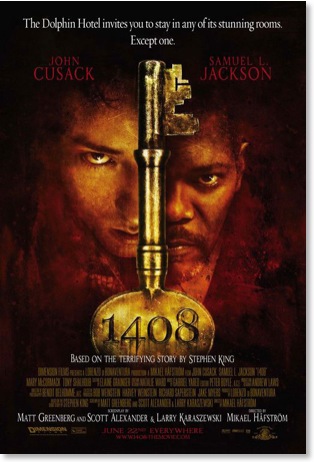
When Mike receives a mysterious postcard from the Dolphin Hotel in New York City with the simple message, "Don't stay in 1408," he is intrigued. He also notes that when the numbers in the room are added up (1+4+0+8), they equal 13. After calling to book a reservation, he's told that no one is allowed to stay in this room. Mike does a bit of research and discovers that 20 or so people have taken their own lives in 1408. Later he will find out the death toll is much higher--newspapers didn't report the 30 or so more deaths of supposed "natural" causes (heart attack, stroke, etc.). Using a little known Civil Rights law, Mike forces the manager of the Dolphin Hotel (played by Samuel L. Jackson) to let him stay in the room. Then hilarity ensues. Okay, hilarity is certainly not the right word. Substitute horror.
Really, I don't want to give away anymore of the movie. I realize that only a small fraction of those reading this will actually go see it. However, the experience in the hotel room is a roller coaster ride that won't be soon forgotten. Cusack is a very talented actor. He's about a year older than me, and watching his performance in Better Off Dead when I was a teenager made me immediately connect to him, something that has lasted to this day. I've even suffered through the occasional romantic comedy that Kathy often wants to see if he's in it. Of course 1408 is no romantic comedy. But it does put Cusack into a role a bit different from his other performances. Probably about 2/3 of the movie takes place in room 1408 and Cusack has the entire screen only to himself. The only two characters are Cusack's and then the room itself. Few actors could pull that kind of performance off, but Cusack does it well and we get to see emotions from him that very few of his other films ever do.
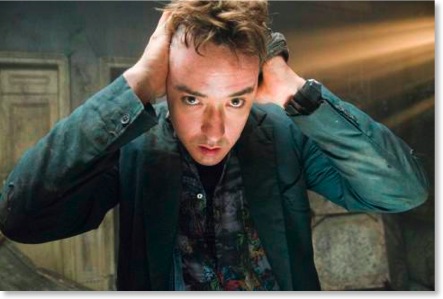
The movie keeps the audience guessing up to the last minute. Is the room really haunted? Or is Enslin dreaming? Or has he been drugged? Is he having a mental breakdown? Just when you think you know, you find out that you don't know. 1408 is not quite on the same level as King and Kubrick's The Shining, which is of similar genre. However, it's a fun thrill ride with a few genuinely scary moments. It will certainly keep your attention--if you're brave enough to enter.
Why You SHOULD Go See Evan Almighty
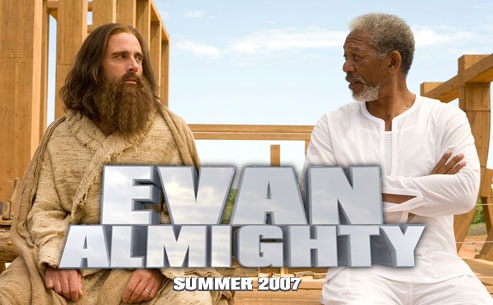
About a week ago I read a very sincere blog entry from Tim Challies outlining three reasons why he would not go see Evan Almighty. In my opinion, his third point is the most significant:
But I think my greatest and overarching concern is this: this movie, like the one before it, makes light of our faith. When people walked out of Bruce Almighty I don't think they had a greater and deeper understanding of God. They did not have greater love for and respect for Him. The genre simply could not bring so serious and important and biblical a message. Amidst all of the laughs and vulgarity there would simply not have been opportunity to really help people understand God better, despite the filmmaker's attempts. And when people walk away from Evan Almighty they will not love God more. I don't think they will have a greater understanding of the Bible. In fact, I suspect they'll see the biblical story of the flood as being as fictional as this movie--a quaint plot but completely unrealistic and implausible. Mere fiction. This movie will not and cannot bring anyone closer to God. Rather, it will necessarily project a false image of God, a false understanding of Him. And we're being told to watch this, to enjoy this, and to bring our families to see it so they can laugh with us.
Now I want to say up front that if Tim is convicted that he should not see this movie, he should not go see it. There are certain movies I will never see because there are certain kinds of movies that I cannot see in good conscience. So I understand that. However, I would hate for him--or anyone else--not to see it simply because his concerns are overblown.
Tim speaks of his struggle over whether or not to see the first film, Bruce Almighty, and I have to admit that I had the same reservations although at the insistence of some people I highly respect, I finally got around to watching the movie. Yes, there were some objectionable parts in it, but there were also some very redeemable elements and I don't think that the movie made fun of the Christian faith--in fact, I felt that it was quite respectful of the Christian faith. And the interviews I've read with the director, Tom Shadyac, convince me that although my beliefs might not line up with his 100%, he's still serious about his Christian faith. Nevertheless, there were still some questionable elements of Bruce Almighty, and it's not a movie that I could recommend to just anyone--although I probably could to most.
Thankfully, the sequel, Evan Almighty, is a different issue altogether. I took part in an invitation for "ministry professionals" to view the film about three weeks ago. I went in hopeful but nervous with many of the same concerns and fears that Tim described. And yet, I was pleasantly surprised and even taken aback in a few places at how overt the biblical interactions were in this movie. In fact, the biblical references are so overt, I wonder how much of the movie would go over the head of someone who is completely unchurched.
If you don't know the plot by now, the story involves a recently elected congressman named Evan Baxter (played by Steve Carell) who after moving his family to Virginia (to be near DC) is visited by God, played by Morgan Freeman, reprising his role from the first movie. God wants to take Evan up on his campaign promise to "Change the World." And yet, his command upon Evan is seemingly absurd--he's told to build an ark. Yes, an ark just like in the days of Noah. In fact, over the course of the movie, Evan is transformed into a Noah character right down to physical appearance--kind of like Tim Allen's transformation in The Santa Clause.
Let me tell you some positives of the movie and why I believe it should be supported, especially by Christians.
- Most importantly, this movie does not make fun of the Christian faith. In a refreshingly welcome move, the movie is very much from a Judeo-Christian worldview. In fact, the very flavor of this movie reminds me much more of a movie I'd expect to come from Walden Media as opposed to a studio like Universal, the actual movie company. And for all the complaints about the protagonist of the first movie living with his girlfriend (although he was not a believer), the sequel is squarely family oriented focusing on Evan, his wife and his children.
- God's sovereignty is primary throughout the movie. In an almost Jonah-like fashion, Evan does not want to have anything to do with God's plans for his life. He fights them to his own peril until he finally submits. And it's significant that his submission to God's will is in the context of his not understanding why God is asking him to do these things. He doesn't understand, but he obeys nonetheless.
- The movie focuses on a number of very good themes such as faith, hope, the importance of family, and the reality that God hears us when we pray. Both parents are shown praying during times of difficulty. Evan's prayer may not be as eloquent as his wife's, but it's sincere prayer nonetheless.
- There's also a strong message that if someone really wants to change the world, it's not necessarily going to be done in Washington D.C., but it will have to start at the local level with self, family, and neighborhood.
- Morgan Freeman still puts a good face on God. Freeman who tends to gain roles as the local wise man or the conscience of a film works well in this role. For all those who might have a dim view of God (for whatever reason), it's difficult not to like Freeman (although I would imagine God might have straighter teeth if I ever saw him in a theophany).
- Contrary to concerns I've heard voiced, this movie is not about global warming. The threat imposed in the movie has to do with a greedy politician (John Goodman) who has cut corners in his building projects. And in case you're wondering, the politician's party affiliation is never mentioned.
- There's also no conflict with God's promise in Genesis to never flood the world again. God promised never to flood the entire world again. He never said that local floods would not occur.
- There is almost no language in the film (the worst is seen in the trailer; I personally don't use the slang term for urination, but it is in the KJV, isn't it?) and very little objectionable material. What's there was probably done to keep the movie from having a strictly G rating. The movie is rated PG "for mild rude humor and some peril." This is a movie you can feel comfortable watching with your entire family, church groups, pastor, your mom, etc.
Are there any theological problems with the film? Yes, a few, but I don't believe they have to ruin it. Just keep in mind that Hollywood would never produce a perfectly Christian film. But nevertheless, Evan Almighty goes a long way toward being a responsible Christian film that does not make fun of the faith and suggests that spiritual and ethical issues should be a part of everyday life.
Here's a short list of the theological problems:
- There's a reinterpretation of the Noah story at one point that gives less emphasis to judgment and more on the point of Noah and his family working together. The judgment aspect isn't altogether denied, but it's still a bit squishy in my opinion.
- Evan's guide to building the boat is Ark Building for Dummies, which is authored by God. On the inside of the book, the author's bio mentions that he he is the father of 6 billion people and lives in everyone and everything (or something to that effect). Obviously, this idea of living in everyone and everything sounds a bit pantheistic, but the movie does not portray a pantheistic view of God, so I would suggest this is merely poor wording (although you could always take it in the sense of the nephesh of God that is in every living thing). As for the fatherhood issue, take it along the lines of Acts 17:28-29. Of course on a lighter note, one wonders what it would do to the Canon for God to author an entire book about ark building

- The overarching theological problem with any of these kinds of movies is that the central figure of the Bible, Jesus Christ, is left out. The Old Testament always seems safe to cover, but Christ ever remains the most controversial figure in history and often is too taboo for Hollywood films. Nevertheless, the Bible that Evan reaches for in the movie contains both testaments and allusion is made at one point to "Ask and you will receive" which comes from Matt 7:7 or 21:22.
- And not quite a theological problem, but this movie has been criticized for being highly marketed to the church. But it's a double-edged sword isn't it? We complain when Hollywood ignores us, and then we criticize when they pay us attention. I would suggest simply using discernment toward any kind of marketing from any source period, and be wise in making decisions so that marketing is not always a controlling factor.
Granted, Evan Almighty isn't going to make any of the American Film Institute's top 100 lists. It might not even make the money of its predecessor. But it's a fairly good movie that can be enjoyed with the whole family and lead to spiritual discussions afterwards. Yes, some parts are cheesy, and the movie starts off a bit slow, but it builds along the way. The climax is--dare I say it--breathtaking on the big screen, and when the credits rolled, the audience I saw it with (again, mostly "ministry professionals" and their families) cheered and applauded.
Tim Challies was concerned that this movie would not cause viewer to love God more. Well, I have no way of knowing what kind of reaction it would have on any person. But I do know that I see lots of movies that don't cause me to love God more, but the themes of this movie are positive and come from a biblical (albeit not perfectly biblical) perspective. This would be a great movie for churches to use as discussion starters. If anyone is convicted not to go to this movie, it is between that person and God, and I won't try to circumvent that. But just be sure that any such convictions are based on the facts and not the fears of imagined perceptions.
Fantastic Four: Rise of the Silver Surfer
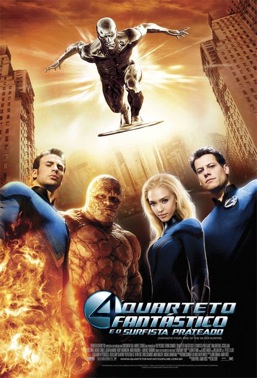
Fantastic Four: Rise of the Silver Surfer picks up with our fearless foursome where the last movie left off. Although Johnny Storm, Sue Storm (soon to be Sue Richards) Reed Richards, and Ben Grimm have hero names (Human Torch, Invisible Woman, Mr. Fantastic, and the Thing, respectively), their identities are known and therefore not secret. Superman, Batman and Spider-Man never had to worry about celebrity status in their private lives, but the Fantastic Four do. So the beginning plotline of the movie revolves around Sue and Reed's attempt to get married in the midst of a paparazzi nightmare. Security is so tight, not even Stan Lee can crash the party (literally). But ultimately, it's the arrival of the Silver Surfer, whose presence symbolizes the end of earth's existence, that puts a real damper on their wedding plans.
So back to the part I now get. I think some of my disillusionment with the Fantastic Four movies stemmed initially from my comparison of them to the Spider-Man and X-Men trilogies. If you don't know this, the Fantastic Four is just as much a part of the A-list of Marvel Comics characters as these other guys. And granted, there have been a few stinkers in terms of Marvel adaptations: the Punisher immediately comes to mind as well as the Daredevil, which I like somewhat except when Ben Affleck is ruining it for me. So the FF movies aren't as bad as those two examples. I'd even put them on a level above the recent Ghostrider. Regardless, I've finally come to understand what the creative minds behind the FF movies are doing. I figured it out by looking at the movie's rating. Both FF movies have been rated PG as opposed to PG-13. The latest installment's PG rating is for "sequences of action violence, some mild language and innuendo." Now the mild language (and it is pretty mild) and the sexual innuendo are completely unnecessary because as opposed to all the other super hero movies of late, the FF movies are much more along the lines of family fare. The fight scenes are much less brutal and the themes are less serious. Understanding the two movies along these lines makes me like them a bit more and certainly less critically. This is the stuff of Saturday morning fare, and when seen in that regard it's well done.
In spite of poor reviews, the first movie did fairly well financially--not groundbreaking, but fairly well--and the sequel should do the same. This means we will probably see more, and that's fine with me. This particular movie is finally hitting a level of I've wanted to see in the genre for quite a while--the aspect of heroes coming into contact with other heroes. And it's fitting that the Silver Surfer should be the focus of the movie because if memory serves, he was first presented in the FF comic books to begin with. And for what it's worth, although the purists will probably nitpick it to death, Fantastic Four: Rise of the Silver Surfer is probably the most immersive movie we've seen so far into the Marvel mythos. Not only is there no attempt to tone down the characters to make them more believable, but we also get introduced to unimaginable characters like Galactus the planet eater. This is the stuff of the comic books that the movies have tended to shy away from in their attempt to be more believable and more grounded.
So don't take the FF movies too seriously. This is good popcorn fun, and even better something you can enjoy with the whole family.
They Won't Let Me Review Evan Almighty
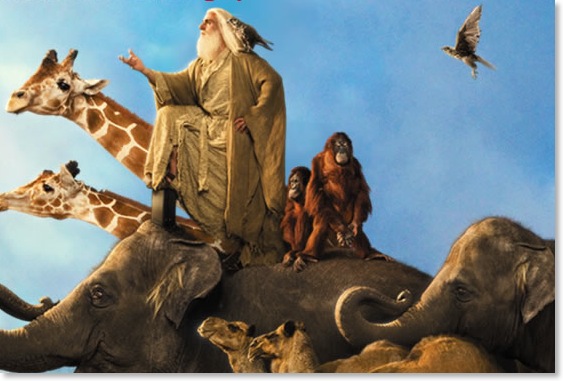
I got to see an advanced screening of Evan Almighty last night, and I was expecting to deliver a review here on my blog today. However, before the movie began an official looking woman said that anyone associated with media outlets is not allowed to publish reviews before the movie's release date on June 22. Does this blog count as a media outlet? Am I really not allowed to say anything about the movie? If only I had been out in the lobby getting some popcorn when that announcement was made!
Evidently the studios are courting the church pretty strong for this movie because I got two "ministry professional" offers for four free tickets. The subject matter makes it fitting, of course. Evan Almighty is a sequel to the film Bruce Almighty which starred Jim Carey. This time around, Steve Carrell stars as the principal character, Evan, whom God (again played by Morgan Freeman) tells to build a boat. [Hey! That's not a review. That's no more information than what you'd get from the trailer]. Tom Shadyac, a professing Christian, is also back as the director.
There's so much I want to tell you, BUT I CAN'T! If I said I liked the movie, and the audience of other "ministry professionals" (and friends) seemed to like the movie, and if I said there was applause from the audience at the end...would that be a review? It might be, so I guess I can't mention any of that. Too bad. I'll have to write the review now, while the movie is fresh on my mind, and post it at midnight on June 22.

ArkALMIGHTY is a good deeds program that matches up the needs in your congregation with the talents and skills of the members of your church. Gathering the needs of your attendees, these requests are compiled on a Craigslist-type website administered by your church. Then, the members of your church can easily search through the needs and find ways they can help.
Maybe there’s a single mom in your midst who doesn’t know how to teach her son to throw a baseball, or an elderly person who needs a ride to the doctor, or a young couple who would love advice on saving for a home. Maybe there’s a college student who could use help moving into her first apartment, or a widow that could use a helping hand washing her windows, or a recently laid-off worker who could use help polishing up his resume. There are countless needs out there that, up until now, have had no way to be met. But now they do, thanks to ArkALMIGHTY.
The ArkALMIGHTY.com website is designed to enable youth groups and churches to easily get involved in practical and tangible volunteer outreach. Can you balance a checkbook? Can you hang a picture frame? Can you throw a spiral? You might not think of these everyday activities as volunteering, but for the people around you who can’t do them, your ability and your willingness to help is exactly what they need. You’d be amazed how a simple act of kindness can change lives.
Entire churches can sign up to take part in ArkALMIGHTY--which in fact, is the model that's encouraged. And that might be a good thing because I'm not sure the average church is often overly plugged into the minutiae of real needs in its own community.
By the way, both the movie [I hope this reference doesn't count as a review] and the ArkALMIGHTY website use A-R-K as an acronym for "acts of random kindness." But wouldn't a program like ArkALMIGHTY count more as deliberate, purposeful acts of kindness rather than random ones? And isn't a goal of performing deliberate acts of kindness better than performing random ones? Okay, maybe now I'm being nitpicky.
Come back on June 22 for my review of Evan Almighty...
This Just In: Ultimate Matrix HD DVD
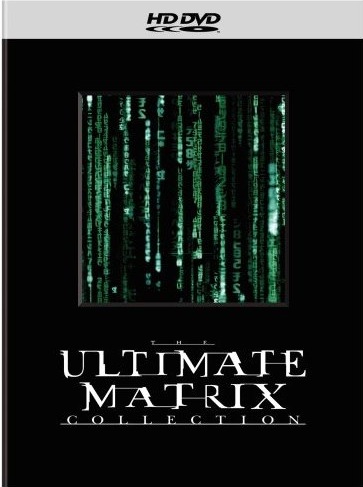
ALL THREE MOVIES IN 1080p HD:
- The Matrix
- The Matrix Reloaded
- The Matrix Revolution
35 HOURS OF BONUS MATERIAL
Written Introduction by the Wachowski brothers
Commentaries by:
- Philosophers: Dr. Cornel West and Ken Wilber
- Critics: Todd McCarthy, John Powers and David Thomson
- Cast/Crew: Carrie-Anne Moss, Zach Staenberg and John Gaeta for The Matrix
- Composer: Don David with Music-Only Track for The Matrix
Feature-Length Documentary: The Matrix Revisited
Behind The Matrix Documentary Gallery:
83 Total Featurettes with The MTV Movie Awards Reloaded and 3-D Evolutions Stills Gallery
The Music Revisited:
41-Track Audio Selection of Nearly 3 Hours of Music
Music Videos:
Marilyn Manson's "Rock Is Dead" and P.O.D.'s "Sleeping Awake"
Enter The Matrix:
The Game Documentary
Enter The Matrix:
View 23 Live-Action Scenes Shot for the Video Game That Plug into the Action of The Matrix Reloaded
The Animatrix:
9 Short Films from Pioneering Anime Directors Exploring the World of The Matrix, Plus 3 Director Commentaries and 8 Documentaries, Including Scrolls To Screen: The History And Culture Of Anime
The Roots Of The Matrix:
Historical, Philosophical and Technological Inspirations are Explored in Insightful Documentaries
The Burly Man Chronicles:
Probe the Society of Actors, Craftspeople and Filmmakers Who Shaped the Movie Trilogy and the Enter The Matrix Console Game, in a Feature-Length Documentary, Plus 21 Featurettes
The Zion Archive:
Production Assets Developed for the Matrix Universe, Including Concept Art, Storyboards, Drawings, Music Videos, Music Rave Reel, The Matrix Online
Theatrical Trailers and TV Spots
Video:
Widescreen 2.40:1 Color
Screen Resolution:
1080p
Audio:
ENGLISH: Dolby Digital TrueHD [CC]
ENGLISH: Dolby Digital Plus
SPANISH: Dolby Digital Stereo
FRENCH: Dolby Digital 5.1
Subtitles:
English, Spanish, French
Three movies + 35 hours of extras! I should be sick of the Matrix by the time I'm through! No one tell Josh that I used the honorarium from performing his wedding ceremony to purchase this.
Two more things.
1. Andrew's review of the Matrix trilogy.
2. Never forget this.
Review: Spider-Man 3
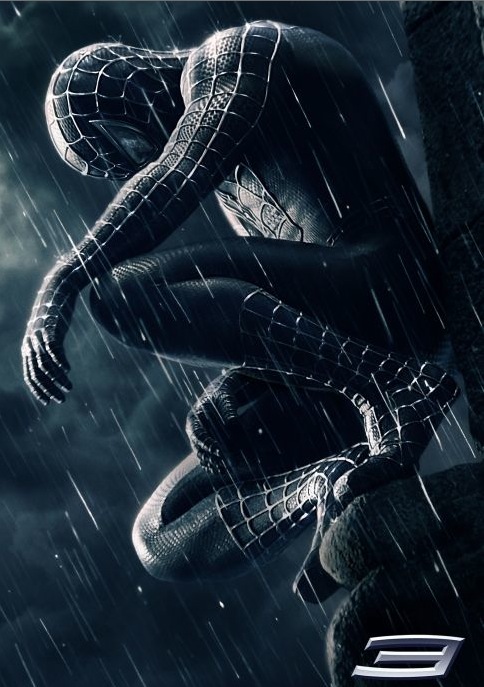
The picture above is taken from a teaser poster that's been around for a few months. But in the actual film, Spider-Man 3, the camera shot is wider to reveal our hero sitting on a steeple with a cross on top. If I can be so bold, Spider-Man 3 is the most Christian movie I've seen this year. No, I don't mean that there's a Billy-Graham-call-to-walk-the-aisle at the end. However, the movie includes a number of explicitly Christian themes such as forgiveness, loyalty, redemption, and responsibility for one's actions.
There was only one good scene in Superman III, well over two decades ago. In that movie, Superman affected by an artificially created Kryptonite turns bad and goes around performing misdeeds instead of good deeds. All of this culminates in the visualized psychological battle between Superman and Clark Kent as the hero wrestles to overcome the evil inside of him. In Spider-Man 3, Peter Parker's dark side emerges after he's affected by an alien presence that represents itself as a black costume. The suit affects Spider-Man's personality, and results in the brooding pose seen above under the shadow of a cross. A conversion of sorts takes places in which the "sinful" self is defeated. In fact, a metaphorical "baptism" scene immediately follows reminiscent of similar imagery effected by the rainstorm that follows the escape from prison in Shawshank Redemption. Meanwhile, this is countered by another character's visit to the same church. He comes seeking help, but with the wrong motives. This results in his "damnation" because his desires are evil.
I haven't read a Spider-Man comic book in almost two decades, but I remember them well. Spidey was the kind of hero that one could relate to. Although he was certainly heroic and had amazing abilities, in his private life, he had trouble getting dates, he got picked on, he was always struggling to make ends meet. I remember the issue where he had the flu but he still had to defeat the Lizard, nevertheless. And on the virtuous side of things, he sometimes made mistakes that had devastating consequences. This is certainly played out in not only the comics but also in the first movie, when through his own selfishness and perhaps indifference, his choice to not stop a criminal leads to his uncle's death. We find out in this movie that we didn't get the full picture about that event after all (whether that was planned from the beginning I have no idea, but I doubt it). In this movie, Peter has a choice to make: he can either hold his bitterness inside and seek revenge for his uncle, or he can choose to put feelings of vengeance aside and forgive his uncle's killer. The end result is quite moving.
And so is the message at the end of the film. The opening night for Spider-Man 3 set box office records, and I'm not surprised. I saw a 9:30 PM showing on Friday night at the Shelbyville movie theater and it was packed, mostly with audience members much younger than myself. There's a voiceover at the end for which I'd love to have the exact words to print here, but I haven't found them yet. But the words spoke of the responsibility that we have for our choices and the call for us to make the right choice when faced with a decision. I couldn't think of a better message to leave with the young audience with whom I shared the movie on Friday night.
If you've seen enough Sam Raimi movies, you begin to note his style. Raimi tells a story by focusing on a character's eyes. This is why Spider-Man never has an emotional scene with his mask fully on. Either he is out of costume as Peter Parker, or the mask is partially torn up or even removed. Raimi also has a quirky sense of humor evidenced in his films such as The Quick and the Dead and Army of Darkness. Raimi's quirkiness is quite over the top in Spider-Man 3, especially as Peter Parker undergoes the transformation to his darker self. Although the reality is serious, it is played out in lighter tones that causes quite a few laughs along the way. I mean, it's hard for the goody-two-shoes to be a bad guy, isn't it?
Raimi has already announced that there will be three more Spider-Man movies, although he has not yet declared if he will remain at the helm. It wouldn't surprise me if he departs along with the other principle actors in the cast. And although we'll continue to have Spider-Man movies, these three from Raimi and staring Toby Maguire and Kirsten Dunst will surely be the classic treatment. Unlike the Batman movies of the nineties, these three Spider-Man movies are interconnected and form a tight arching trilogy. The story is told through all three with elements introduced in the first movie not resolved until the third.
The negative reviews for this movie are predictable: it's too long and too preachy. I say, decide for yourself; I highly recommend this movie. Again, the movie is replete with Christian themes, and would serve as a great springboard for discussion along the lines I mentioned in the first paragraph. It's longer than the previous installments clocking in at two hours and twenty minutes. There's very little language and no sexual situations. However, it's rated PG-13 for its violent content so parents should think twice before taking small children to see it.
Kathy's Right to the Point Movie Reviews
The Illusionist
The Prestige
Borat
Norbit
Ghost Rider
And later next week, check back here for my review of 300, which I saw last night.
The Problem with Borat
Whatever.
Last night Kathy and I rented Borat. The advertisements make it look quite funny and very clever. How will American people react to a "foreigner" who is culturally and socially naive to our assumed social norms? Now we should have known better. We knew that it was Rated R, but we thought.... well, I don't know what we thought. We just should have known better. We watched quite more than we should have and finally stopped the movie after viewing part of what had to have been the crudest scene I've ever seen in a mainstream movie (and, yes, Borat would have to be considered mainstream with the backing of 20th Century Fox).
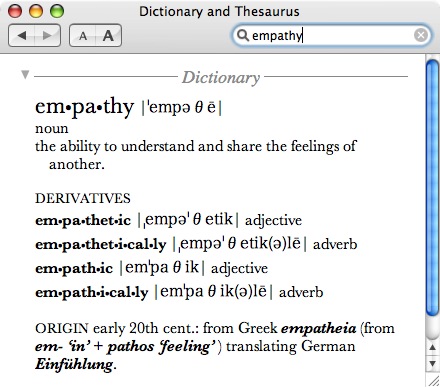
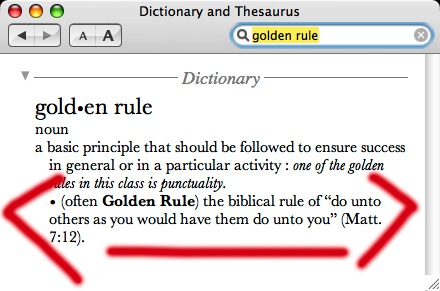
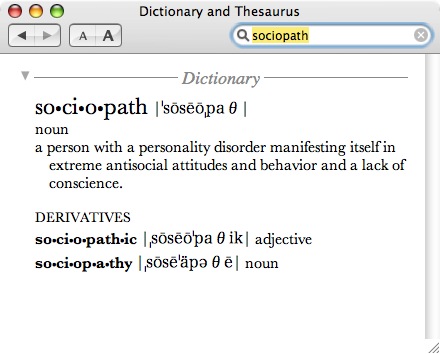
Granted, Cohen is a master at bringing out America's deep-rooted prejudices that sadly still exist among some individuals in our country. But not all of his targets reflect this, and frankly I feel sorry for them. Maybe it's easier to laugh at a racist making an idiot out of himself, but does that make it right? And even though we in the audience are in on the gag, are Cohen's feigned racist statements really fodder for comedic material? Do we go ahead and laugh at racism and prejudice if we know the person saying it doesn't really mean it? Does that make it any less of an issue?
One particular scene involved Borat at a very proper, Southern, dinner party. This scene has been shown on television quite a bit. What I didn't know until viewing part of the movie is that the gentleman sitting at the right end of the table is a minister. Even after Borat rudely insults his wife, he acts annoyed, but charitable (much more so than I imagine I would have). The final straw for him is when the prostitute arrives to the party whom Borat has invited. Oh, I know that some might criticize and remind us that Jesus was not afraid to socialize with "sinners" of all varieties. But Jesus, although often set up to look bad by his enemies, never found himself in no win situations. At the dinner party, no one was going to win anything other than Cohen who was orchestrating the entire event. In reality, I was impressed that the minister never said an unkind word. He simply stood up and said something to the effect of "It was nice to meet you, but I must be excused now."
After watching a few minutes more, Kathy and I came to the same conclusion.
Nonsense for Today

Every time I watch Law & Order: Criminal Intent, I think to myself that Eric Bogosian, who plays Captain Danny Ross, looks like a character who would have been somebody's uncle on the Brady Bunch 35 years ago.
His curly perm and even his voice seem to have time warped him straight from an early seventies sitcom.
Okay... back to more serious topics...
Superman II: The Richard Donner Cut
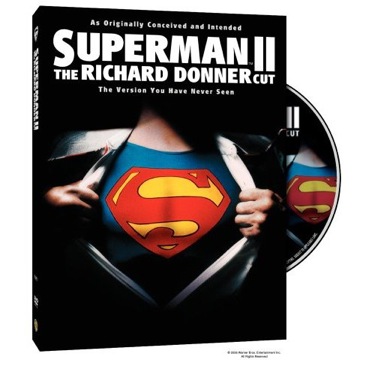
Therefore you may or may not know that the Superman II shown in the theaters and released on various video incarnations over the years was not quite the original vision. Mario Puzo of Godfather fame had penned the screenplays of the first two Superman movies staring Christopher Reeve. As the first movie was being made, the sets were used to film scenes that would appear in the sequel as well. This saved time and money and would also guarantee a quick sequel on what most assumed would be an instant moneymaker. According to director Richard Donner, he had about 80% of the second film completed when he had to devote all of his time to finish up the first movie in time for a 1978 Christmas release. During this time, Donner fell into creative differences with producers Alexander and Ilya Salkind and was fired. His name appeared as director for the first movie, but director Richard Lester received credit for the second movie. Some scenes had to be reshot in order for Lester to take credit, and he also completed the remaining 20% or so never completed by Donner. In the end, none of us knew it at the time, but we didn't receive a Superman II exactly the way Donner envisioned it. And perhaps that's why I've always felt that there is a disparity of feeling between the first and second movie. Defenders of Donner say that he respected the mythology while Lester did not, but there may be some amount of bias in play with such accusations, too.
Regardless an internet movement began around 2004 for Warner Bros. to produce a version of Superman II more along the lines with Donner's original vision. Evidently, all of the scenes directed by Donner that did not make it into the theatrical release still existed. The fulfillment of that project is the Richard Donner Cut of Superman II released in 2006 and viewed by myself last night.
Lester's and Donner's movies certainly are different, but probably not profoundly so. It's a mix. There's good elements in both. Plus neither version stands as a work totally directed by either individual. There is the work of Richard Donner that remains in Lester's version, and those creating the new Donner cut had no choice but to include some material directed by Lester because Donner never actually finished his version. If you would care to get a sense of the visual and directorial differences of the two men, I would refer you to the IMDB trivia page for the theatrical release of Superman II (look for the paragraph that begins "Director 'Richard Lester' was not sympathetic to the epic look..."). See also the Wikipedia page for this version.
And while I don't want to give away everything in the new cut, a number of interesting differences can be pointed out. First, the opening is quite different and closely ties in the events of the first movie with the sequel. The events at the end of the first movie had direct impact on the release of the Phantom Zone villains, thus demonstrating that the sequel takes place only days after the first movie. The scene where Lois climbs the Eiffel Tower in Lester's version is completely absent from Donner's cut. But in its place is a wonderful scene where Lois jumps out of a window in an attempt to prove that Clark Kent is Superman. Why this was not used in the theatrical release I have no idea.
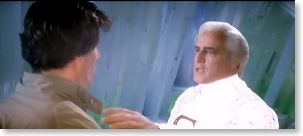
As I mentioned in my review of Superman Returns, I felt that Superman's actions in the second movie--to give up his abilities for the love of Lois Lane--was an incredibly selfish and unheroic decision. This is one reason that in general, I don't like the storyline of the sequel. Well, I felt much better after seeing Brando's scenes restored because in this version Jor-El berates his son over this very issue, leading to an "I told you so" moment when a powerless Man of Steel comes crawling back (literally) later in an attempt to retrieve his powers. I was right to believe that Superman's actions were selfish, and even his father agrees with me! In general these scenes with Brando create a much stronger emphasis on the relationship between father and son, something that is totally lost in the Lester version. We also get more of the "Son becomes the father; father becomes the son" dialogue that is repeated in Bryan Singer's Superman Returns. But here it is referred to as a Kryptonian prophecy.
The Donner cut includes a number of extended sequences among the actors including scenes with Gene Hackman as Lex Luthor in prison with his sidekick, Otis, played by Ned Beatty. Extended scenes with Valerie Perrine as Eve Teschmacher hint for the first time that there is some kind of actual relationship between her and Luthor. This was always an assumption of course, but until Donner's cut we never actually heard anything about it.
One mildly odd sequence involves a whole scene of spliced together screen tests between Christopher Reeve and Margot Kidder. In the Lester version, Lois proves that Clark is Superman when she sees him stick his hand in fire and not get burned. In the Donner version, she actually fires a pistol at Clark. This scene was used for screen tests between Reeve and Kidder and can be found in the special features sections of certain DVD's of the first movie. Evidently, this was one of the scenes that Donner wanted to use in his version, but never got around to actually filming before he was taken off the project. Although the alternate scene is interesting, the segments of it are spliced together from what are obviously different periods, and in the end distract from the story line. Reeve's hair length and glasses size changes throughout the scene, and this was obviously before he got into the weight room and bulked up a good bit for the role.
One final difference is the ending of the movie, and there's no way for me to describe it without giving it away. You'll remember in the Lester version that Clark kisses Lois and makes her "forget" his secret identity. I've always thought that was a bit hokey, but the Donner ending is much worse. According to the special features on the disc, Donner felt that Clark Kent should never kiss Lois; only Superman should kiss her. Therefore, they resort back to the same horrible solution of the first Superman movie in which he flies faster than the speed of light backwards around the earth, somehow reversing time. Now it's one thing in the first movie when he just backs things up a few minutes and somehow saves Lois from dying (never quite understood how that happened though since he didn't stop the missile--oh well). But this time, it leave the viewer with an entire story (the entire events in the movie) that never happened; although it doesn't explain how he keeps the Phantom Zone villains from being released. Whether or not Donner actually planned to do this the first go round, I honestly have no idea. But I can't imagine making two movies back to back with the same ending. Frankly, it left a very unsatisfying feeling as if I had watched one long dream sequence.
Finally, the disc contains a relatively short behind the scenes look at the recreation of Donner's original vision. Merely tracking down all of the alternative film edits must have been a Herculean task. The comments made by Donner himself seem to reveal that he was deeply hurt by being cut out of the second picture after he had already put so much work into it and had completed the first film. He comments that he felt that he could have made a whole series of quality films with Reeve and Kidder had he been allowed to stay with the series.
I suppose you would have to be somewhat of a fan already to even want to view this version of the film. But regardless, there's really something significant here. I can't think of any time in the history of film that something like this has been attempted--to piece together forgotten film edits--not to just expand a film as often is done in so-called "director's cuts"--but to create an alternative version altogether and restore a film to an earlier intended vision. There are a few minor shots that had to be created new such as a scene of Clark Kent yelling at Lois from a window of the daily planet. It's not hard to tell that it's not actually Christopher Reeve. And according to the behind the scenes commentary, over 200 new special effects were created for this cut, and it was noted that it was a challenge to keep them downgraded to match the technology of a film made almost three decades ago.
I watched this movie on HD DVD. I've found that although newer movies look spectacular in high def versions, some of these older films are a mixed bag. There are some scenes in this movie that look extraordinarily good, but some look quite grainy and the difference in quality seen on a normal DVD vs a high def disc may very well be negligible. Nevertheless, Superman II: The Richard Donner Cut is available on standard DVD, HD DVD and Blu-Ray Disc. If you're a fan or at least remember the theatrical release, you might be interested to see this remix.
A Pre-Movie Conversation
Kathy: I want to see that. I was on the swim team in junior high.
Rick: I didn't know that.
Kathy: Yes, I even won an 11th place ribbon.
Rick: 11th place?
Kathy: There were twelve lanes.
Rick: I didn't know they made 11th place ribbons.
Kathy: It's kind of off-purple.
The Fountain
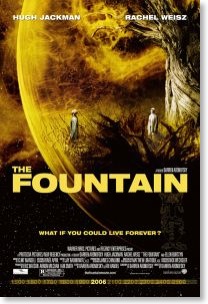
I was intrigued by the implied promises made in the trailer for this movie back in the summer. The trailer included references to the biblical tree of life, and we saw the principal actors, Hugh Jackman and Rachel Weisz in three time periods: the 16th Century, modern day, and supposedly the 26th century. The viewer might assume that the principal actors--or at least Jackman--had eaten of the Tree of Life and was living an extended life through the next millennium. Not so.
I try very hard in my reviews not to give away major spoilers or surprise plot points, but there's no way to talk about my frustration with this movie without doing so.
Major spoilers below.
The movie opens with the words of Genesis 3:24: "So he drove out the man; and he placed at the east of the garden of Eden Cherubims, and a flaming sword which turned every way, to keep the way of the tree of life." The first scene is of a Spanish conquistador, Tomas, played by Jackman in the Mayan jungles looking for the Tree of Life--a mission commissioned by Queen Isabel, played by Weisz. The movie is not told in a linear fashion, but will continue to weave scenes from all three time periods throughout the story. In the present time, Jackman plays Tommy Creo whose wife Izzy is dying from a brain tumor. Is this the same couple we saw from the 16th century? Evidently not, although their names have connections. And then we see Jackman again in what looks like a futuristic setting where he is in a bubble (yeah, a bubble) with the tree of life floating through space toward the Xibalba nebula, which is also supposed to be the Mayan underworld. In these scenes he is visited by visions of Izzy telling him to "finish it." Oh, and he practices yoga and hugs the tree a lot (literally).
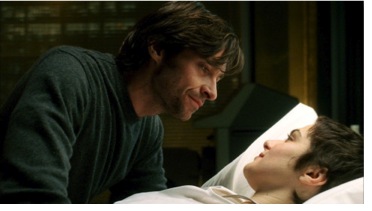
The movie is frustrating because there's too much left for the viewer to decide. I suppose Aronofsky envisions this movie to be some kind of work open to interpretation, but all that leaves is a film that is extremely unsatisfying. I normally avoid reading reviews before I write my own because I don't want to subconsciously borrow from others' opinions. But in this case, I've read about a dozen different takes on the movie because I came home with more questions than I had answers. Incidentally, the best and most complete treatment I've seen of the movie is its article on the Wikipedia.
And after reading all the reviews, all I can determine is that no one else knows what the heck is going on either. One reviewer suggested that the characters in the three eras are reincarnations of the same people. I wonder if he saw the same movie I did? Obviously it's not reincarnation because the 16th century segments are a story written by Izzy. Whether or not the scenes in the bubble take place in the 26th century is anyone's guess because the movie never tells us that. It might as well be a vision of Tommy Creo. Obviously it's the same character from the present time because he has continued on his self-tattoing project that he started during the present day scenes. Plus, there is no futuristic version of Izzy. It's the present day version of Weisz that appears in the bubble from time to time to Jackman's character.
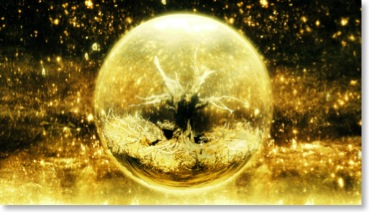
Supposedly, Aronofsky started planning The Fountain after seeing The Matrix in 1999 realizing that it was a genre changing movie like Star Wars and 2001: A Space Odyssey had been before it. He wondered how science fiction would be written after The Matrix and The Fountain is evidently his answer. I don't really consider this to be a science fiction movie although I realize the genre is pretty wide. I've sat in on some film festivals before and I've learned that if a filmmaker introduces his work by saying that the movie is experimental, that's usually code for "it won't make sense to anyone."
My concern is that the few who do go see this based on the trailers will be disappointed. I haven't picked up on any buzz surrounding this movie which, after seeing it, doesn't surprise me. Kathy will tell you it's definitely not a date movie, so be warned. Today both Kathy and I are off work. We slept in late and turned on the television while we ate breakfast. Kathy is the channel flipper in our household (I usually don't care), and she stopped on The View because Jackman and Weisz were both guests promoting this movie. The only scene discussed in the conversation was the "bathtub love scene" which was heavily cut to take the original R-rating to a PG-13. My next statement is not meant to be sexist, but only a acknowledgment that the primary audience of The View is female. After the plug for the movie on today's show, undoubtedly a great number of women will want to see this movie, thinking that it's a love story. I suppose it is a love story at some level, but The Fountain is not going to be what the audience of The View will expect.
I'm sure that some folks will appreciate Aronofsky's movie, and I suppose that some will say they do just to be seen as enlightened. But I can't say that I'm one of them. I'll be glad to watch The Matrix again in the future, but not The Fountain.
Casino Royale: A Reflective Review and Some Thoughts on the James Bond Mythos
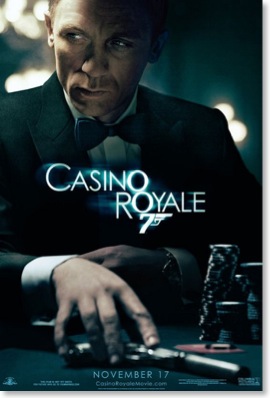
Well, times have changed, and James Bond has certainly changed over the years as well. Everyone seems to compare each actor who plays James Bond to Sean Connery. Well, I have a confession to make. I will always be favorable toward Roger Moore. Before you start throwing rotten fruit at me, please realize that Moore simply was Bond when I started going to see the movies as a kid. I like Connery as Bond, but when I think of Bond, I think of Moore. After all of these years of simply keeping that thought to myself, finally I've been echoed by someone of my generation in print. Joshua Rich, in the November 24 issue of Entertainment Weekly put it like this (slightly edited by me):
Now about Roger Moore. The Queen knighted the actor in 2003, yet many still can't forgive him for replacing Sean Connery and turning Bond into a smirking wise***. Well, you know what? Get over it. For anybody born between, say, 1970 and 1990, Moore, not Connery is the guy with the Walther PPK. And looking back past Timothy Dalton and The World Is Not Enough, he did just fine.
(Incidentally, I was born in 1967.) Of course, I'll admit that some of Moore's Bond movies are stinkers, especially Moonraker.
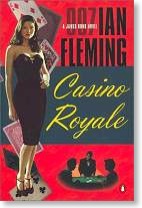
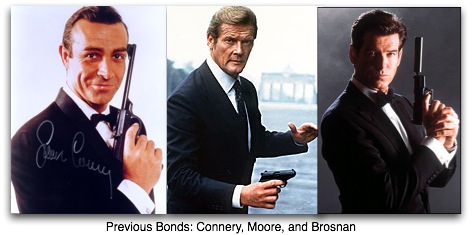
This is the first Bond film that is self-aware, that has lost its innocence and the simplicity of its world view, and has some understanding of the absurdity and sadness of its hero.
One crucial and revealing scene takes place on a Caribbean beach, where 007 is enjoying an erotic interlude between scenes of death-defying mayhem. His companion is the lovely Natalya Simonova (Izabella Scorupco), a Russian computer programmer who has joined his quest to save the world, etc. But instead of sexy small-talk, she asks Bond: "How can you act like this? How can you be so cold?" And Bond replies not with a sophisticated wisecrack but with, "It's what keeps me alive." In the earlier Bond adventures, no woman would have asked such a question, and 007 certainly would not have provided such an answer.
More evidence of Bond's loss of innocence: He is now aware that his history is repeating itself. Although all the Bond films have followed a story pattern so rigid that 007 could have predicted the next scene just by looking at his watch, there has always been the fiction that each adventure is more or less unique. Bond has never used an obvious line like, "Do you realize you're no less than the 12th megalomaniacal madman striving for world domination that I've met?" There is always one absolutely obligatory scene: Bond has been captured by the madman, who needs only to kill him. But he always talks first. Explains his plans for world domination. Boasts.
Preens. Doesn't realize that his mistress will become attracted to Bond. This scene is so inevitable, indeed, that it helped give rise to the definition of the Talking Killer in Ebert's Little Movie Glossary.
In "GoldenEye," the unthinkable happens. Both Bond and the madman apparently have read the Glossary, and can no longer act unself-consciously. Bond has fallen into the clutches of an evil genius who plans to rule Earth from cyberspace, via a powerful communications satellite. He narrows his eyes and says: "How shall we kill you?" And Bond replies: "What - no small talk? No chit-chat? That's the problem with the world these days - no one takes the time to conduct the proper interrogation." Indeed. Even Bond himself has changed. As played by Pierce Brosnan, the fifth 007, he is somehow more sensitive, more vulnerable, more psychologically complete, than the Bonds played by Sean Connery, George Lazenby, Roger Moore and Timothy Dalton. They were all, in their various styles, cold and dispassionate. Brosnan's Bond looks at home in the casinos of Monte Carlo, but he's more knowing, more aware of relationships. I am not sure this is a good thing. Agent 007 should to some degree not be in on the joke. He should certainly never have to listen to dialogue such as the following, from Agent 006: "The vodka martinis do silence the screams of all the men you've killed. And all those women you failed to protect." Perhaps our popular conception of maleness has changed so much that James Bond can no longer exist in the old way. In "GoldenEye," we get a hybrid, a modern Bond grafted onto the formula.
Unfortunately, by Die Another Day, Brosnan's fourth Bond film, the series had slipped back into it's earlier routine of gadgets and girls, although some of the darker side of being a secret agent was still retained in Bond's capture and subsequent torture by the North Koreans. That element of the last movie felt like something that Fleming would have written. Was it From Russian with Love or You Only Live Twice (the books, not the movies) where the Russians capture Bond, brainwash him and attempt to send him back as a double agent? I don't remember.
But if Brosnan's Bond was a step toward's Bond's loss of innoccence, Daniel Craig's incarnation takes it to the next level. I wish Andrew was still around to write a review on Casino Royale. I speculated recently with his wife, Leila, who has gone to see it in his honor, about whether or not he would have liked it. Andrew and I were often polar opposites in our tastes when it came to movies, and we had many spirited debates on the merits (or lack thereof) of various films. But now, having seen the movie myself, I do believe Andrew would have liked Casino Royale because of its iconoclastic spirit toward the movies that have come before it.
Personally, I wish that Pierce Brosnan could have played Bond at least one more time. Brosnan himself has said that the decision to dump him was a tremendous surprise, calling it a "blow to the gut." But there's no loyalty in the movie business. If you don't believe me, just ask Peter Jackson who has recently been dumped by New Line Cinema as the director for the Lord of the Rings prequel, The Hobbit.
Minor Spoilers Below...
Just as Casino Royale was the first James Bond novel written by Ian Fleming, this movie attempts to restart the franchise by giving us a Bond at the beginning of his career. In fact, in the earliest pre-looking down the barrel of a gun intro scene, Bond is not even a 00 (pronounced double-oh) agent yet. We get to see him "earn those 0's," so to speak. As I mentioned in the paragraph above, this movie is quite the iconoclast of the previous installments in the series, and seems to go out of its way not just to distance itself from the gadgets and camp of the earlier movies, but to even ridicule them at times. Here are some examples of the new direction taken in this Bond film:
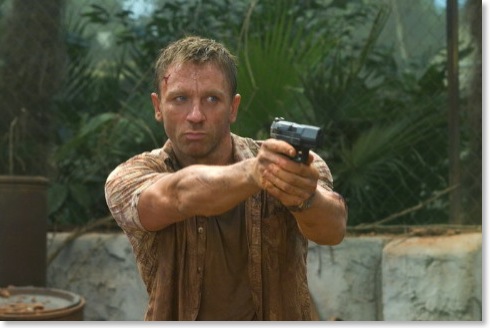
- We've rarely seen a Bond get so beat up and dirty as Daniel Craig. Brosnan may have come close (I again think of the North Korean capture in the last movie). After fighting off killers during a break from the card table, the main villain Le Chiffre notices that Bond has changed his shirt (the previous one got torn and bloody). Roger Moore et al. could always engage in any skirmish without nary a wrinkle to the tuxedo coat.
- Related to the above, we see Bond with cuts on his face (why there aren't bruises I have no idea) and tending his wounds. He even washes blood from his hands which may have figurative aspects. Again, this is the dirty side of the spy business that we never saw from Connery, Moore, or Brosnan.
- When asked by a bartender whether he wants his martini shaken or stirred, Bond, looking annoyed replies, "Do I look like I give a damn?"
- When Bond has one adversary cornered early in the movie, rather than let him talk on and on (see Ebert's "Talking Killer" above), Bond simply shoots him and is done with it.
- There are no women whose names count as double entendres. The main Bond girl in this movie is named Vesper Lynd (Eva Green) like the character in the book, and the only nod to previous movies is Bond's suggestion that Lynd's undercover alias should be "Stephanie Broadchest" of which she does not approve.
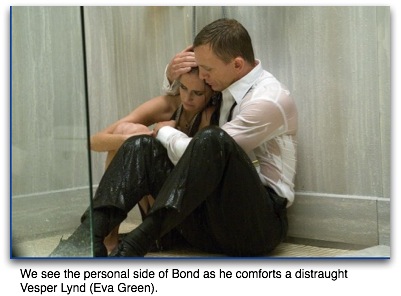
- Although Bond has a few clever lines in this movie, it's not near the level of punnery in previous installments. Fancy comebacks during torture are a defense mechanism, not the sign of being a wiseacre.
- There are no futuristic "spy" gadgets, but using current technology means lots of opportunities for product placement. Sony was everywhere with cell phones and laptops. There was such a large Sony presence in this movie (Sony now owns MGM which owns United Artists which owns the rights to the James Bond movies) that I half-expected to see Bond playing a new PS3.
- No gadgets means no "Q," who had most recently been played by John Cleese. However, there is a crack tech team for computer support that we see a few times. I suppose this is more realistic, but I'll miss "Q," especially the Cleese incarnation.
- Not only is there no Q, there's no Miss Moneypenny, ever dreamy-eyed over Bond. However, there is a reference to money and penny in the same scene when Bond first meets Lynd so at first audiences may mistake Lynd for the Moneypenney character.
I first read Casino Royale sometime in the mid-to-late eighties, and there were only two or three things I remembered for certain about the book. A buddy of mine saw the movie a few days before I did, so I asked him--"Did they include the torture scene?" If you've seen the movie, yes that was in the book--surprising for something originally written in 1953. Another thing I remember from the Fleming version was the card game at the center of the story. In the book they played baccarat, but I suppose to create suspense that a modern audience could follow, the game has been updated to Texas Hold 'Em Poker. Ugh.
Although the book's storyline is significantly altered from its original cold war context, the movie follows a good bit of the basic premise of the original story. This is quite a departure from many of the Bond movies that have taken names from Fleming's original works. Essentially, the story revolves around a high stakes card came hosted by a villain named Le Chiffre who is trying to raise a large amount of money back that he had inadvertently lost. Bond is sent in by MI6 because as explained in the movie, he has the best reputation as a card player among the agents. There's lots of action before, during, and after the card game, of course. In fact, at over 144 minutes, this is actually the longest Bond movie in the history of the series.
Although, we do see a more personal side of Bond, and perhaps strong clues as to why he is the way he is, Daniel Craig plays a much darker, colder spy than what most movie Bond fans will be used to. That doesn't mean that Craig's version won't be successful. This Bond is more like the character in the Bourne Identity/Supremacy movies or even the Transporter series with Jason Statham than the suave spy we've watched over the years. In spite of Bond's cold heart, and the ability to kill on command, Daniel Craig plays the character in more than one dimension; it just takes a while to get there. By the end of the movie, I began to actually like this Bond, and I felt sympathy for him. I don't know if I ever felt sympathy for the previous Bonds. But Daniel Craig's bond, if he is a hero, is a tragic one.
Kathy really liked this movie because she said it was more realistic--it depicted a more honest look at what a spy's life might be like. In her own review, she writes:
This Bond is rougher than the James Bonds we've come to know over the past 40 years in films. Daniel Craig plays the lethal agent with the perfect blend of toughness and charm. He's a real man with real scars. The scrapes he finds himself in are much more believable than the sometimes laughable escapades of Roger Moore and Pierce Brosnan.
I admit that the former Bonds played by Connery, Moore, Lazenby, Dalton, and Brosnan with their wisecracks and gadgets are more fantasy and escape than the current version with Daniel Craig. But that's why I liked the James Bond of the movies. When we say that all men want to be Bond, it was said in relation to the earlier incarnations. Daniel Craig does indeed make a good Bond if you like Fleming's original, but I don't want to be this one.
Bible Study with the Usual Suspects
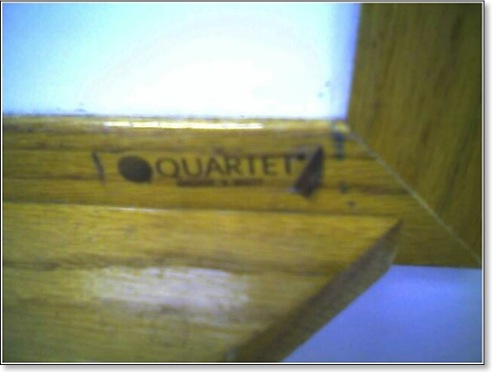
I finally remembered yesterday to take a picture of the whiteboard in one of our Sunday School classrooms. Pardon the poor quality, but it is the best my Treo can do.
This won't make any sense to you unless you've seen the movie Usual Suspects, but I was startled a few weeks ago to notice the sticker on one of our whiteboards that read "Quartet/Skokie, Illinois." I had no idea it was a real company.
And I tell you, that Verbal Kint fellow thinks he has to answer every question during our Bible study...
Infernal Affairs
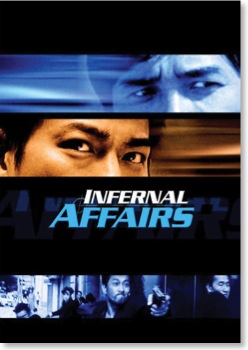
I first heard about The Departed around two years ago. It's a remake of a Hong Kong film called Infernal Affairs. Intrigued, I laid aside my usual trepidations and checked out the original, and was rather surprised that I "got" it, perhaps because rather than assuming the audience will understand its mindset, the movie takes the time to lay out the characters and motivations.
Eager to break up a notorious Hong Kong gang, two police officials work for years to place a cop mole in deep undercover. They are the only ones that know about their mole. The gang boss, wanting to beat the police, works for years to get a gang mole into the police department. He's the only one who knows about his mole. Eventually, each leader figures out they have a mole. Guess who each leader sends to sniff out the other mole?
It's a brilliant setup. When everything in your life is a lie, do you become a lie too? Can you stay true to yourself when you've been someone else for so long? Each mole has to deal with these issues, in addition to solving their problems, working for their bosses and covering their tracks. The cop mole's issues are played out with a little more weight--especially toward the end--but the gang mole's issues aren't sold short either. One of the most interesting things, in fact, is the conflict that he has about his lifestyle.
The film has some riveting set pieces. There's a drug raid standoff where you just can't figure out how the moles are informing their bosses, and the answers turn out to be ingenious. A confrontation in the police station where everyone suddenly figures out what is going on is played for maximum drama. The movie makes credible moves to raise the stakes, but also supplies emotional resonance to the characters--something you don't always see in Asian cinema.
Eventually though, the movie just can't go anywhere else. Something will have to give. The movie tries to cushion that fall, but it's still a rough landing. The film further suffers from the traditional Asian postscript, where things are told rather then shown. But for three-fourths of it's time, Infernal Affairs is remarkably good, and I give it a high recommendation. As to The Departed, Scorcese has always had an interest in this type of material, and he's one of the few people I believe could improve on the original. So there's a lot to be hopeful for.
Andrew Wells can be reached at arwell012002@yahoo.com.
Retro Review: The Wicker Man (1973--the original version)
A Guest Retrospective by Andrew Wells
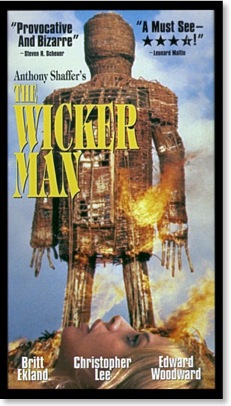
Here's the scenario of the original movie: A call goes out to a police district headquarters in rural England. A little girl has gone missing from a small village on a remote isle. Sergeant Howie (Edward Woodward) travels by seaplane to investigate the disappearance. Although he comes off as a bit rigid in the portrayal, the movie goes to great length for the viewer to understand that Howie is a devout, practicing Christian (most likely Catholic) who draws strength from his faith. He is scheduled to be married in a week, but feels compelled by duty to go out to investigate the girl's disappearance.
The island's main employer and ruler is Lord Summerisle (Christopher Lee, who has claimed this as his favorite role). In order to increase production and keep the workers happy, the rulers decided to long ago give up practicing Christianity and instead pursue paganism.
This is where The Wicker Man really gets macabre, because this is not your average Hollywood paganism (like witchcraft). The movie takes considerable time to explore a society that has evolved without Christian teaching. What would people act like? What would their morals be? How would their values appear in their surroundings? The movie comes up with some distrurbing ideas. The image I find hardest to shake is a group of children celebrating recess by dancing around a maypole and chanting hymns to an earth goddess like they were nursery rhymes.
Howie not only now has to find the missing girl, but he must do so in surroundings that are completely different to his beliefs. This leads to all sorts of temptations for Howie, much of it sexual. And this is where I want to be absolutely clear to the reader: Even though everything is given a proper context, and is by no means gratuitous, there is a fair amount of nudity in this movie, especially when Howie first arrives in the village. Sensitive viewers may want to skip the scene of Howie's night at the inn altogether. After that, the movie settles down somewhat, though the discussion is still frank.
Yet the movie remains, quite amazingly, fair-balanced in discussing Christianity and paganism. Though he has temptations, Howie proves to be quite strong and formidable in his faith. The scenes where he calls on God for strength are genuine moments. His alarm at the situation he is in does not keep him from doing his work or standing up for God. The pagan village, though shown to be peaceful and kind, is not glamorized as uninhibited and free-spirited. Quite the opposite, actually. Strenghts and weaknesses of both systems are pointed out and examined.
Why would anyone even TRY a remake? It is impossible to discuss this movie's ideas in the current culture. Religious belief of any kind is a powderkeg in the media right now. And to make a movie that rationally examines these issues, instead of pushing emotional buttons and taking shortcuts? Is that even possible? Would people be willing to take the time to listen? Would dialogue open up? Sadly, I doubt it.
So it makes sense that the new Wicker Man would most likely be a straight-on horror remake. But the new movie won't be able to get that right either. The original ending is one of the all-time movie shockers, but what makes it shocking is not what happens, but why it happens--and that's all tied in to the issues the movie raises.
Because of the aforementioned nudity and that shocking finale, I'm not going to endorse this movie. But if you are looking for a movie that will make you think, The Wicker Man is a good one. If nothing else, you'll wish you could find out what happens in the village next spring.
Andrew Wells may be contacted at arwell012002@yahoo.com.
For further investigation:
- The Wicker Man (1973): IMDB Page
- The Wicker Man (2006): IMDB Page
- From Wikipedia: The Wicker Man 1973 movie entry and "Wicker Man" general entry
The Wicker Man
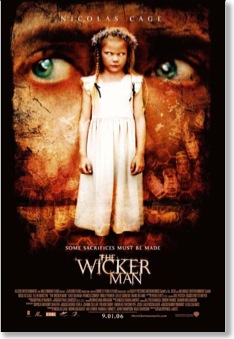
Well, I wouldn't want to call The Wicker Man a bad movie--parts of it are entertaining--but it's difficult to call it a good movie. Maybe in three or four months, when it is released on DVD, and you go to the video store for that movie you've been dying to see, and you discover that all the copies are checked out--well, then you could rent The Wicker Man. However, as the credits began to roll today, Kathy, thinking in terms of our limited entertainment budget, asked, "How much did we pay to see this?"
The Wicker Man is a remake of another film by the same name released in 1973. Evidently fans of the first film are upset over changes in the remake. Me? I'm not upset (probably because I've never seen the original). I think it's fine for movie remakes to change things. Otherwise I might as well go rent the original. I mean really, would you rather see the original Omen with Gregory Peck and Lee Remick or the nearly identical remake released earlier this year? Considering the Omen remake made very little money, I think most people will agree with me. Of course that's not to say that changes in the story will make much money for the new Wicker Man. There are too many other problems at work here.
In the new version, Nicolas Cage plays a highway patrol officer involved in a mysterious roadside accident in which two of the victims--a mother and daughter--go missing. Following the accident, Cage's character, Edward Malus, gets a letter from a long lost girlfriend who is desperate for his help in finding her missing daughter. In the photograph she sends, the little girl has a striking resemblance to the girl involved in the highway accident. Malus travels to a privately owned island where his old girlfriend lives, and he finds an entire community of people voluntarily cut off from the rest of society. Moreover, in this community, women run everything. Men are second class citizens who don't get to go to school, have to do all the hard work, and seem to be a much smaller percentage of the population. All the women are "Sister Something": Sister Willow, Sister Rose, Sister Thorn, Sister Honey, Sister Beech, Sister Violet, etc. The only Sister I didn't see was Sister Soluja (sorry, I know that was bad). As the story progresses, Malus finds himself wrapped up in a very complex deception going back much further than he he initially realizes. I really don't want to tell you much more than this because to do so would spoil the story if that other movie is already rented out at the video store and you decide to get this one. I will give this much away, though: contrary to the misleading trailers, there is absolutely nothing supernatural in this story. Of course, that doesn't make it believable.
The movie is simply flawed in multiple places. Overall, I really like Nicolas Cage as an actor, but this was not the role for him. He seemed not to know what to do with the character, sometimes playing Malus over the top, and sometimes so subdued that I thought maybe the villains had drugged him (which they had not). The pacing was usually too slow throughout the movie--a no-no for a thriller of any kind. And the dialogue was often so stilted that it was laughable like a love scene in a Star Wars prequel. The plot itself was extremely predictable, and Kathy and I had it pretty much figured out by the halfway point of the movie if not earlier. There are a few plot holes I could point out, but to do so would spoil the plot.
Again, parts of The Wicker Man were entertaining, and that owes to the abilities of Nicolas Cage who seemed to be doing the best he could do in a bad situation. The actor I'm really embarrassed for is Ellen Burstyn, especially regarding her character near the end of the movie. There's really not even any room to reflect on the movie's philosophy or draw moral implications. I will resist the temptation for a slippery slope analysis of feminism gone bad. If anything, the the only moral to the story that comes to mind is for the young men cruising for chicks: be careful who it is you pick up in a bar.
Snakes on a Plane
Want even more fun? There's a nifty page on the movie's website in which you can give a few personal details about your friend or loved one and he or she will receive a personalized message (by email or phone!) from Samuel L. Jackson. How cool is that?
Go to http://snakesonaplane.varitalk.com/
The Impossible Super X-Pirate Vice Code in the Water
Final thoughts on the movie summer (yes, I know it’s August, but in Hollywood, it’s over).
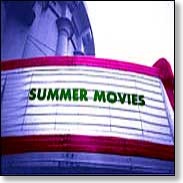
Best movie about Jesus Christ that didn’t mention Jesus Christ: Superman Returns. How messianic can you get?
Worst movie about Jesus Christ that did mention Jesus Christ: The DaVinci Code.
More things for Christians to worry about: While Code had much hoopla and made (relatively) little money in America, the movie has quietly racked up nearly $750 million dollars in other parts of the world.
Best way to kill Superman besides Kryptonite: Send Johnny Depp after him.
Second best way to kill Superman besides Kryptonite: Release an awesome trailer for the big movie event of next summer the day before your competition comes out, so that everybody will talk about you and not them.
Who’s laughing now: Everybody thought Fox Studios was being petty in racing to get X3 out because director Bryan Singer jumped ship to make Superman Returns. Yet they’ve made more money so far.
Can’t Get a Break Award: To Orlando Bloom, who will wind up starring in two of the most highly successful movie trilogies of all time, yet will probably never work again.
The book is probably better than the movie: Nobody seems to like M. Night Shyamalan’s Lady in the Water. What might be the final nail in the coffin is Michael Bamberger’s book The Man Who Heard Voices, which provides an account of how Shyamalan came up with the movie, how he broke up with Disney studios over it, and how he got it made. The book argues that Shyamalan may be the most distinct original voice since directors Alfred Hitchcock or Stanley Kubrick, but that he also may have the ego to match.
Lesson that Hollywood has finally learned: Despite the success of Miami Vice, movie makers seem to have realized that people don’t want to see movie adoptions of old TV shows anymore. At least till the next one comes out.
Lesson that Hollywood needs to learn: That special effects aren’t everything. It’s been 15 years since the true arrival of CGI in the movie Terminator 2: Judgment Day, and that movie still looks better than almost anything coming out now. Everybody is amazed at Pirates' Davy Jones character, but I’d rather have consistency than the latest breakthrough. And does any director under 30 know how to use effects to help tell a story, instead of using it as a crutch?
Last year’s junk is this year’s treasure: Ridley Scott’s Kingdom of Heaven was thoroughly trashed last year. But a director’s cut has come out this year, restoring over an hour of material. It supposedly makes all the difference in the world, turning a misunderstood movie into a great historical epic.
Christmas in July: We’ve got Spiderman 3, Pirates 3, The Bourne Ultimatum, Ocean’s 13, and a lot of other promising titles next summer. It’s the most excited I’ve been about movies in a long time.
Rick's Comment: C'mon, Andrew...I think I heard you say that same last sentence last summer.
Andrew Wells can be reached at arwell012002@yahoo.com.
Sympathy for the Devil? ABC Family's "The Fallen"
(Genesis 6:4, HCSB)
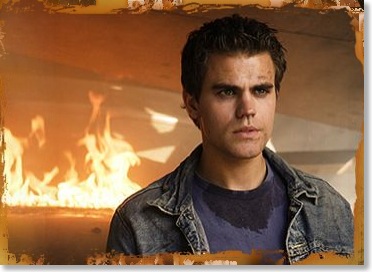
Out of curiosity, I watched a repeat of the premier of The Fallen tonight on the ABC Family Channel. Knowing that they were basing the show's mythology off the rather obscure verses at the beginning of Genesis 6, I admit I was mildly intrigued. Here, with multiple typos left as they are other than my note of them (= sic), is ABC Family's synopsis from the website for The Fallen:
All Aaron ever wanted was a normal life. Newly adopted by Lori and Tom Corbett, Aaron believes that he finally has a chance to be like everyone else. Hes [sic] good at school. Hes [sic] on the wrestling team, and Vilma, the preiitest girl in school, knows hes [sic] alive. But on his 18th birthday everything changes.
Suddenly, Aaron has unusual powers and a strange dream haunts him. A homeless man name [sic] Ezekiel, who claims to be a fallen angel, tells Aaron that he is a Nephilim, or half-angel/half-human. Zeke warns Aaron that the Powers, an army of killer angels, are are coming to destroy him. If Zeke is right, then Aaron has been swept into a centuries-old battle between the Powers and the Fallen, a group of angels banished from heaven. Aaron shakes off Zekes [sic] ravings but startling events lead him to think that maybe Zeke could be right. There is a mysterious man in a black [sic; word is missing, possibly "coat"?] following him. His newfound abilities seem to be getting stronger, and he sees signs in the most unlikely places. When Aaron comes face to face with his fate, he can no longer deny the truth.
Caught in a celestial war waged on Earth and haunted by an ancient prophesy [sic], Aaron is forced to make a difficult choice. His chances of being normal are gone, but is he The One?
There you have it, Frank Peretti meets Highlander. The two-hour premier (there are plans for six more hours in 2007) was fairly light popcorn stuff. It felt like a fantasy version of a coming-of-age story on an After-School Special of years gone by. I guess that's to be expected since the movie was based on the young adult novel of the same name by Tom Sniegoski. I have no idea how close the movie was to Sniegoski's original story having not read it, but I wasn't overly impressed with the cinematic interpretation.
The story itself felt very contrived and predictable. When Aaron's dog gets hit by a car right before a commercial break, it was pretty evident that this would be a reason to highlight Aaron's developing "angel powers." The high school drama is fairly typical. Aaron is the new guy at school and suddenly the most popular girl takes notice of him. He clashes with the jocks on the wrestling team of which he is a member--perhaps as an allusion to Jacob wrestling the angel in Gen 32?
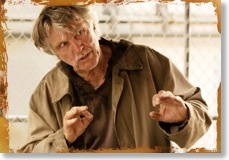
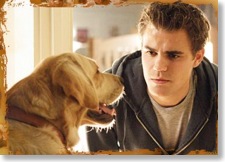
The mythology (I would really hate to call it theology) is one of the more bizarre aspects of The Fallen. Satan is never directly referenced except as "the powerful angel who led a rebellion in heaven." The story takes an extreme mythological interpretation of Genesis 6:1-4, to say that fallen angels have procreated with humans resulting in half angels/half human hybrids called the Nephilim. A hit squad of angels called the Powers has been commissioned by God to eliminate any of these half-breeds they can find. If the Angels have to torture and even kill normal humans in order to find the Nephilim, well, these are merely collateral damage. The battle near the end with what looked like flaming light sabres was quite laughable.
Thus you have a story that makes the angelic hosts look like the bad guys and sympathy is given to the fallen angels and especially their half human offspring who are killed in spite of their pleas for mercy. To make things even more bizarre, it seems there is an ancient prophecy (not a biblical prophecy, mind you) that says a Nephilim will arise who will stand in the gap between God and the fallen angels offering them redemption. Of course, Aaron (appropriate named after Moses' brother, the first high priest of Israel) turns out to be this prophesied Nephilim, also known as--shades of Highlander and the Matrix trilogy--The One.
Skerritt's character also has to deliver a politically correct line equating the God of the Bible with Allah, Shiva, and any other concept of God. Never mind the irreconcilable differences between these theologies. If there was any question as to whether the writers have a respectful view toward the Judeo-Christian tradition, this clearly demonstrates that they do not.
The Bible, of course, makes no mention of redemption regarding fallen angels. Perhaps their sin was even more egregious because of their intimate knowledge--even greater than ours--of the one true God. But that also makes us ask whether a mythological interpretation of Genesis 6:1-4 is the best one. Although the interpretation regarding relations between angels and humans is very old and has had many notable proponents, it seems to be contrary to other statements in the Bible including Jesus' remarks about angels: "For when they rise from the dead, they neither marry nor are given in marriage but are like angels in heaven" (Mark 12:25, HCSB). Plus the idea of angelic/human coupling seems a bit repugnant to me under any condition.
Another line of interpretation would identify the sons of God with "the godly line of Cain" while the daughters of men are said to be "the sinful line of Cain." This seems unsatisfying as well. A better solution is offered by Walter Kaiser in Hard Sayings of the Bible:
The preferable interpretation of this passage is the sociologically mixed view. "Sons of God" is an early, but typical, reference to the titularies for kings, nobles and aristocrats in the ancient Near Eastern setting. These power-hungry despots not only lusted after power but also were powerfully driven to become "men of a name" (or "men of renown"-- Gen 6:4).
In their thirst for recognition and reputation, they despotically usurped control of the states they governed as if they were accountable to no one but themselves. Thus they perverted the whole concept of the state and the provision that God had made for some immediate amelioration of earth’s injustices and inequities (Gen 6:5-6; see also Gen 10:8-12). They also became polygamous, taking and marrying "any of [the women] they chose" (Gen 6:2).
What evidence can be produced for the correctness of this view? There are five lines of evidence. (1) The ancient Aramaic Targums render "sons of God" as "sons of nobles" (Targums of Onkelos), and the Greek translation of Symmachus reads "the sons of the kings or lords." (2) The word gods (Hebrew elōhîm) is used in Scripture for men who served as magistrates or judges ("Then his master must take him before the judges [elōhîm]," Ex 21:6; see also Ex 22:8; Ps 82:1, 6). (3) Structurally, the account of the Cainite Lamech (Gen 4:19–24) and that of the "sons of God" in Genesis 6:1-4 are very much alike. In each there is the taking of wives, the bearing of children and the dynastic exploits. The former passage ends with a boast of judgment by Lamech, and the other ends with God’s decree of judgment. Lamech practiced bigamy (Gen 4:19), and he enforced his policies by using tyranny. The portraits are parallel and depict states of tyranny, corruption and polygamy. (4) Near Eastern discoveries have validated the pagan use of all sorts of gods' and goddesses' names in order to give more clout and prestige to the governments of Egypt and Mesopotamia--hence the title "sons of God."
The fifth and final line of evidence concerns the nep̄lîm/gibbôrîm of Genesis 6:4. The word nep̄lîm occurs only here and in Numbers 13:33, where it refers to the Anakim, who were people of great stature. The root meaning of the word nep̄lîm is "to fall." However in Genesis 6:4 the nep̄lîm are associated with the term gibbôrîm. The word gibbôrîm comes from gibbôrîm, meaning "a mighty man of valor, strength, wealth or power." Nimrod, in Genesis 10:8, was such a gibbôrîm. He also was clearly a king in the land of Shinar. Hence the meaning of nep̄lîm/gibbôrîm is not “giants,” but something more like "princes," "aristocrats" or "great men."
Genesis 6:1–4, therefore, is best understood as depicting ambitious, despotic and autocratic rulers seizing both women and power in an attempt to gain all the authority and notoriety they could from those within their reach. Their progeny were, not surprisingly, adversely affected, and so it was that God was grieved over the increased wickedness on planet Earth. Every inclination of the hearts and thoughts of humanity was evil. Thus the flood had to come to judge humankind for the perversion of authority, the state, justice and human sexuality.
This seems to be the most sensible interpretation of Gen 6:1-4 to me, but your mileage may vary.
As an aside, I must ask what happened to the purpose of the ABC Family channel? ABC bought the network from Pat Robertson's media company when it was originally known as the CBN Family Channel. I'm no fan of Robertson or CBN, but I'll admit there was some occasional good programming when it was under CBN control. Much of The Fallen seemed quite unsuitable for primetime family viewing as it was rated TV-14 for language and violence. The language, although tamer than what you would find in a rated-R movie, seemed unnecessary and even inappropriate at times. Again, it makes me question exactly how "family"-oriented ABC Family actually is.
What If You Could Live Forever?
The Fountain, scheduled for an October 2006 release and staring Hugh Jackman and Rachel Weisz, looks genuinely interesting.
The Qoheleth complained in Ecclesiastes 3:20 that "All are going to the same place; all come from dust, and all return to dust" (HCSB). From what I can gather, The Fountain is a story told in three acts about the desire to forestall or perhaps completely prevent our eventual expiration through death. The story takes place in the 1500's, present day, and the year 2500. If I understand correctly, while Jackman and Weisz play the main protagonists in all three settings, they are not the same characters.
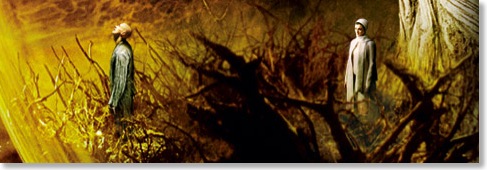
Trivia: Jackman had to shave off all upper body hair for the sequences that take place in 2500 because I guess we'll all be hairless in the future.
If you want a better quality video clip of the trailer (or more variety), go to the Quicktime site for The Fountain.
The Pirates Strike Back
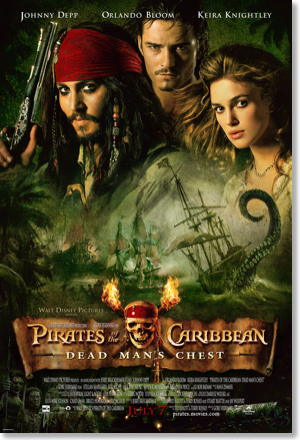
Lucas can say all he wants about envisioning six or nine movies in his saga, but he probably thought he’d never get past Star Wars. But when he did, Lucas felt like he had to make a more “serious” film, and a “darker” one. The article argues that much of his research for Apocalypse factored into the themes of The Empire Strikes Back: fathers and sons, finding your true nature, and so on.
Apparently the same approach is used in Pirates of the Caribbean: Dead Man’s Chest (hereafter referred to as Pirates, because it’s too long to keep typing). The first Pirates has its share of emotion (Barbosa’s soliloquy about his plight is saddening), but it is really just a popcorn movie with lots of action, scares and comedy.
Not this time around. We get some impressive action, including an exciting “Mexican standoff” version of a swordfight, some good scares and some comedy. But we also get serious themes about “What do you truly want?” and “Will you make the right choices at the right time?” It’s not quite sitting through a lecture, but after awhile it drags down the movie. And there is a lot of “dark”—physically and thematically.
Will and Elizabeth (Orlando Bloom and Keira Knightley) have their wedding day ruined when they are arrested by Cutler Beckett (Tom Hollander), a representative of the East India Trading Company, for helping Jack Sparrow (Johnny Depp) escape from the noose. Beckett offers Will a deal: find Jack Sparrow, bring back Jack’s “broken” compass to be set free. Having no choice, Will agrees. Eventually, Elizabeth sets out on to find Will. Meanwhile, Jack is doing everything he can to hide from Davy Jones (Bill Nighy), because Jack owes him a very serious debt. So everybody travels their own paths, just like in Empire. And everybody has to confront some darkness in others and themselves, like in Empire. And the movie ends on a sort-of cliffhanger, with a lot of loose ends, like in Empire. Think of Yoda as a voodoo priestess, and you’ve got the idea.
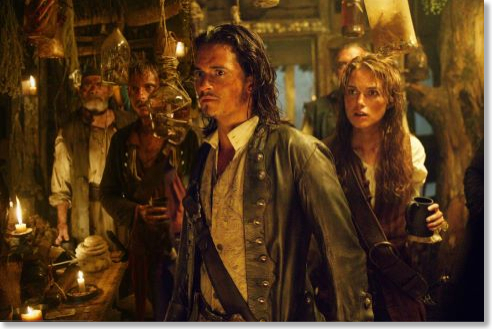
Remember what I said about dark? Believe it. This has got to be the darkest movie Disney has ever given its logo, and is definitely NOT for children in any way. There are some gruesome images (including a man having his eye plucked out, a beating heart, any sight of Davy Jones and his crew) that probably should have gotten the movie an R. There’s also a lot of sexual innuendo—far more than in the first movie. And, like Empire, the whole movie has an undercurrent of darkness that can get under your skin.
It takes a while to get the story going (they could have probably figured out how to tighten up the first 45 minutes), but it’s unstoppable after that. The action is first rate. The special effects set a new standard, even if they are a bit uneven. The effects people get bonus points for the kraken, though, which looks like what Ray Harryhausen would have done if he had been asked to design the sand pit monster from Return of the Jedi.
The acting is good too. Pirates brings back most of the supporting players, including some real surprises. Bill Nighy, as Jones, is very impressive, given that the look of his character is entirely computer-generated. Depp gives Jack everything he’s got, doing some great physical comedy (it’s fun just to watch Jack run away).
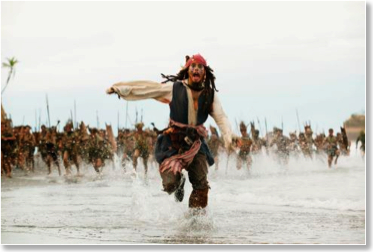
But the serious tones underlying the story began to tear at the Jack character, which eventually dampens the movie. Without giving plot away, the movie wants Jack to stay a comical scoundrel, but also redeem him. Think of the character development of Han Solo without the smirk. But the movie veers on this issue wildly. For all his funniness, Jack does some very selfish, despicable things in this movie. But when we see Jack act upon a possible redemption, we cheer because we love Jack, but his actions are so out of character, especially in the last twenty minutes or so, that the movie almost falls apart.
It will be interesting to see where the movie’s makers go with all this for the third movie (coming next summer). Storywise, they go out with a truly great setup. But a redeemed Han Solo was really not much fun in Return of the Jedi and I’m not sure a redeemed Jack in the third Pirates will be either.
Andrew Wells can be reached at arwell012002@yahoo.com.
Also of interest: Official Disney website for the Pirates trilogy
Superman: The Iconic Review

A great deal of this mythos, as Rick said in his review, has been shaped by the Superman movies--especially the first one. Superman: The Movie is flawed in different ways--some outdated special effects, inconsistencies in the plot, goofy humor, etc.—but director Richard Donner, composer John Williams and Christopher Reeve got the epic and joyful tone right; they knocked that one right out of the park. When Superman flies by us in that last scene, it’s as deeply felt a movie moment as any in history: the most powerful being on earth, and he slows down to stop and smile at us. It’s pure joy and bliss, epic and wonderful, and Donner let us relish that moment
For all the lavish and respectful devotion paid to everything Superman, Superman Returns just doesn’t get that. The opening credits and the final scene will tell you why.
Instead of letting us soar with Williams' theme and feel the vastness of space, director Bryan Singer fills the screen with images as we swoop by various wonders of the galaxy. The movie is too busy trying to keep us interested. The whole movie is like this, with few exceptions.
I’d like to say more, but I’m not sure I really need to. The final scene says it all.
In homage to the Superman movies, we see Superman (Brandon Routh) flying over the curve of the earth, right past us.
But he’s gone too quickly, and he doesn’t stop to smile.
Andrew Wells can be reached at arwell012002@yahoo.com
Superman Returns: A Review in Comparative Context
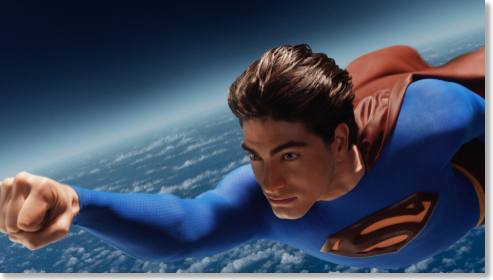
I can't remember a world without a Superman. He was part of the modern world's mythology instilled to me by my parents from a very early age. As soon as I could begin reading (which was pretty early), my father bought me Superman comic books. I wish I still had those exact issues. I continued to buy comic books on my own up until shortly before Kathy and I got married in 1990 (I couldn't afford both). The Superman of the comics most familiar to me was the one drawn by Curt Swan, spanning almost three decades until John Byrne revamped the Man of Steel in the mid-eighties. However, I was also very familiar with the early Superman of the late-thirties, forties, fifties and sixties thanks to reprints and collections of stories in books. Superman was always one of my favorite heroes, if not the favorite (with the possible exception of the Fawcett Captain Marvel of the forties and fifties, but that's a subject for another day).
And then there was the Superman of television and film. As a kid I watched (in reruns) the late, great George Reeves (Adventures of Superman) don the cape. In many ways, although he was the Superman of my parents' generation, he set the standard for me as to what Superman should embody as a hero. I was eleven when Superman: The Movie, starring Christopher Reeve hit the theaters. For the two or three years leading up to its release, this movie had been hyped in the comic books with a two-page contest explaining how "You Could Be in the Superman Movie." I wondered if I won that contest if they'd let me play Jimmy Olson. Years later I would find out that the two winners of that contest got to act as stand-in players on the Smallville football team, and if they were actually able to spot themselves in that very brief scene, perhaps there is such thing as super-vision.
Superman: The Movie (1978) marked a shift in super-hero movies, and would not be topped stylistically for at least eleven years until 1989's Batman. Even at the age of eleven, I could tell that this film was treating the character seriously. It had well-known actors like Marlon Brando as Jor-El and Gene Hackman as Lex Luthor. Even today, it's hard for me to see Hackman as anything but Luthor because that's where I first noticed him. The special effects, though a bit dated today, were cutting edge for the time. The tagline for the movie had been "You will believe a man can fly." And we did. Even watching the film recently, some (but not all) of the flying scenes are quite smooth. Before anyone depicted flying in films was obviously set in front of a blue screen. Not so with at least some of the scenes in Superman: The Movie. Even today, the film stands up fairly well and no doubt that for many, when they think of Superman, they think of Christopher Reeve. To me the movie is well done up until the last quarter or so. The whole turning-back-time-by-flying-very-fast-against-the-world's-rotation shtick didn't impress me even when I was eleven. Plus, as I verified while watching this movie again the other day, Superman still doesn't stop the second missile from hitting, he just saves Lois Lane. It makes you wonder who he didn't save in order to achieve this?
The scripts for Superman: The Movie and Superman II were both written by Mario Puzo of The Godfather fame. Although I liked the story line in the second installment involving the Phantom Zone villains (a great continuation and connection to the first movie), even as a boy, by that time at age 13, I did not care for the personal themes in Superman II. It wasn't merely Superman and Lois lane engaging in unmarried sexual intercourse (something that had never taken place in the comic books), it was the personal choice that Puzo had Superman make. Here was earth's protector choosing to give up his powers and abilities to have a normal life with the woman he loved, Lois Lane. Maybe that's a romantic decision for some, but then and now, it seemed like a very selfish and unheroic choice. It was a choice seemingly made on impulse without thought for the rest of humanity. It was a choice made without wisdom. I could never imagine the George Reeves' Superman making such a choice for Noel Neill (the television Lois Lane).
Superman III, which featured then popular comedian Richard Pryor, is largely unforgettable with the exception of the fight between Superman and Clark Kent (you'd have to see the movie to understand). That scene, to me, is one of the most clever psychological visualizations I've ever seen on film. Superman IV: The Quest for Peace, co-written by Christopher Reeve himself, suffers from obviously political overtones and perhaps one of the worst edits of a film I've ever seen. I remember watching the movie and wondering how the characters got from one scene to another, feeling as if something was left out. After reading a comic book adaption based on the shooting script, the story made more sense, but the product on the screen seemed incredibly rushed. The failure of this movie ended Christopher Reeve's run as the Last Son of Krypton.
The nineties saw a number of attempts to resurrect the franchise. For a while Tim Burton was schedule to direct the film. This project went far enough to see teaser posters created. Personally, while I thought Burton was a great match for Batman, I did not want him to touch Superman. The same thing goes for Nicholas Cage, who unimaginably for a time was in talks to play Superman. Cage is one of my favorite actors, but he'll make a better Ghost Rider than Superman.
So finally, after nineteen long years, Superman Returns. Rather than reinvent Superman the way Burton planned, director and story co-writer Bryan Singer, chose to pick up where the Mario Puzo stories of Superman and Superman II left off. Ignoring the events of Superman III and IV (just as well), Superman Returns is a thematic sequel to the first two films, especially the second. John Williams' unforgettable theme music (by now inseparable from the Superman mythos) returns, although Williams himself does not score this movie. The only actor from the originals to return is Marlon Brando in spite of the fact that he's dead! But this was an incredibly clever choice. Another actor from the 1978 film showing his face is Glenn Ford, who played Jonathan Kent in the original. His picture is clearly visible on the mantle in the Kent farmhouse. Even the opening titles for the new film are done in the same style as the original movies. Seeing that lettering and hearing the John Williams' music transported me back momentarily to my childhood.
SPOILER ALERT: Read no further if you haven't seen the movie yet. Superman Returns is everything Superman III should have been in 1983. The events in Returns take place five years after the events in Superman II. Over these five years, Superman (Brandon Routh) has been missing. We find out that in response to astronomers' discovery of Krypton, Superman has been on a long galactic journey to see if anything remains of his homeworld. Finding nothing, he comes home. Of course, it's never explained how Superman can get there and back in a span of five years even though Jor-El has stated that he's been dead for thousands of earth years. Oh well.
During this time, no only has life moved on for Lois Lane (Kate Bosworth), she is now a mother and engaged to Richard White (James Marsden of X-Men fame who gets more screentime in this movie than he did in X-Men II and III combined), the nephew of Daily Planet Publisher Perry White (played expertly by Frank Langella, although I miss Jackie Cooper). Hell hath no fury for Lois Lane scorned, and to prove it, she has won a Pulitzer Prize (a goal mentioned more than once in the first two movies) for her editorial, "Why the World Doesn't Need a Superman." It seems the boy in blue left without even as much as a goodbye, something she (rightly) took very personally.
The Richard White character is handled quite well. From a formulaic standpoint, usually an audience is made to hold contempt for any third wheel getting in the way of the characters you want to see hit it off. This is normally necessary so that he can be eventually discarded. When first introduced to Richard White in the movie, I wanted to dislike him, but as the movie progressed, that became something very difficult to do. I found myself feeling sympathy toward White, who was clearly insecure about Lois' past relationship with Superman--I mean, what man wouldn't be? Further, White is established as heroic in his own right, despite not being able to bend steel in his bare hands. Further (I warned you about spoilers), he is not removed from the triangle at the end of the movie, but the security of his relationship with Lois is at least questionable now that Superman's back in town.
The more significant plot point regarding Lois is her five-year-old son--coincidentally the same age as the length of time that Superman has been gone. Hmmm.... I'm going to break a golden rule of movie reviewing for the sake of later discussion and reveal to you that, yes--if you hadn't already guessed it--Jason Lane is actually Superman's son, the result of their coupling in Superman II. Of course, Time Magazine revealed the secret this week before me.
The third plot point revolves around Superman's arch-nemesis, Lex Luthor (Kevin Spacey). Superman has not only been an absentee father to his son, but he failed to make the parole hearing for Luther who is now legally a free man. And having visited Superman's Fortress of Solitude in Superman II, he goes back there to steal Kryptonian technology. Just as in Superman: The Movie, Luthor has a real estate scheme; although this time, he's creating a new continent rather than dropping missiles on an old one. Of course, just like the first time, if he succeeds, billions will die in the process because raising a new land mass will cause flooding of existing ones.
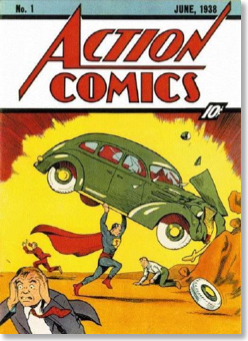
Although the 1978 film was supposed to make us "believe a man can fly," the flight in Superman Returns is how I imagine it really would be. There's not one scene that looks superimposed over a blue screen thanks to modern computer graphics and computer-based editing. And as opposed to the Christopher Reeve Superman, who when flying at tremendous speeds still never messed up his hair and his cape only lightly flapped, Routh's Superman's hair looks like he's riding in a convertible and his cape really seems to be pulling hard in the wind. Speaking of the cape, Superman's costume in this movie is slightly altered. The colors are darker for a modern audience (watching the original movies a few days ago, Reeves' costume comes across almost like pajamas by today's standards). The "S" on Superman's chest has been slightly altered somewhere between the version we're most familiar with and the original 1940's Siegel and Shuster rendition. However, Singer goes crazy with that S and it becomes superfluous. The S on his belt is redundant to the one on his chest. And there are even little S's on the heels of Superman's boots--oh my.
Besides the aforementioned connections to the earlier Superman movies, there are two nods to the fifties' Adventures of Superman television show. Noel Neill (the Lois Lane of the forties serials and seasons 2-5 of the TV show) and Jack Larson (Jimmy Olson of the TV series) both have roles in the movie. Although their roles are small, they are significant characters, not merely walk-ons such as when Stan Lee makes a cameo in a Marvel Comics movie. Neill's character is in a very early scene and although she was unrecognizable physically, her voice instantly gave her away to those of us familiar with the show. Larson's character is actually in a scene with the new Jimmy Olson (Sam Huntington) which makes it even more memorable.
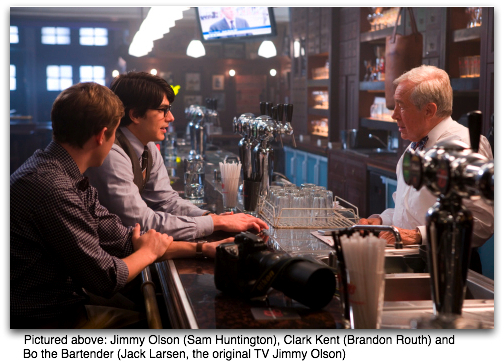
Speaking of cameos, folks familiar with billionaire adventurer, Sir Richard Branson will spot him as one of the space shuttle pilots in one of the movie's early scenes. I wonder how much he paid to be in this movie? More trivia: Noel Neill has now been in more Superman renditions than any other actor. She played Lois Lane in the movie serials with Kirk Alyn and in the television show with George Reeves. In Superman: The Movie--if you can view an uncut version--she plays the mother of a very young Lois Lane who, while riding on a train, sees a young Clark Kent run speeding past. Kirk Alyn is also in that scene playing Lois' father. Neill also guest starred on a episode of the Superboy TV show.
Brandon Routh obviously won the part of Superman because he bears not an identical, but a striking resemblance to Christopher Reeve. But in all fairness, not everyone would be able to easily wear that costume. While Routh captures the essence of his predecessor, and some of his lines sound almost exactly like Reeve's (in fact, at least two lines are identical to those in the 1978 movie), he also makes the character into his own. When the bank robber shoots Superman in the face--actually in the eye--Routh's Superman looks ticked off in a way that I don't ever remember seeing in the Christopher Reeve portrayal of Superman. And Routh's Clark Kent goes even beyond Christopher Reeve's performance making him not just a nerd, but an outright geek (there is a difference, you know).
Incidentally, according to the trivia on the IMDB, Routh thought he had blown the role when at his first meeting with Singer, he stumbled and spilled coffee all over the table where they were sitting. However, Singer later told him that blunder helped get him the role because it convinced him that he could play not only Superman but Clark Kent as well.
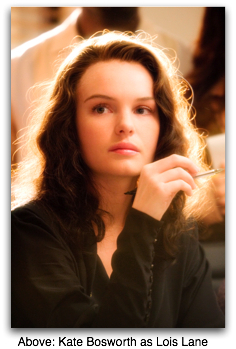
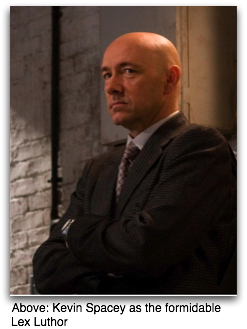
One of the strengths of the movie and certainly part of Singer's genius was to tie this Superman movie to the iconic versions from 1978 and 1980. However, in my opinion, this is also one of the film's greatest weaknesses. The ultimate connection to Superman II is the night that Superman and Lois spent together in his Fortress of Solitude. Lois' son is the consequence of this action. So, now the storyline begun with Superman's selfish disregard for all of humanity is now continued with his role essentially as that of an absentee father, perhaps even a "deadbeat dad." He certainly didn't pay child support during those five years he was gone, did he? Rather he left mother and son in the lurch. Granted, he didn't know about the Jason, but he didn't have a chance to find out because he left earth without telling Lois goodbye. C'mon, Superman, get a spine. This is certainly not heroic actions. Is this Superman supposed to look more human to us? Is he supposed to be an example perhaps to unwed fathers because now he's going to take responsibility for the child? I don't know. Again, I could never see George Reeves in this situation, and it's not what I want in Superman. Unfortunately, now that Singer has resurrected this storyline, I can only imagine that I won't see the kind of Superman movie I really want until I'm a very old man, if then.
Plus, here's an interesting continuity question. If Clark Kent (who as Superman had all kind of "extra" never-seen-before-or-since powers in Superman II) removed Lois' memory of events and his secret identity with some kind of super-kiss at the end of the second movie, how in the world does she know that Jason is Superman's son? This question is never addressed, let alone answered in Superman Returns. One wonders whether or not Lois shouldn't speculate that the child was some kind of "virgin birth."
Speaking of such things, it's hard to deny the Judeo-Christian imagery in the Superman myth. Superman is the story of a savior sent to our world from a heavenly father, who's last name just happens to be "El," the Hebrew word for God. In the Christianity Today interview, Singer rightly points out that Superman started out as more of a Moses figure seeing as Superman's creators Jerry Siegel and Joe Shuster were both Jewish. However, the story has been written and rewritten by many, many different writers over the years and the Christian imagery has grown. In fact, in the 1990's "Death of Superman" saga, Superman actually died and rose from the grave! There is a new book out that explores some of this imagery in the Superman myth, but from the reviews of it I've seen, too much is being read into the story. A better treatment of this imagery is in John Galloway's The Gospel According to Superman written about three decades ago. Although it's out of print, used copies are still attainable.
Bryan Singer, although Jewish, certainly plays this Christian imagery up in the film. The Superman of this movie hears the voices of everyone at once, like the God of the Bible who can hear the prayers of all people. There's much talk in the movie about whether or not the world needs not just a Superman, but a savior (that exact word is used). Jor-El's words from the first film about sending "my only son" are repeated. Superman is stabbed in the side like Christ, and toward the end, even stretches out his arms in a very Christ-like pose.
Personally, I'd rather leave the Christ analogies out. I love the Superman story, but Superman is not Jesus. And the Puzo-Singer Superman, the one who selfishly gave up his powers and had what turned out to be a one night stand in Superman II, resulting in a son of his own in Superman Returns is not my Jesus. Pardon me for saying this but the Superman of the Puzo-Singer storyline has more in common with Dan Brown's Jesus of the Da Vinci Code than the Superman of the Bible. Forgive me, but I'd simply prefer to keep Jesus and Superman separate (notwithstanding that Jim Caviezel was turned down for the role of Superman for this movie).
Kathy and I saw the IMAX 3-D version of Superman Returns. I hadn't been to a 3-D movie in years, and I thought this might make a good one to see with the effects. However, while fun, it doesn't really add anything to the story and may actually take away from it because the viewer is more concentrated on the effects than the story. In the end, there was less than 20 minutes of the two and a half hour movie that were actually in 3-D with nothing in the second half in 3-D at all except for the final flight scene. My hunch is that the team responsible for adding the 3-D effects simply ran out of time. These days, the final cut of a movie is often completed mere weeks before actual release. The lack of 3-D scenes in the second half and especially during the opening titles (which scream 3-D) seems to give away this tight schedule.
Go see Superman Returns. Overall, it is a good installment in the series. If you saw the first parts of the storyline as a kid like I did, it will take you back to your childhood. Just don't put the Man of Steel on too high of a pedestal. Remember instead that the world actually does have a Savior, and he's not vulnerable to Kryptonite, let alone rash choices.
CT Movies Interviews Superman Returns Director Bryan Singer
The interview is fairly significant because CT really tries to pin Singer down on the spiritual influences in the film. Although Singer comes across as a pluralist, he doesn't deny the Judeo-Christian imagery in the movie. Here's an excerpt of the Interview:
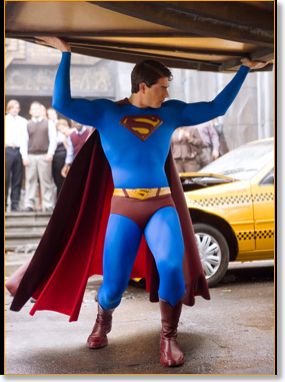
Singer: I don't think Jesus … Well, I can't get into religious things, but um…
Well, you are talking to Christianity Today!
Singer: Well, yeah, that's true, so I guess it's going to come up! (Laughs) I think that it [Superman as Christ figure] is kind of a natural evolution, because he began as kind of a Moses figure, of the child sent by the parents down the river to fulfill a destiny.
Kind of as a liberator in response to Hitler and the Nazis?
Singer: Yes. The Second World War presented an interesting dilemma for the Superman creators, because he was a very much an inspirational figure for the troops—and yet even though he was so powerful, he did not simply go clean up the Nazi menace and solve all the problems in Europe. He helped out, but he primarily led by example. He stirred others; he inspired. He left the actual heroism to the real heroes, to the soldiers in the field and abroad, and in that way, he became this very inspiring figure.
And that, obviously, translates into these kinds of allegories, Christ being a natural one, because Superman's a savior. And even more so in my film, because he's gone for a period of time, and then he returns. For me to say that those messianic images don't exist in the movie would be absurd.
The 1978 film seemed to push the messianic imagery, especially with the Jor-El quote about sending "my only son."
Singer: "They can be a great people Kal-El. They wish to be. They only lack the light to show the way." It's very powerful and very meaningful, that monologue and the other moment in the film where Kal-El's mother says, "He will be isolated alone," and Jor-El takes the crystal and places it into the ship and says, "He will not be alone. He will never be alone." Those two scenes resonated the strongest with me in the making of this movie, which is why I ultimately used Marlon Brando's voice and image.
As a Jewish guy, have you embraced this Christology/mythology, or do you see it as more than that, or what?
Singer: I grew up as a relatively secular Jewish kid in a Catholic neighborhood. I went to a Christian youth club as a kid, 'cause I liked the sports.
Mr. Ecumenical, huh?
Singer: It was very peculiar! And I had a Hindi friend, so I had some measure of exposure to multiple faiths. I have an aunt who's a born-again Christian; I wonder what kind of impression the film will make on her. I think it'll be obvious to her.
But when you grow up in a Judeo-Christian culture, these things find their way into your subconscious and your storytelling. So some of the imagery is, I think, unintentional, and some of it is very thought-out and celebratory. If I try to say, "Oh, I didn't know about that imagery," I'd sound like a fool—or like I was just being insincere.
In an action adventure film, if you don't care about the people that the action adventure is happening to, then the action adventure doesn't work as well. It's not as thrilling and meaningful. So, by calling upon certain romantic feelings, by calling upon certain spiritual feelings, by calling upon those thoughts and ideas and manifesting them in this kind of movie, it allows the audience to have a multiple of experiences besides just fireworks. For me, that's a very important part of the movie.
Obviously this was a very personal and emotional project for you. Was it also a spiritual experience in any way?
Singer: Uh, I think I have a spirituality that I keep very much to myself. I don't talk about it much, because I'm a filmmaker, I'm not a preacher (laughter)! I think spirituality exists in the movie, but I have my own [spirituality]. I pray in my own way, I guess you'd say.
Read the full interview. And look for This Lamp's review of Superman Returns late Wednesday or sometime Thursday.
Ocean’s 12: L’Autopsie du Cinéma
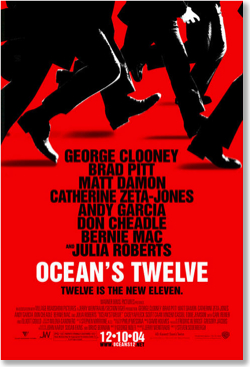
So I saw the Ocean's 12 sequel when it came out in theaters, and it was bad. I got to watch it on DVD a couple of nights ago, and only did so because I wanted to give the movie a fair shake. It’s still bad. What went wrong?
The plot: Benedict (Andy Garcia), the bad guy that Danny Ocean (George Clooney) and his crew stole money from in 11, is given information about who robbed him from a shadowy figure known as The Night Fox. Benedict demands his money back or else. Feeling they have no choice, Danny and the gang head to Europe to do a job to repay Benedict, but The Night Fox is a step ahead of them. Meanwhile, Rusty (Brad Pitt) must deal with an old flame turned police investigator (Catherine Zeta-Jones).
It seems like it takes forever to figure that out, because I’m guessing two-thirds of the time the movie gets in the way of itself. 12 commits three serious mistakes, in addition to a great many smaller ones.
First, the movie is too…French. Or European, if you want to be politically correct. Director Steven Soderberg has always made clear that foreign films and the avant-garde has an affect on his directing style. In his big studio productions, he’s usually been able to make effective use of these influences. Out of Sight, Traffic, and 11 and even Solaris are all good examples. In 12, however, the style just gets in the way. The oblique conversation with Danny, Rusty and Linus (Matt Damon) in the bar, the wacky comedy scene at the Paris train station, the attempt at farce when Tess (Julia Roberts) shows up to help in the heist—the style and format is all taken from French New Wave movies (such as The 400 Blows and Breathless). But no attempt has been made to work this material into the film; in fact, 12 comes off like a bunch of scenes strung together poorly, many of them improvised by the actors goofing around.
Improvisation, if there is any, may also be 12's second mistake. There were character moments in the first movie, but they were secondary to the plot. Here it is the other way around—the movie is less about plot than getting the characters together. There are long scenes where the characters just jabber, without getting anywhere, especially in the hotel. The characters, especially the supporting ones, aren’t built for the work, and neither are most of the actors playing them.
The third mistake involves the golden rule of con movies, which is show the audience the con. The idea is that the audience is supplied the information in the movie, but then something happens or is said that changes the meaning of everything that comes before it; thus, the con is revealed. In 11, this worked effectively. The audience knew the crew was pulling off an impossible robbery (i.e., the con), but did not realize the depth and cleverness of the con till the very end. Here, the audience doesn’t even get to see the real robbery, but also have to accept the improbable—that Danny and his crew knew the whole situation almost from the first moment, and were playing The Night Fox and Isabel the whole time. Special mention must be made of the improbable lasers (you’ll know it when you see it). Remember another movie golden rule: audiences will believe the impossible, but not the improbable.
The film has some good in it. The soundtrack is by retro-cool artist David Holmes, with lots of good percussion and horns. There are some excellent in-jokes regarding Hollywood and the first movie, including a hilarious cameo meltdown by Topher Grace. My favorite in-joke is what song Benedict is playing on the piano when he finds the Don Cheadle character. You have to watch the credits to discover it. Matt Damon comes off the best here--his character actually develops, and instead of goofing around, he’s trying to act. I can’t wait to see what he does with The Departed and The Bourne Ultimatum.
Amazingly, 12 made enough money that there will be an Ocean's 13 in 2007. Roberts and Zeta-Jones aren’t scheduled to star, but Al Pacino is involved, and supposedly the movie will take place in Las Vegas again. That’s probably a good idea, since 12’s visit to Europe was such a bust. Bon débarras!
Note: all mangling of French is the writer’s fault, since he doesn’t speak it.
Andrew Wells can be reached at arwell012002@yahoo.com.
Nacho Libre (Mini-Review)
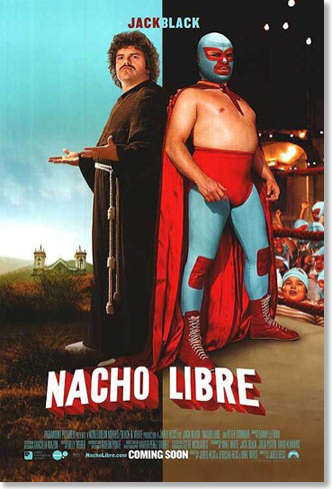
And, yes, we saw Nacho Libre this weekend.
Plot summary from the IMDB page: "Nacho (Jack Black) is a young man who was raised in a Mexican monastery in Oaxaca and now works there as the cook, and takes it upon himself to rescue the holy place from financial ruin by joining a local Lucha Libre tournament and becoming one of the "Luchadores." Naturally, Nacho isn't acting out of purely altruistic measures, as he wishes to help Sister Encarnacion (Ana de la Reguera), a beautiful Mexican nun who has recently arrived at the monastery, as well as the gaggle of young orphans who live there."
Believe it or not, the movie is loosely based on the life of Mexican priest Fray Tormenta who spent 23 years as a luchador (wrestler/fighter). Nacho Libre is written and directed by Jared Hess of Napoleon Dynamite fame. This movie has the same kind of humor as in Hess' earlier movie, so however you felt about Napoleon, you will probably feel about Nacho. The humor is hard to describe. It's not the insultingly stupid Dumb and Dumber variety. Rather, Nacho is the kind of unlucky buffoon that an audience can root for while shaking their head and laughing at the same time.
There is much to like here. Outside of Black, all the actors are Mexican, and most of them seem very real, not your usual Hollywood fare--perhaps this will become Hess' trademark: the use of "real" looking actors. If little Chancho were, in fact, a real orphan, I think Kathy and I would just have to adopt him. Further, the movie's fairly clean outside some slightly off-color boyish humor. I don't really remember any profanity at all. Black portrays Nacho as a dimwitted, but likable would-be hero.
The movie has a number of memorable quotes that I'm sure will be repeated ad nauseam in Mexican accents over the next few months just as they have been for Napoleon Dynamite. But the best lines aren't just in the movie: I encourage you to listen to the words in any of the songs playing. They are hilarious all by themselves, especially "My Love Is Like the Nectar" (sung by Black himself) which runs during the end credits. As of this writing, I can't find a CD soundtrack, but if one is eventually released, it would be fun to have.
Don't get your hopes up too high for this film, or you may be disappointed. But if you want to laugh for a couple of hours, Nacho Libre makes for a good escape.
"I was wondering if you would like to join me in my quarters this night... for some toast." --Ignacio upon meeting Sister Encarnacion.
Batman Returns: The Redemption
I spent a week recently at a beach house that had HBO, which showed Batman Begins one night. (I stand by my original review, although now I think the whole movie is over-edited, not just the action scenes.) The next day they showed the 1989 Batman, and that got me thinking about the whole series.
If Star Wars and Jaws were the beginning of the summer blockbuster, Batman was the perfection—everything we know about hype, tie-ins, media coverage, quick video turnover, etc. starts there. As much as I remember the movie, I remember the hysteria surrounding it even more. I’d seen movies before, but it was the first time I really started to become interested in them.
As a film, it holds up well, even with Jack Nicholson doing his umpteenth variation on Jack Nicholson. (Has he really done any real acting since The Shining?) Michael Keaton still proves to be a good casting call; the film is still a benchmark in production and design. Still, you can tell everybody was trying to figure out how to make a new type of comic book movie, something really different then before.
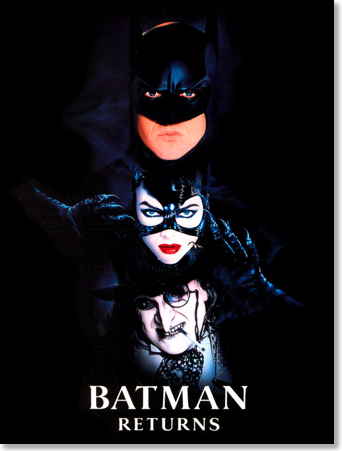
Which leaves Batman Returns. It came out after people had grown accustomed to comic book movies, but before the glut set in and everybody became familiar with the types (origin stories, etc.). The brief synopsis: Batman (Keaton again) must save Gotham City from the diabolical plans of The Penguin (Danny DeVito) and his new partner Max Shreck (Christopher Walken). The wild card is Catwoman (Michelle Pfeiffer) who wants revenge and Batman, but not necessarily in that order.
I believe only about twenty people in America like Batman Returns, which confounds me. Not only is it a good movie in its own right, it’s an important cinematic forefather to all the comic book movies we have now.
With Returns, I think director Tim Burton took his dark cinematic visions about as far as he has ever been able to go--with the exception of his Claymation productions, he hasn’t done anything like Returns since then, not even Mars Attacks!, which is more juvenile than subversive. As much as it is inspired by comic books, Returns is inspired by past films (especially early German and Art Deco films, like Fritz Lang’s Metropolis and Robert Weine’s The Cabinet of Dr. Calagari) and nightmares. Circus people, trains, rubber ducks, cats, penguins and even snow: Burton puts so much menace and dread into childlike and innocent objects in this film, it’s amazing he got away with it.
More amazing still is that everyone working with him seems to get it too, and rises to the challenge. The movie has a totally different look from the first one, but is probably more in line with what Burton imagined originally. It’s probably one of the visually darkest movies ever, as if they shot it with a dust-covered lens. It has some dumb, probably studio required humor--do we need Batman to be a DJ?--but most of the movie heads straight into darkness.
And the actors seem to be letting their inner freaks lose. Keaton seems more comfortable with the role, and adds shades of grey to the character that weren’t there before. Devito overplays his part some, but that’s probably due more to the writing and makeup. Devito can be a good actor when he wants to, and he has some great scenes, especially when he pays respect at the graves of his human family. Pfeiffer, however, is playing Catwoman on a whole other level. She manages to show all the sides of the character, from Catwoman’s before and after transformation to the zeal with which she terrorizes Schrek to her struggle with loving Bruce Wayne/Batman. I’d argue it’s one of the best acted parts for a comic book character ever, and, it’s a standard most actors in comic book movies have been unable to achieve.
As a sort of comic book Rosetta Stone, Batman Returns has even more significance. By the time it came out, people were starting to become familiar with the new “darker” tone that Frank Miller, Alan Moore, and others had established with comic books in the 1980s. Batman started the trend that continues to this day, even as comic book movies have gone from fantastical to more “real-world” settings, like the worlds of Spiderman and the X-men. Returns, in fact, hinges on an interesting point in American cultural history, between a happy we-beat-the-bad guys ending in our fight against Communism and the darker physical, social, political and emotional reality that started with Tianammen Square and has continued ever sense.
This new reality really comes out in the characters. Batman beats the bad guys and saves Gotham, but he isn’t very happy about it, because the personal price is high. The reality of his need to fight evil conflicts with his love of Catwoman. The Penguin and Catwoman are villains of the piece, but are also to some degree sympathetic, which is routine now, but was very new then. We are supposed to be amused at Nicholson’s Joker, but we are never suppose to feel sorry for him the way we are for the Penguin and (especially) Catwoman. Even Schreck can now be seen as a prototype for future comic-book villains, such as the Kingpin. All the characters are multi-sided and complex, given the capacity to do good or evil, usually for some kind of personal gain rather than “because it’s the evil thing to do.” This trend has spread to other types of movies, such as the later James Bond films.
So there is my case: Batman Returns is a good movie and an important one. Go rediscover it. In the meantime, let’s hope they can get an actor who can bring real menace as the Joker, and an editor with a steadier hand, for the inevitable Batman Continues.
Andrew Wells can be reached at arwell012002@yahoo.com.
X3 (X-Men: The Last Stand)
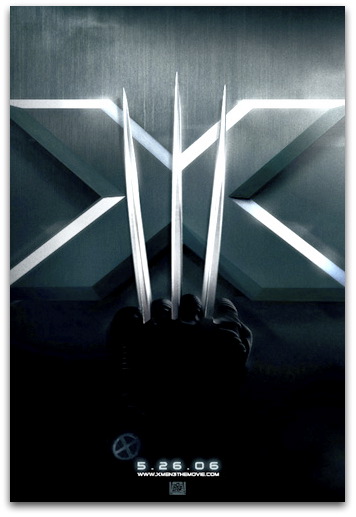
GUEST REVIEW BY ANDREW WELLS
We dodged the bullet with this one.
Given the tortured history and bad blood behind this production (which you can read about elsewhere), the rushed schedule to make the release date, and finally having director Brett Ratner, whose middle name might as well be “vanilla,” X-Men: The Last Stand (hereafter referred to simply as X3) should have been a train wreck of gigantic proportions. And judging from Internet discussion, most everyone thought that was what would happen.
But, miracle of miracles, it’s not. It’s within striking distance of being as good as the other two X-men films. And it is very, very satisfying on its own terms.
Without much detail, the movie deals with two major storylines: the discovery of a “cure” for mutants and the return of Jean Grey, who has now become the Phoenix. There are also nods to other storylines and characters, most of which I am not familiar with. But one of the things I have most enjoyed about the X-men movies is their ability to take these characters and storylines and refashion them into a successful mythology of their own. You may have needed to see the other movies, but you needn’t have read the comic books.
Having said all that, here are my other thoughts about the movie:
--One of the things I was most worried about having a new director for X3 was the loss of tone. X-Men and X2 both have a moody, sometimes ambivalent outlook about what is happening to the characters and to their world. The tone really makes the movies work, because these characters are far from perfect, and so is their world. Happily, the tone is still there. Perhaps the best example of it is the scene where Beast and Wolverine look at each other while fighting Magneto and Pyro. They know what they have to do, but they wonder if ethically it’s the right thing to do. They don’t say a word; you can read everything in their eyes.
-- Ethics play a large part with Magneto as well, and thanks to Ian Mckellen’s performance, he remains one of the most interesting characters in the movie: he’s right about what the cure will mean for mutants, but his believed superiority over humans robs him of the humanity he needs. You can see this in his final scene with Mystique, where his response to her is as stone cold as it gets. And his final scene at the chessboard, reflecting on everything he has lost and won, is very moving.
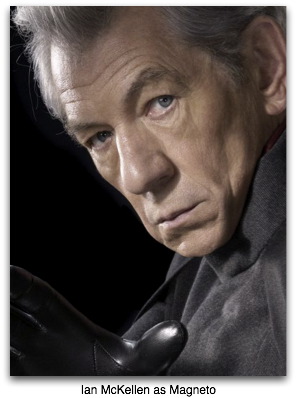
--As to the other actors, most everybody does really well to distinguish themselves, with two exceptions. It doesn’t matter how much fur Beast has; every time you hear him open his mouth, it’s Fraiser Crane, a.k.a. the actor Kelsey Grammer. He’s very good in the role--his fight scenes rock--but the character is just too similar to what he’s played for twenty years. The other exception is Halle Berry, who should never have been in the X-men movies in the first place. For an African weather goddess, her accent bounces around more than a pinball, and she’s never had the majesty that I thought was essential to Storm. I’ve always thought Angela Bassett would have been a better choice, and I still believe it.
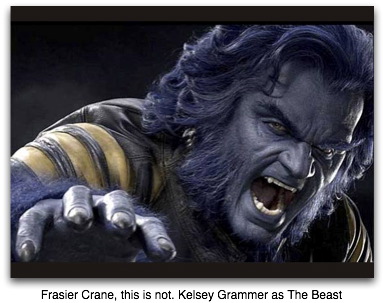
--I was also pleased about the continuity from the previous two movies. They got the minor actors (like Daniel Cudmore who plays Colossus) to come back, and they make good references, like Wolverine asking Rogue if she needs a lift. And I like the chess allusion that Magneto keeps using—touches like that really add to the quality of the movie.
--The production was rushed, but you can only see it in the special effects. Most look great, but there are several scenes where I was just taken out of the movie completely, most notably when Jean leaves the lab and when Wolverine approaches Jean on Alcatraz Island. And why have that great shot of Magneto throwing that rig through the windshield in the movie trailers, but not in the movie?
--And finally, obviously, it’s not the last stand. They’ve made too much money on this not to try again, and the story leaves too many characters' fates in question. Having said that, I think the movie could have benefited from a few more minutes, especially the Rogue/Iceman/Shadowcat storyline. We don’t get to see how that plays out, and it seems unfair. But given how much the movie got right, and how satisfying it was--the best movie experience I’ve had in a good while--it seems trivial to complain about.
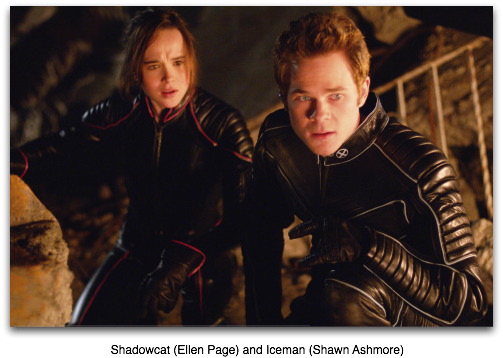
ANDREW WELLS can be contacted at arwell012002@yahoo.com
RICK'S COMMENTS:
There's not much for me to add here, Andrew--great review as always. I don't think I was ever as pessimistic about this movie as some folks were. However, if Brett Ratner's work has proved disappointing to some in the past, he has definitely redeemed himself in this film. In fact, this may very well be my favorite of the trilogy. There was so much action and so many characters, this movie felt like more of the comic books than either of the previous two installments. Who knows--maybe Singer had been holding back on us. I personally liked Grammer as Hank McCoy--more than you did, evidently. Hank McCoy/The Beast is supposed to be an extremely intelligent individual, so I think Grammer's background in "egghead" roles helped with this character, and that was probably why he was cast.
One question, though Andrew-- Angela Bassett as Storm? How old is Storm supposed to be?
Geekish nitpicks--in the comic books, McCoy's blue fur and skin are not part of his mutant characteristics, but rather from his own experimentation on himself. Therefore when he reaches out his hand to the "Leech," his fur should not have disappeared. However, his agility, strength and animal like reflexes are mutations. Incidentally, there was a brief Hank McCoy cameo in X2, where he was played by Steve Bacic, without the blue skin and fur. And although I thought it was really cool to see the Juggernaut in this movie (Vinnie Jones was perfect, accent and all), am I not correct that Juggernaut is not a mutant? I know, I know--it's all simplified for the movies.
Three quick notes:
(1) This movie is incredibly violent. Parents should take note of this before taking small children. Blood is tactfully (and perhaps unrealistically) avoided, but lots of people get killed. I remember at one time, Total Recall held the record for 140 or so deaths. This movie would have to be close to that from what I saw.
(2) If you get up and leave before the credits are over, you will miss the final scene.
(3) This is completely trivial, but in the scene where Wolverine is on his knees in front of a grave (I won't say whose grave), if you look on the left shoulder of his jacket (on the right side of the screen), there's a GIANT spider that has absolutely nothing at all to do with anything in the movie. I'm surprised it wasn't edited out. But just think-- what if it had been a radioactive spider? Then we could have had "Spider-Wolverine-Man."
New Superman Returns Trailer
There's what appears to be a new (third) trailer out, but it's not on the Quicktime site as of this writing.
Enjoy.
Oh, and that very last scene in the trailer--Ouch! And then, OH MY!
The Da Vinci Code (Movie): A Brief Review
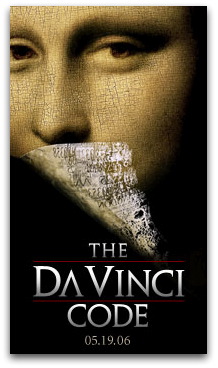
I have no desire to write a full review of The Da Vinci Code. Everyone seems to be doing that, and most of the reviews are not that upbeat. Here are a few quick thoughts:
I'll be honest, bad theology and bad history aside, the book itself was a pretty good read. Dan Brown made you like the characters, especially Langdon. However, as is often the case, the movie just isn't as good as the book. The movie seems to me to be much darker than I remember the book. The book seemed--dare I say it--fun at times. This movie is not fun.
Robert Langdon will not be a memorable role for Tom Hanks. The movie version of Langdon is fairly two-dimensional and Hanks doesn't seem to have much freedom to expand the character in any given scene. Ian McKellan has the best lines and perhaps creates the best performance. In light of the actor's publicly stated animosity toward the Judeo-Christian tradition, his rant against Christianity toward the end of the movie is very believable.
This may be the only movie to ever reenact the Nicene Counsel. Of course, it's depicted as pure chaos.
I'm not sure if this movie will appeal to those who aren't already interested in the subject. In other words, if a person had no desire to read the book, will he or she go see this movie? Related to that thought, had I not read the book, I would have had great difficulty following certain plot points. Distinguishing between the Priory of Sion and Opus Dei would be a challenge for the uninitiated, in my opinion. And there were a number of scenes where the only reason I could follow the story was because I remembered the sequence of events in the book.
And here's a minor spoiler (look away if it's really an issue for you). What happened to the guy getting the girl? In the book, there's a kiss between Langdon and Neveu that definitely has romantic implications, and a promise is made to see each other again at a planned time. In the movie, there's no such kiss and only a vague promise to see each other again. What happened? Well, perhaps the director, Ron Howard, recognized while filming the picture that there just wasn't a whole lot of chemistry between Hanks and Tautou. Blame the casting director perhaps. Hanks was certainly not the first choice for this movie according to the Internet Movie Database, but I'm not sure anyone would have fared better. However, don't you wonder if there were two different endings filmed?
Personally, if I were Langdon, I would have qualms against becoming romantically involved with the living descendent of Jesus Christ. But maybe that's just me. And I guess if Jesus had descendants, he's really not the Jesus of the Bible, and we could agree that this is a major point of the movie anyway.
Finally, there's a scene at the end of the movie, which doesn't seem to be in the book at all, but perhaps was added because of all the controversy (I'm trying to find the exact dialogue, so maybe I'll come back and update this). Anyway, in one of the final scenes, Langdon says to Sophie, something to the effect, "It's up to you what you believe." And then, "Does it matter if Jesus was human or divine, since he's remembered for teaching love and peace?" Those aren't the exact words, but you get the idea.
Two problems. It does matter what you believe. Truth is not relative. And the theological problem in both the book and the movie is that it creates a false dichotomy between the divinity and humanity of Jesus. Was he a man or was he a God? It's not an either/or. The Bible presents it as a both/and.
Truth be told, I'm a bit weary of The Da Vinci Code. I'm teaching on it Sunday and Wednesday nights because I believe it needs to be addressed within and outside the church. However, based on the response I've heard from a number of Christians who have pondered if the claims in the book might possibly be true, I believe we may need to change our discipleship strategies a bit in our churches. That will be the subject of another blog in a few days.
As films go, If you want a better movie in this genre, go rent National Treasure. Lots of puzzles and codes, better acting and plot, more historically accurate, and much less offensive.
Redacted 5/21, 7:40 AM
Movie Reviews
Siworae/Il Mare (The Sea)
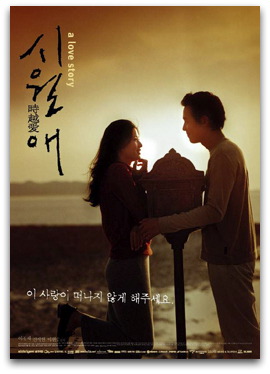
In the meantime, I highly recommend viewing the original South Korean version if you find it being shown somewhere or if you can pick up a copy on eBay which is where I found my copy. A number of the Far East films I've obtained from eBay have been bootlegs, but I was pleased to see that my copy of Siworae was not. However, my RCA DVD player is quite finicky with Asian-made DVDs, and I had to watch the movie on my PowerBook where I viewed it without any problems.
I can set up the plot for you and give away the movie's "gimmick," but that's all that I can do. Anything more would spoil the story. Even giving away the gimmick seems unfair, but otherwise, why would you want to see this movie just based on my telling you to?
The movie begins with a young woman, Eun-ju moving out of a house on the sea shore and a new resident, Sung-hyun (a construction worker) moving in. As Sung-hyun begins to settle in, he receives a letter from the previous owner asking him to forward her mail. The problem is that Sung-hyun is actually the first owner of the house which was just built for him by his famous architect father. As the two continue to exchange letters, they not only begin to draw closer, but they also realize that their letters are going through time and they are writing two years apart.
This is enough to set up the story, and to tell you more would be to give too much away. Exactly how the letters are able to transverse time is not exactly explained. Is the red ornamental mailbox outside the house enchanted? Or is the little dog, "Cola" who is cared for by both residents some kind of magical link? Who knows? One thing I've observed in watching quite a few Asian films in recent years is that there's no Western obsession with how things "work." As opposed to our stories in which we want good and logical explanations for anything seemingly supernatural, Asian culture is content to let magic remain a mystery, a given part of the world as they know it. What's interesting is that often when these movies get remade for American cultures, there is an attempt to explain the reason behind supernatural events for Western audiences. A prime example is the film Juon which was remade into the American thriller, The Grudge. In the original, there's no attempt to explain the supernatural events. In the remake we're given an explanation.
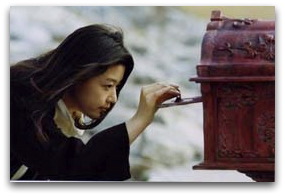
The cinematography is extremely well done in this film. The use of a steady cam in many of the scenes creates movement around characters that are standing still and enhances the feeling of getting caught up in the emotions of the scenes. Food and cooking is a minor theme throughout the movie, but the way these scenes are shot, it made me wonder if the cinematographer or perhaps the director had experience with cooking shows. If you watch this movie you'll understand what I mean.
If you're not used to watching Asian movies, you might find the pacing a bit slow, but the need to follow the subtitles will be enough to keep you engaged. The subtitles themselves were obviously done by someone whose native language was not English, but the dialogue was still easy enough to follow nonetheless.
Il Mare is Italian for "The Sea." This is the name that Sung-hyun gives to the house his father has built. I'm not sure if the Korean word, Siworae means "the sea" or if it means "A Love Story." Perhaps someone can tell me. All three titles are on the packaging of the DVD. Again, I recommend this movie for you to see right now, and it will be interesting to see how The Lake House compares to it when released later this year.
V for Vendetta
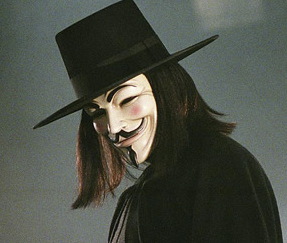
the fifth of November,
gunpowder treason and plot.
I see no reason
why the gunpowder treason
should ever be forgot
Okay, writing a movie review is really cheating on my blog hiatus, so I'll try to make this quick.
Kathy and I went to see V for Vendetta last night, the latest offering from Andy and Larry Wachowski, the creators of the Matrix trilogy. Regardless of how it will be received at the box office, I believe this movie to be a significant motion picture which is why I'm violating the break from my blog to comment on it.
The story itself has been adapted from a graphic novel by Alan Moore, although you won't see his name in the credits. Moore has totally disassociated himself from this picture. Supposedly he has been unhappy with previous movie treatments of his works including From Hell and The League of Extraordinary Gentlemen. I've also heard that he did not approve of the script for this movie. There are some very disturbing things about this film which I'll detail below, but Moore is no stranger to the disturbing; so I don't know if this had any impact on his distance from the project or not.
The movie itself takes place in some kind of alternative timeline in which the United States, locked into a civil war, is no longer a world power; and Britain has become a fascist state under a totalitarian dictator (played by John Hurt) with shades of Adolf Hitler. Irrelevant note: I observed that some of the characters in Britain (where the movie entirely takes place) were using current-day Dell computers. I wonder if Dell relocated to Britain before the US Civil War?
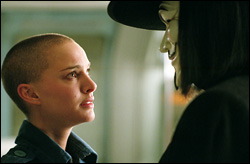
Hugo Weaving had the incredible challenge to act throughout the entire movie using only his voice and body language because his face was completely hidden behind the mask. You don't even see moving lips or eyes. Perhaps only Weaving could do this. Perhaps this kept us from seeing V as Mr. Smith or Elrond. Regardless, I imagine that only a Shakespearean-trained actor could have pulled such a role off. Weaving does it well. And V tends to talk fast and eloquently, so the viewer has to pay close attention. It might be worth seeing this movie again just to listen to Weaving deliver some of his lines. Consider V's introduction of himself to Evey:
This visage, no mere veneer of vanity, is it vestige of the vox populi, now vacant, vanished, as the once vital voice of the verisimilitude now venerates what they once vilified. However, this valorous visitation of a by-gone vexation, stands vivified, and has vowed to vanquish these venal and virulent vermin vanguarding vice and vouchsafing the violently vicious and voracious violation of volition. The only verdict is vengeance; a vendetta, held as a votive, not in vain, for the value and veracity of such shall one day vindicate the vigilant and the virtuous. Verily, this vichyssoise of verbiage veers most verbose vis-à-vis an introduction, and so it is my very good honor to meet you and you may call me V.
What the Matrix was to philosophy, V for Vendetta is to British literature and history. Although there is certainly a good amount of philosophy, too--especially political philosophy. Consider V's line, "People should not be afraid of their governments; governments should be afraid of their people." And when V began to speak of causality, I thought I was having a flashback to the Merovingian in Matrix Reloaded. The movie borrows themes from a number of stories from the past including Phantom of the Opera, Orwell's 1984, and even Bradbury's Fahrenheit 451.
A person could certainly see this movie as yet another a tale of revenge, or perhaps even a "beauty and the beast"-type love story, but I believe there is a much darker message below the surface of this film.
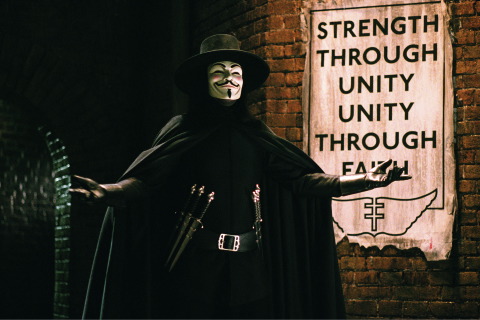
Now, in no way do I believe that we live in that kind of world, but that doesn't mean that there aren't certain individuals in our society who interpret the Bush administration's response to 9/11, especially in regard to the Patriot Act, as a significant limitation of our personal freedoms. Allusions to the ideological clash between traditionalists in our country and those who would advocate "lifestyle choice" surely can't be missed in this movie, let alone references to pedophile priests in light of the tragic events of the recent past. In V's world, even the Koran is illegal, and having a copy is grounds for the death penalty.
My fear is that a movie like V for Vendetta could move an unstable mind on either the extreme far left OR the extreme far right to resort to violent means against the government or even the church to send a message. Think I'm paranoid? Consider V's statement justifying the blowing up of the Parliament building: "The building is a symbol, as is the act of destroying it. Symbols are given power by people. Alone a symbol is meaningless, but with enough people involved as well, blowing up a building can change the world." Such a suggestion in a movie after 9/11 seem unimaginable, yet here it is.
V for Vendetta is undeniably meant to draw allusions to current political situations in our country. The fact that it is set in Britain is entirely a smokescreen. This movie is written to be provocative. The difference is that we do not live in a totalitarian state. If the majority of our citizens don't like public policy, we have the freedom to vote our leaders out of office. That was not really an option in V's alternate reality. Nor are a handful of abusive clergy the norm considering we have tens of thousands of priests and pastors who would never dream of harming a child.
My hope is that V for Vendetta will be seen as a movie and only that. I don't deny that it is very entertaining at times, and there are terrific performances by Weaving and Portman. However, I shudder to think what could happen from the hands of those who have trouble distinguishing between fantasy and reality.
Tristan & Isolde
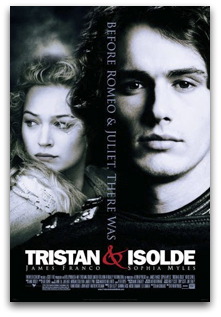
The story is basically one of forbidden love which is why the promoters have used the tagline, "Before Romeo & Juliet, There Was Tristan & Isolde." Well, that's true, and both stories are essentially tragedies, but that's where comparisons end. The aspect of forbidden love in this movie centers around Tristan's duty to deliver the woman he loves, Isolde, to his uncle, King Mark of Cornwall. This is a world of politically arranged marriages so Isolde, daughter of the Irish king, cannot simply refuse to marry Mark. She is bound to do so out of a sense of duty to her place and the supposed peace between the warring tribes that such a union will bring.
Now, if you're familiar with the original story, and you're expecting Tristan to rescue Isolde from a dragon and the two of them to fall under the spell of a witch's love potion, you will be disappointed. This telling of Tristan & Isolde is very much a "demythologized" version much like what First Knight was to the King Arthur legend or what The 13th Warrior was to Beowulf. I teasingly commented to Kathy on the way out of the theater that I was somewhat disappointed that there was no dragon. "There did not need to be a dragon in that movie! It would not have fit!" she exclaimed somewhat indignant that I would even make the suggestion.
Tristan is played by James Franco (Freaks & Geeks, Spider-Man). Franco is quite a good actor and definitely one we'll continue to see for some time. His trademark seems to be that saddened/hurt/betrayed/intensely introspective look that he carries throughout most of the movie, especially the second half. In the poster that I included above, he's almost smiling, but that's about the happiest you'll see him in this role. Sophia Miles plays Isolde (pronounced like it looks, by the way, but with a silent e). I had only seen Miles in Underworld before I saw this movie but she gives a fairly convincing performance. Perhaps the best performance was delivered by Rufus Sewell (Dark City, A Knight's Tale) who plays Tristan's Uncle, Lord Mark (later King Mark). Sewell is an extremely talented actor, but I'm so used to seeing him in roles as the villain that I assumed Mark was a bad guy in the first twenty or so minutes of this version of the tale. He's not.
I've heard very little buzz surrounding Tristan & Isolde. In fact, I never have seen a trailer on television (but I don't watch as much television as I used to), but rather first discovered the film on the Quicktime Movie Trailer website. I was interested in seeing it because of its literary connections and I also tend to enjoy period pieces. Having said that, I must confess that while the movies i good, it's not great. And I don't think it's done all that well at the box office. Indeed, it may be a film in search of an audience. Pardon my blatant sexist generality here, but with a tagline like "Before Romeo & Juliet, There Was Tristan & Isolde" you would think that the movie is targeting primarily a female audience. But When Harry Met Sally, this movie is not. There are a number of extremely violent scenes which is the primary reason it garners a PG-13 rating. I suppose, however, that guys out there could suggest this movie for a date night to look romantic and then later give a "who knew?" shrug during the fiercer battle scenes.
Tristan & Isolde is rated PG-13 "for intense battle sequences and some sexuality." There is no real nudity involved--lots of shots from the shoulders and up during the love scenes--but there is more blood than recent fare in movies such as the Lord of the Rings trilogy.
One last comment... I didn't know this until yesterday after looking up some of the history behind the original story, but evidently, Tristan may actually have been based on a real person in history. From the article in the Wikipedia:
A standing gravestone called the "Tristan Stone" near Fowey in Cornwall says simply enough in Latin 'Drustanus Hic Lacit Cunomori Filius' (Drustanus lies here, the son of Cunomorus). Interestingly, Cunomorus is the Latin name of King Mark of Cornwall, who in legend was Tristam's uncle and Iseult's husband ... Tristan may in fact have been a Pictish prince under a British King ... Under this explanation, the question arises of how the gravestone can be explained. One suggestion is that he could have been adopted into the family of Mark of Cornwall, which was an attested practice in Roman law.
Interesting...
Kong
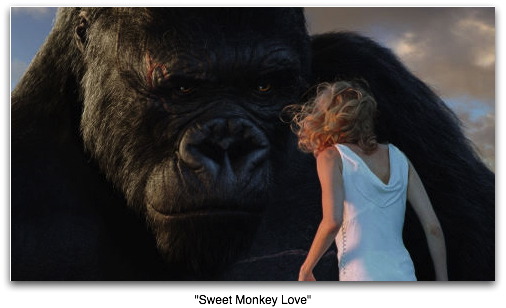
Peter Jackson's Reward. King Kong was Peter Jackson's reward movie. After making a kabillion dollars with the Lord of the Rings trilogy, Peter Jackson could make any movie he wanted to. King Kong was the movie he wanted to make since it was his favorite (the original 1933 version, not the 1976 remake with Jessica Lange) as a child. However, not only was he rewarded with the opportunity to make any movie he wanted to, he also got paid $20 million dollars to direct King Kong, the most money any director has ever been paid. Jackson is now the new Steven Spielberg, so I guess we can start expecting his movies to get snubbed at the Oscars, too. Further, as long as Jackson has a string of successful hits, I imagine he will continue to get to make whatever movies he wants. I've heard rumors that The Hobbit is coming soon. I hope so.
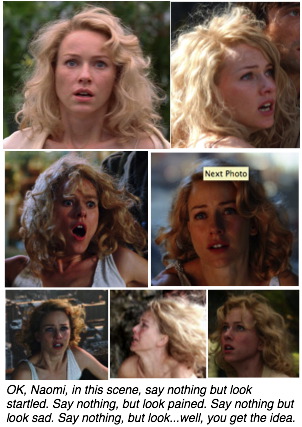
Fay Wray's Almost Appearance. Evidently, the 1933 Ann, Fay Wray was originally supposed to say the last line of the movie, "It wasn't the airplanes; it was beauty that killed the beast." Unfortunately, she died in 2004 before they could film/record her saying this. The movie is dedicated to her memory.
The Movie is LONG. Yes, this movie is fairly long at 187 minutes. This has been a criticism of the film as Jackson has been accused of being so in love with the film that he didn't know where to cut it. According to the trivia page at the IMDB site for the movie, many of the exact lines, costumes and props that were in the original went into this movie. Further, the entire first act of the movie, set in New York, is provided as back story and was never in the 1933 version. Once I saw dinosaurs on Skull Island, the little boy in me took over, and I think I could have sat there for six hours. However, my personal opinion is that in any film that is three hours or longer ought to have a five-minute intermission. I had to excuse myself to the restroom twice--TWICE--during this movie. I haven't had to do that since Return of the King. Hmmmm...
Can This Relationship Work When He Has All the Manners of an Ape? Yes, the relationship between Kong and Ann seems a bit bizarre. And yet, I must confess--perhaps it's good acting on Watts' part and good directing from Jackson--the two of them actually had chemistry together. I don't mean that in some kind of perverted sense, but perhaps more in the sense of the genuine affection between a pet and its owner. Of course, with Kong and Ann, I'm not sure which was which. But there were some very moving scenes between the two of them such as when she chooses to let him be her defender from the tyrannosaurus rex or when they "danced" together in Central Park. But such relationships are doomed to fail, especially when others are firing bazookas at you. By the way, I'm assuming you know how the movie ends, but Kathy had never seen either of the previous versions, and she cried at the end. "You mean, he's not going to get to go back to Skull Island?" Actually, she cried a couple of times during the movie. That's how well the chemistry between Kong and Ann is portrayed.
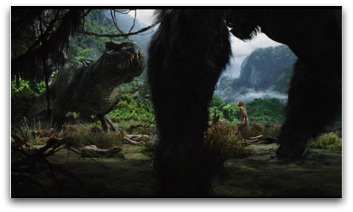
[By the way, note to parents: take the PG-13 rating seriously. Some of the scenes, especially on Skull Island, are going to be too intense for young children. I saw more than one parent take their children out of the movie.]
What's the Point of the Movie? I was thinking about this even before I went into see the film. What exactly is the point of King Kong? Yes, "it was beauty that killed the beast," but in the end, so what?I mean with Jurassic Park, there was definitely an ethical angle to the movie about setting self-imposed limits to what we can do with technology. And I'm sure some animal activist group will seize upon the picture as an example of why animals should be left in the wild and not put on display. But that was certainly not the message that Jackson was presenting in the movie. Perhaps not every movie has to have a message. Perhaps this movie can allow someone such as myself to occasionally put aside critical thinking and just let that little boy that's still in me somewhere be entertained. King Kong did that for me, and as much as I enjoy movies, very few of them do anymore.
LWW Opening Weekend Exceeds Disney's Expectations; Prince Caspian Greenlit Behind the Mouse's Closed Doors
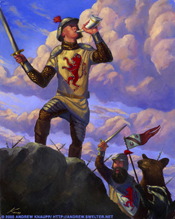
Considering that Disney and Walden Media invested a combined $180 million into LWW, and the movie already brought in 60% of that in its opening weekend, it could recoup it's further investment in video sales next year alone. But with another six weeks of or so of box office sales, odds are they will see far more profit than that.
Prince Caspian is the only other story to involve all four of the Pevensie siblings as children and takes place a year after the events in LWW. The timing is perfect for a sequel while the actors are still at the right age. This has been Walden Media's plans all along with a script for Prince Caspian completed months ago.
See also the related story, "Rumor Has It Prince Caspian Is a Go" at IGN.
The Chonicles of Narnia: The Lion, The Witch and the Wardrobe
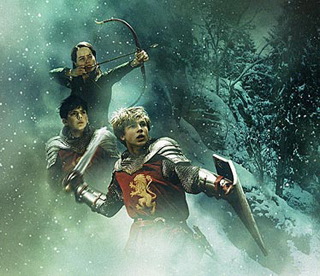
It's been at least a decade since I read C. S. Lewis' The Lion, the Witch and the Wardrobe (henceforth, LWW). And I hate to confess, that it's the only one in the series I've read. Perhaps it's that lesser time for reading fiction that I mentioned in a blog entry the other day. That also means that having read the book so long ago, I won't be able to tell you in detail how faithful the new movie released today was to the book, or how it strictly compares. However, that's okay because what I can tell you is that the movie thoroughly feels as if it is faithful to the spirit of the C. S. Lewis that I know from his numerous other books I've read. Perhaps this is because Douglas Gresham, the stepson of C. S. Lewis, was given final say on decisions ranging from the script to character and set designs.
The movie is absolutely captivating from beginning to end. Sadly, it's very hard for me to escape into a movie anymore, but I found that a number of times, I felt completely caught up in the events taking place. The movie centers around the adventures of four children, and there were certain points in which I felt like a fifth participant in the film. It takes a lot to pull me into an experience like that. Perhaps that is the beauty of Lewis' storytelling. Yes, this is a children's story, but it speaks to adults as well without resorting to dialogue and innuendo that only adults will pick up on as is done in so many other supposed children's movies today.
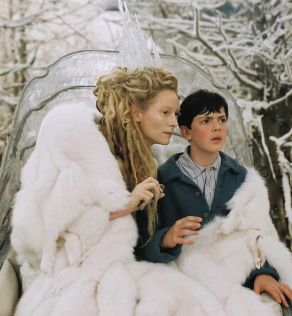
I was fascinated with the characters--human and non-human--in LWW. The four principal actors playing the Pevensie children were essentially unknown actors, but they performed their parts believably and remarkably well. Some of the other cast members have more experience, but most will be fairly unfamiliar to audiences outside of England. American movie-goers will recognize Tilda Swinton who plays the alluring White Witch as the actress who so masterfully portrayed the androgynous archangel Gabriel in Constantine. Liam Neeson provides the voice for the lion, Aslan.
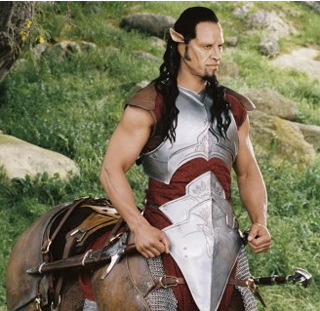
For those who may have been concerned that the spiritual themes in the Lewis' original story would be toned down in a big-budget Hollywood retelling, you can put your fears to rest. From what I could tell, and from what I remember of the book, nothing was left out. There were a number of biblical parallels that may even be more explicit due to the visual nature of telling the story through film. However, parents with young children should be advised that some scenes may be too scary for very small children. But the movie is not quite as violent as Lord of the Rings, and not near as dark as the Harry Potter stories.
Lewis did not want to see his Narnia stories depicted in film because he was concerned for the way the non-human characters would be depicted. However, technology has come so far, that I would have to hope that he would be pleased with the final product. Centaurs and minotaurs move the way I imagine they would if they really existed. I really don't think that LWW could have been made before this point in cinematographic history with such excellence. Walden Media, the company behind LWW (Disney is merely the distributor and marketer) has purchased the option to make all seven stories in the Chronicles of Narnia. Such decisions are usually based on the financial success of the first installment in a series. However, based on what I saw today, and upon my desire already to see this movie a second time, I believe we can look forward to seeing the rest of the series over the coming years. That's a nice thought for those of us who were fed by the annual installment of Middle-Earth for three years in a row, but have been left not quite so satisfied with tales from Hogwarts. In the meantime, I suppose I have six other books from Lewis to catch up on!
Which Action Hero Are You?
 | You scored as Neo, the "One". Neo is the computer hacker-turned-Messiah of the Matrix. He leads a small group of human rebels against the technology that controls them. Neo doubts his ability to lead but doesn't want to disappoint his friends. His goal is for a world where all men know the Truth and are free from the bonds of the Matrix.
Which Action Hero Would You Be? v. 2.0 created with QuizFarm.com |
Take the quiz yourself and post your results in the comments.
The Day the Earth Stood Still: A Retro Review
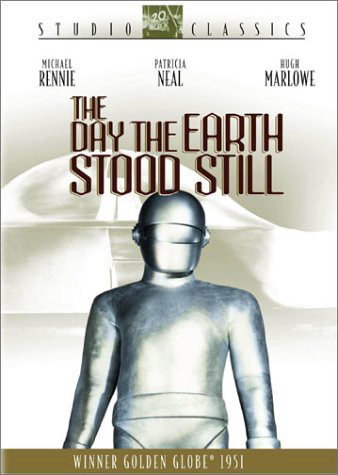
My brother-in-law, Clark Putman (Kathy's brother) gave me a copy of the classic 1951 sci-fi movie The Day the Earth Stood Still for my birthday this year. I saw this movie years ago as a kid, probably around the time when I was six or seven years old. Clark said it was one of his favorite movies of all time and figured I'd like it.
Well, he's right. It's a great movie--not perfect, but one that holds up pretty well over time, although it's definitely a symbol of the cold-war, flying saucer movies of the fifties. It would be impossible to name all the movies that are influenced by The Day the Earth Stood Still, but what comes to mind immediately are Independence Day, numerous Star Trek episodes and movies (especially ST:TMP and STIV), Battlestar Galactica, 2001: A Space Odyssey, The Iron Giant, and its fingerprints are even in films like Army of Darkness and Good Will Hunting. The producers chose to film most of their Washington DC scenes on location in the nation's capital rather than rely on Hollywood back lot sets--an innovation in its day, but done to add realism to the movie. To say that The Day the Earth Stood Still (from here on DESS) is a landmark film is almost understatement.
The film, directed by the recently deceased Robert Wise (The Sound of Music, Star Trek: The Motion Picture), begins with a flying saucer landing on the mall in Washington DC. Out of the saucer walks a very human looking alien, Klaatu (Michael Rennie) and a towering robot named Gort (Lock Martin). Klaatu comes in peace with a gift for the US President, but is predictably injured by a trigger-happy army soldier. Klaatu recovers and when he asks for an audience with all of the world's leaders, learns the reality of Cold War politics--the Russians won't come unless the meeting takes place in Moscow, and the Americans won't meet if the Russians are in the room. To understand the nature of earth's culture better, Klaatu escapes his army captors and assumes the role of a visitor to town, Mr. Carpenter. He soon finds a room at a boarding house where he meets a WWII widow Helen Benson and her young son, Bobby. Helen Benson is played by a young and quite striking Patricia Neal, years before she developed her trademark raspy voice, presumably from smoking. The actor playing Bobby is an extremely young Billy Gray, who would later go on to play "Bud" on Father Knows Best. Classic TV fans will also spot Francis Bavier, better known nine years later as Aunt Bea on the Andy Griffith Show, as one of the residents at the boarding house.
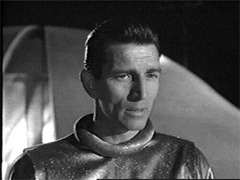
I'm going to break one of my review rules and tell you about part of the movie's ending, but it's core to my critique. And, hey, you've had 54 years to watch this movie, so if I'm spoiling anything for you, it's just as much your fault as mine. In shades of Star Trek: First Contact, the reason the aliens have decided to contact earth's powers is because earth has already developed atomic power for destructive use (the bombings of Hiroshima and Nagasaki) and has just begun experimenting with atomic powered rockets (according to the movie). Since earth's space exploration is inevitable, evidently there's some concern in the galactic community that earthlings will bring their violent ways to space. Space, we find out is a fairly peaceful place because years ago, the aliens submitted themselves to an inter-galactic police force represented by the giant robot, Gort. Earth is given a final ultimatum that they must either resolve their nations' violent differences and enter a new age of peace or face obliteration. Klaatu/Carpenter tells earth's leaders that he will await their answer and then the movie ends (see the quote at the beginning of the review). No doubt for 1951 audiences, the movie's ending was abrupt, and although not as surprising to today's audiences, may have been somewhat ahead of its time. There's no nice and neat resolution to this story. In effect, the decision for peace or destruction is handed over to the audience itself.
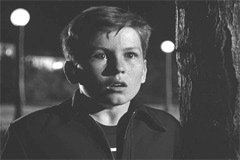
I have a couple of problems with this solution. First, giving that much power to any organization, even a representative organization like the UN, is a dangerous idea. The founders of our own nation's government knew this too well--that humans have an innate fallen disposition--which is why they created a system of checks and balances in our governmental system. Second, I realize the UN of the 1950's is quite different from the UN of today, but would we really want to answer to this organization which has been plagued by inefficiency and scandal in the last few years? Third, I have a bit of a problem with the way the decision is proposed at the end of the move. Yes, yes, I know it's a metaphor, but there's something disturbing about being "forced" into peaceful relations that bothers me. If we can't learn to live peacefully with one another from an internal change of heart, do we really want to fool ourselves into thinking we can be forced into it? I could just imagine the fictional earth of the movie choosing to submit themselves to the robot police force out of fear and then eventually plotting how to overthrow them. This is also why I don't favor christological interpretations of this movie that suggest Mr Carpenter (get it?) is a Christ figure who has come to persuade earth to pursue a better path. Long term peace cannot be forced. There must be a change of heart for peace to take place. Hate for one's neighbor has to fade away. That's a lesson the nations of the real earth still have to learn.
Regardless, this is a great movie that I absolutely recommend. The pace of DESS will seem much slower to modern movie audiences, but its real meaning is found in its dialogue rather than action sequences. The crisp black and white look of the film mixed with the story's content and genre gives it a Twilight Zone feel. The current DVD version has been produced from a restored copy of the film. Unfortunately, it's not widescreen. However, it does contain a number interviews with surviving actors and film crew, including Robert Wise before he died. Also included is an actual movie news reel from the era, that while selected because it refers to the movie itself, is more valuable for characterizing the international political landscape of the time in which the movie was made.
Klaatu Barada Nikto!
Lack of Faith in Walk the Line?
First is Terry Mattingly's "Walking the Line with God?" in which he says the movie totally misses the role Christianity played in the life of Johnny Cash and his family.
Second is a review by Mark Joseph, "A Faith-lite Johnny Cash" in which he calls Walk the Line "a beautiful movie with a gaping hole." He also contrasts this lack of insight from this movie's producers with Rick Rubin who produced Cash's "American" albums in the nineties, saying that this rock and roll producer, in spite of the fact that he didn't share Cash's faith, did understand the role it played in the life of the Man in Black and as such, that faith is reflected in these albums.
I don't disagree with the analysis of either of these writers. My expectations of Hollywood are just low enough that I'm not ever surprised that faith is downplayed in movies. Fortunately, Christian faith is a present theme in Walk the Line, even if it is not given the place it deserves.
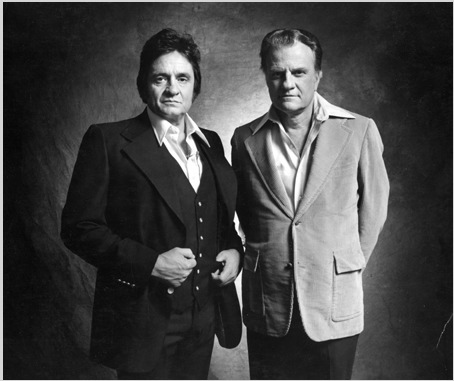
Above: Johnny Cash and Billy Graham, 1978, taken by Jim McGuire
Walk the Line

Johnny Cash: "Then they're not really Christians."
As far back as I can remember, Johnny Cash was a part of my personal culture. I don't remember a time in my life when I didn't know who he was. I still recall standing in a circle with classmates and my teacher when I was in kindergarten. She was letting us suggest songs and then we were singing them together. One little boy spoke up and said, "Oh, I know a song by Johnny Cash!" We all stared at him waiting. After a few seconds of racking his brain, he said, "It's something about a train."
In the last decade or so, I "rediscovered" Johnny Cash and have a number of his albums, including the famous "Live at Folsom Prison." Johnny Cash is like Billy Graham. Cash doesn't have a perfect voice, and Graham is not the most eloquent preacher you'll ever hear. Yet, both are extremely powerful when they use the abilities God gave them. Johnny Cash has the unique ability to connect to all kinds of people from all different walks of life. Whether listening to the live recording from Folsom Prison (1968) or his last album, "American IV: The Man Comes Around" (2002), Cash has the power to move you with his sometimes raspy, sometimes off-key voice. He sings about life. He sings about mistakes. He sings about faith and redemption.
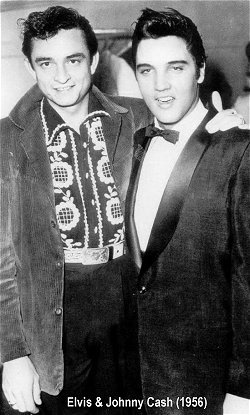
As I said, this movie is a redemption story, and as such, at times it was hard for me to watch. Why? Well, if the timeline in the movie is fairly accurate, Cash began to clean up his life in the late sixties. I was born in 1967, and I never had the image of Johnny Cash as the carouser who was arrested for drug possession. For me Johnny Cash has always been this great legendary performer who sang about real life and occasionally performed at Billy Graham crusades. In order for redemption to take place in the movie, we have to witness Cash's self-destructive downward spiral into alcohol and drug abuse, infidelity, and a failed marriage. The second act of Walk the Line is certainly not rip-roaring fun for the audience because most of us admired the man and feel a connection to him. Yet, it's significant that before he died, Cash was involved in this project from the beginning--down to his personal selection of Joaquin Phoenix to portray him in the movie. As unflattering as some of the events in his life were, I think that if he were alive today, Johnny Cash would approve of the final product. There were no skeletons in his closet because everything was out in the open. He was not perfect man, and he never attempted to portray himself that way. Perhaps that's why his music is so real and why we enjoy it so much.
As I mentioned, Joaquin Phoenix was personally selected for the role by Johnny Cash himself, reportedly after Cash saw Phoenix's performance in Gladiator. Although I don't know if I ever fully thought that I was seeing Johnny Cash instead of Phoenix in his portrayal, the latter is to be commended for his performance. Not only does he sing the Cash songs himself instead of relying on dubbed tracks, he even learned how to play guitar for this part. In fact, his best times of portrayal are when he performs. He has the Cash stare down, the tilt of the head back before launching into a song. He even holds his guitar in Cash's trademark style that looked more like he was firing a shotgun than playing a musical instrument.
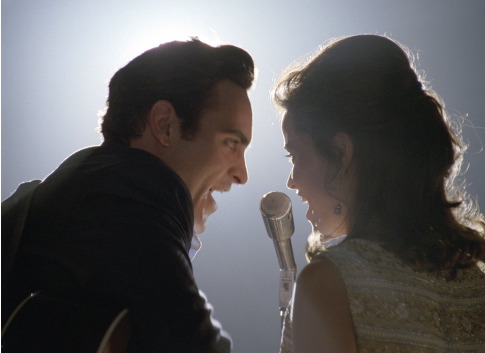
Incidentally, I read a couple of weeks ago that Kathy Cash, Johnny's daughter from his marriage with his first wife, was displeased with the movie because she "said the film unfairly shows her mother, Vivian Liberto Distin, Johnny Cash's first wife, as a shrew." Granted, it's not my mother being being portrayed in the film, but Cash's first wife did not come across to me like that at all. If anything she is portrayed as a victim of Cash's earlier indiscretions.
With limited budget and my return to the life of a student, this was the first movie we'd seen in a few months, but one that I eagerly anticipated. My favorite parts were the performances, and I felt this was where Phoenix really shined. If you are considering seeing this movie with children, take the PG-13 rating seriously. Drug and alcohol abuse and marital infidelity are portrayed very realistically. And of course, like any movie portraying this era in American history, everyone smokes cigarettes.
But after you see Walk the Line, go listen to some authentic Johnny Cash recordings. Odds are, after seeing his real-life story, you will hear the words in his ballads in a different light and with new appreciation.
Mike Newell's Other Movies
I’m one of the only people I know that will go (or not go) see a movie because of who directed it or who wrote it. I’m not just talking about the new Steven Spielberg movie. I mean all movies. It is with that in mind that I’m very curious about Harry Potter and the Goblet of Fire.
Goblet is directed by Mike Newell, who is probably best known for Four Weddings and a Funeral and Donnie Brasco. Newell has also made a couple of films that are real gems, and they are worth seeking out: Enchanted April and Into the West.


Andrew can be contacted at arwell012002@yahoo.com.
A Look Back at the Matrix Trilogy
Return again with me, if you will, to the heady days of 1999, as a sci-fi movie was shaking the world. No, I’m not talking about Star Wars Episode One. I meant The Matrix.
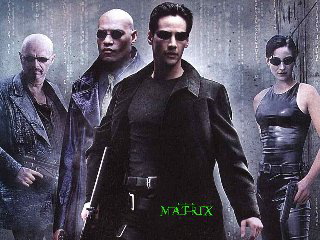
Lots of money was made. Sequels were demanded. And that is where things begin to go askew, and where my autopsy begins.
The Matrix Reloaded and The Matrix Revolutions (abbreviated as Re and Rev from this point on) fall into that rarest of all movie categories: movies that are ambitious, reach for the stars, and fail. I wanted both these movies to succeed, to be great; but when I finally viewed them, no matter how cool the action scenes were, no matter how much great intellectual discussion they threw at me, I knew the movies were flawed, and being the passionate movie person that I am, it tore my heart out. I mean, I’m still thinking about it, and it’s been two years. And judging by Internet chatter, I’m not the only one. The box office speaks too: Re made over $250 million at the theaters; Rev barely made $125 million. Somewhere along the way, people got burned.
What went wrong? I offer up three reasons:
When it gets down to it, they are still movies. The original Matrix successfully appealed to a mainstream audience while maintaining a fan base. Even with all the intellectual discussion, plot and character were never sacrificed. Movie-wise, everything clicked, like the tumblers in a safe. After several viewings, I believe that Re (especially) and Rev (less so) succeed in expanding on the ideas and principles introduced in Matrix. There is a lot to sift through and understand; the material is denser; and, unfortunately, it is not always presented or demonstrated clearly. Nevertheless, it satisfies the fan base.
But the mainstream audience is coming to see a great movie, with a strong plot and good characters. And that is where Re and Rev stumble. There are many problems, so let’s look at a noticeable one: the character of Morpheus.
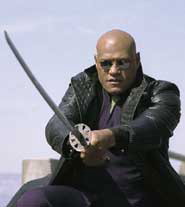
Misjudging what an audience will do. For the sequels, the Wachowski Brothers (the directors) decided to tell their story through several different sources. A series of short cartoons (shown in theaters and online, and then collected on DVD as The Animatrix) were created, with some providing important plot information for the sequels. A video game was also developed, again providing plot information.
For the fan base, that’s more Matrix to enjoy. But for audiences who neither watch cartoons nor play video games it’s a real liability. Without the knowledge learned from other sources, the movies can be hard to follow. For example, who is the (very annoying) kid following Neo around Zion? If you don’t see one of the cartoons, you’ll never know. The movies should have been able to stand on their own.
Finally, the creative control went to the director’s heads. This is pure speculation on my part. Generally, it is the dream of every movie director to have creative control of a project—to not have suggestions made by editors or producers or test audiences. Indeed, I believe movies made by committee are usually the worse for it; but sometimes it is helpful (Casablanca is an outstanding example). Being fairly new in Hollywood at the time, I seriously doubt the Wachowskis had the clout to get creative control for Matrix—too much money (at least $60 million, probably more) was involved. With Re and Rev the Wachowskis had the clout to get complete creative control. With complete control, however, you can wind up in a vacuum, not able to get any feedback or advice from outside your viewpoint. The danger then becomes that when you show your movie to the audience, they might not understand what you were trying to do. I think that is what happened here.
So there you have it—what went wrong and maybe why. No doubt, there will probably be disagreement with my theories. That’s encouraged. As for me, anytime I catch one of the Matrix movies, some part of me will be sad about what could have been.
You can contact Andrew Wells at arwell012002@yahoo.com
The Iron Giant: An Appreciation
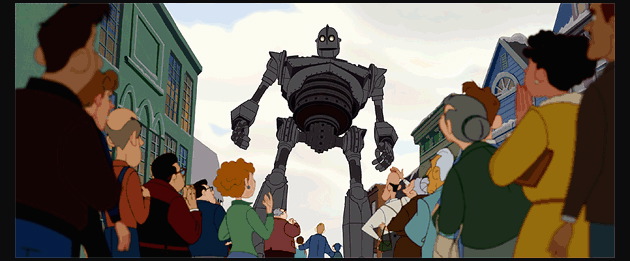
Guest review by Andrew Wells
Several nights ago, my mind somehow wandered around to The Incredibles. If you don’t know--and you probably do--it was a cartoon that came out last year about a family of superheroes who were forced into civilian life. A lot of people--myself included--thought it was the best movie of 2004. I’ve watched it four times, and my general rule is never watch a movie more than once.
So people know about The Incredibles. But they may not know about Brad Bird, the director, or another wonderful cartoon he made.
It's called The Iron Giant. It came out in 1999 and pretty much disappeared from movie screens. I think it has found a good life on video, but I’m not sure.
The story in brief: A lonely boy discovers a giant robot from outer space. The robot has lost its memory, so the boy adopts it and helps him get his memory back. But a government agent knows about the robot, and is trying to track it down...I won’t tell more from there.
I think the reason Iron Giant failed was that it’s not a Disney cartoon, in style or substance. Its look is very moody--the colors are drab, the characters have more angles to them than the rounded Disney characters. Everything feels, well, darker. When was the last time you saw darker in a Disney movie? The Black Cauldron, maybe?

A word of warning for parents: you may want to preview the movie before showing it to your kids, because it has some slightly risqué images--especially a scene involving a squirrel in a guy's pants--and some fairly intense ones involving destruction and the threat of death (which, again, is treated as very real--there is genuine suspense involved). [Rick's note: there's also some mild language that I found totally unnecessary for a movie primarily aimed at children.] Kids may not be completely satisfied with the ending either--it's a happy one, but not a traditional one.
As an adult, however, I find this movie wonderfully satisfying. It’s one of the best films I’ve seen in the last few years, one that made me genuinely feel something, which is pretty rare for me these days. If your heart doesn’t swell when the robot says "Superman" (and you’ll know the moment when you see it), you may not be human.
So go check out The Iron Giant. And then thank Brad Bird, and hope he keeps making great cartoons.
[Rick's note: This movie also has quite a few notables providing voices including Jennifer Anniston, Harry Connick Jr., and Vin Diesel (as the Giant).]
You can contact Andrew Wells at arwell012002@yahoo.com
Links of Interest:
Warner Bros. Iron Giant Site
IMDB Iron Giant Page
IMDB Brad Bird Page
The Iron Man by Ted Hughes
The Island
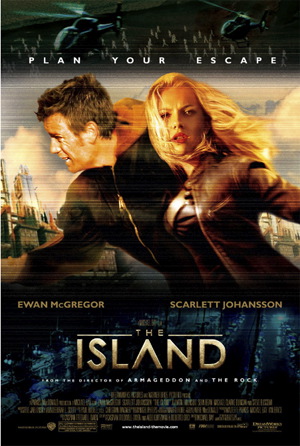
Semi-spoiler warning: if you are planning to see this movie, I would recommend waiting to see it before you read my review. The less you know about the movie, the better (and I do recommend it). However, if you have no desire to see this movie, based on what you've seen in the trailer, please read on so that I might hopefully change your mind!
Okay, let's get the negative out of the way, first. The Island seems to be a blatant rip-off of Logan's Run , but with a twist. There are more parallels than I could even begin to list here (even the outfits look similar), and the ending of both movies could probably be swapped out and it wouldn't make a difference for either movie.
Having said that, The Island is actually a pretty good movie. The trailer did a pretty good job of not revealing too much about the story that would give away the secret (that I'm about to give away). It's best enjoyed if you gradually learn the secrets as the characters do. However, that little-revealing trailer may also have worked against the movie because it hasn't done well at the box office. Further, it's received some rather undeserved (in my opinion) bad reviews. Perhaps this is because it's the only large-budget movie this summer that really deals with any current ethical issues.
Okay, here's the story. The year is 2019 (the same year in which Blade Runner takes place) Ewan McGregor plays a character named Lincoln 6 Echo (kinda like Logan 5 in Logan's Run) who lives in a utopian pleasure-world where everyone want to win a lottery to go the "The Island." Right about the same time his friend, Jordan 2 Delta (kinda like Jessica 6 in Logan's Run, and played by Scarlett Johansson ) wins the lottery to go to the island, Lincoln finds out that there is no island. It's all a big lie. To his horror he find out that he and his friends are all clones, grown as "insurance policies" for wealthy individuals in case any of their organs fail. The clones have been grown to the same size and age of their real live counterparts and implanted with false memories. They've been told that the outside world was contaminated in some kind of apocalyptic holocaust. The clones have been educated to about the level of a 15 year old, males and females are not allowed to touch, and they know nothing about sex. In reality, they have the maturity of adolescents, even though they look like full grown adults.
That's the setup. Inevitably, a number of clones begin to question their existence, and predictably Lincoln and Jordan escape to the "real world." From this point, the movie becomes your typical "fugitive" type movie as Merrick (played quite wickedly by Sean Bean) who is the mastermind who is behind the clone insurance policy, sends mercenaries out to retrieve the two escapees who have gone to find Lincoln's "original." It's at this point that The Island departs somewhat from the original Logan's World. And I won't tell any more (although it's somewhat predictable).
Anyway, even if this much sci-fi is more than you usually care for, let me tell you why the movie is significant. It's important because it wrestles with the question of what it means to be human and the question of cloning for medicinal purposes. I found it interesting that the movie was based in 2019, only 14 years away. That's not far off, but cloning a human being isn't that far off either. Scientists have cloned a sheep, a cat, and last week a dog. Supposedly, there's already a race on to clone a human being. Now, move to the debate over stem cells. Scientists want to harvest stem cells from aborted fetuses, and there are even some who want to fertilize eggs without letting the fetuses grow to full term for the purpose of harvesting stem cells. The next step once a human has been cloned will be to clone humans for harvest. Would you be willing to clone human beings to supply stem cells or supply organs for transplant? If not, then why is it right to use aborted fetuses? Get ready--it's coming.
And there's a horror to cloning that the average person never sees. To create the cloned dog announced in Korea a few days ago, scientists had over 1,000 failed attempts. That's 1,000 dogs (at some level of development) that had to be destroyed. Are you ready to start doing that with human beings? The Island is a movie that people need to see and then afterwards use as a springboard to discuss the ethical issues. The fact that a lot of people want to ignore these issues is part of why this movie hasn't done that well--at least that's my hunch.
McGregor and Johansson both prove strong leads. McGregor has the task of playing two roles in this movie: the original Tom Lincoln and his clone, Lincoln 6 Echo. He does a very nice job of distinguishing between the two, even down to different accents for the characters. For Johansson, this is her first opportunity to play a lead adult female role. She's no longer the little girl or someone's daughter. But, the movie is not perfect. As I already mentioned, it's a clone (pun intended) of Logan's Run. And it's a bit long to be honest. After some point, you just want the story to get resolved. And finally, if I can put myself into the shoes of the bad guys again, as I did in my Batman Begins review , I would like to make a suggestion for evil megalomaniacs everywhere. Rather than kill the clones who were questioning their existence, why couldn't Merrick simply put them in jail cells in solitary confinement? Why do they have to be content and happy and have purpose to be good organ donors?
I'm telling you, I would be a really successful bad guy because I would just be so much more practical in my schemes for power...
Mini-Review: Mr. & Mrs. Smith
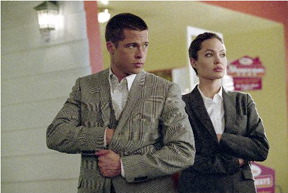
Don't try to take this movie too seriously. It's a comedy, although everything is played fairly straight. There are some rather entertaining scenes with the Smiths at a marriage counselor's office that would have been great in the trailer for establishing them as a married couple. Oh well. Pitt and Jolie have good chemistry on screen (Jennifer Aniston should have had a clue). Unfortunately the movie is a bit protracted at times, and even though we're not supposed to take it too seriously, the gunfight at the end has got to be one of the most unrealistic I've ever seen. How come only the Smiths are wearing bullet proof vests? You'd think that their enemies would be smart enough to wear them, too.
I suppose the movie contains some kind of metaphorical value in regard to marriage. Only after the Smiths have come clean with each other regarding their past and who they really are, do they find that their marriage is worth fighting for. That process is painful, bloody and explosive (all three on both literal and figurative accounts) for them. Honesty with themselves and each other redefines their relationship for the better. What I've just written makes the movie sound better than what it really is--I'm just telling you what might be the redeeming value of the story. Personally, I'm glad I only paid matinee prices, but for you I recommend waiting for a DVD rental if you bother at all.
Batman Begins: Two Reviews for the Price of One
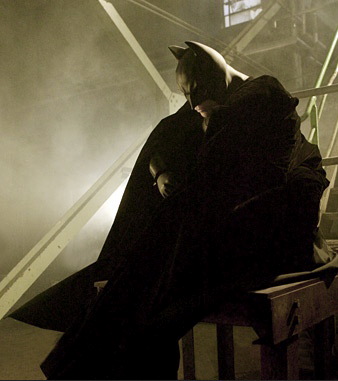
WARNING: There are some spoilers below.
Andrew writes:
The Batman movie is to DC what Spiderman 2 is to Marvel...they not only got it right, they almost got it perfect.
Christian Bale is perfect. He is believable at all levels--Batman, playboy Bruce Wayne, and tortured Bruce Wayne. I thought they made a little too much of playboy Bruce Wayne--I never thought of the Bruce Wayne persona as an alcoholic and playboy, but it makes sense, given that Batman is constructing his persona. Michael Keaton was scary as Batman; Bale is downright menacing everytime he speaks.
Of the rest, Liam Neeson was the best, intense and mean as nails as Bruce's League of Shadows mentor--and also unexpectedly sympathetic. The last shot of him I thought very touching. The Jim Gordon character was good at first, but toward the end he was used as comic relief, and I didn't like that. The character playing Scarecrow was actually scarier without his mask (in a good way). And the Rachel character didn't take too much away from the movie, though you find it hard to believe she is the city D.A. by the end... I mean, she's so young.
Other good things:
• Special effects were happily kept to a fair minimum till the ending.
• The chase involving the Batmobile is impressive.
• The first shot of the League of Shadows mountaintop fortress is beautiful.
• "Can I show you my mask?"
• "Well, at least we'll have extras."
• Bruce Wayne's increasingly hilarious reasons for borrowing weaponry from Lucius Fox.
• "It's kind of technical."
• Bruce's first attempt at jumping buildings, and the way they stage Batman's first appearance.
• "We burned London to the ground."
• Scarecrow's exit.
• The surprising amount of psychology they put into the movie--we really get to see the "birth" of Batman (not just the putting on of the suit), and the implications it has and will have on who Bruce Wayne is, and the cost it will have for him and for his family, his family history (including the way Bruce's parents fit into the villian's plot), and for the city of Gotham.
• The surprise "cameo" at the end.
The bad, if any:
I didn't like the treatment of the Gordon charcter in the latter part of the movie. And I had trouble with the construction of the Bruce Wayne playboy persona. And most of all, as seems to be the standard much today, all the action was shot close up and jarringly edited. Oh, and with about all movies I see these days, they didn't use enough light in the projector and the sound mix was deafening...I actually had trouble hearing some of the dialogue which is unusual for me.
But it was great, great, great. Highly recommended. I'll probably get the DVD, to savor it better.
Rick adds:
In the comic books, Batman returned to his darker roots in the Denny O'Neil/Neil Adams stories of the late sixties and early seventies. This was partly in reaction to the high camp of the television series with Adam West. But then in the eighties, Batman was taken to a rougher, grittier level with the Frank Miller version seen primarily in The Dark Knight Returns and then in Batman: Year One. Frank Miller's Batman was the inspiration behind Tim Burton's 1989 Batman with Michael Keaton, and that version continued in Batman Returns (although I did not care much for the latter--but I know, Andrew, that it is your favorite of last decade's series).
However, I feel that Batman Begins most fully realizes the essence of the Frank Miller Batman. Here Batman is rough, tough and a bit scary to both the bad guys and the good guys. Although scriptwriter David Goyer insists that his inspiration for Batman Begins came from stories other than Miller's Year One, this movie could not have been made without Year One having been written first. If you don't believe me, pick it up and look for the similarities.
At first I was a bit wary of having a whole movie dedicated to Batman's beginnings. The thing I usually don't enjoy in a super-hero movie is the origin story. To me the process of getting there isn't as exciting as what they can do now that they are there. But Batman Begins created a solid back-story to the character. If you've ever wondered how he trained, why he chose the symbol of a bat, where the Batcave came from and the technologies behind the costume and the Batmobile, this movie answers these kinds of questions. Not only does it answer them, it puts them in the context of a compelling story.
And don't think of this as a prequel to the previous four movies. The franchise is completely restarting. When Kathy and I saw it, she kept trying to fit it into what we knew from the other Batman movies. Forget what you learned about Batman in the previous movies. Everything is now new again.
A few nitpicks:
• I know Katie Holmes is the hottest new actress in Hollywood right now, but I felt she was the weakest cast selection. In real life Holmes is 27 years old. She looks 20. I had trouble seeing her as Gotham's district attorney which she promotes to by the end of the movie.
• The plot by Ra's Al Ghul to poison the city is highly convoluted. They poison the city's water supply. Then they are supposed to fire this microwave contraption which will evaporate the water and spread the poison into the air. Well, there are too many steps involved in all that and too much that can go wrong. Why not just fly a crop duster over Gotham and poison everyone that way? See...if I were a criminal mastermind, I would get the job done. I would be practical in my methodology, and I would never EVER explain my whole plan in detail to the one person who might be able to stop me.
• What was the deal with Batman being able to summon a swarm of bats? I've never seen that before. It felt like a parody of Aquaman summoning sea life.
• The movie is hard to hear on two different levels. Most of the movies I see these days are at the theater in Shelbyville, Kentucky, which to me has the best sound system in the area--I think just because it's the newest theater. Well, by the end of Batman Begins my ears were ringing. This movie is just plain LOUD. And there were a number of times that I just couldn't understand the dialogue either because of background noise or because it was just unintelligible.
Other than that, the movie is excellent. Although there were some aspects I liked in the previous four Batman movies, Batman Begins is by far better than any of them. Forget how disappointed you were with Loony Clooney's version of Batman. Make sure you see this movie.
So far, the summer's entertainment is shaping up quite nicely...
Star Wars, Episode III: Revenge of the Sith
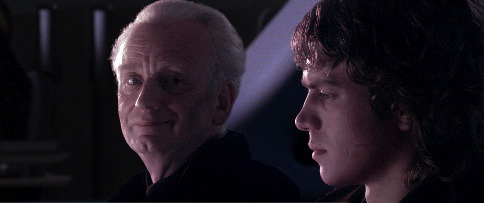
The ultimate question: how could one individual with so much promise...be such a lousy actor?
Wow. I feel like a kid again. Why? Well for three reasons: there's a new Star Wars movie out, it actually doesn't stink, and I've already seen it twice in less than a week's time.
I was one of the millions who saw the first showing at midnight of opening day. There were lots of folks there in full costume of their favorite Star Wars characters. I've never seen so many nerds in one place in my life. Rob, Matt and I were the only cool people there. However, it's fun seeing a movie at a showing like that. These are the true fans. They applaud at all the appropriate times. No one talks during the movie (except me when I was making comments to Matt and Rob). Then, Kathy and I went to see Revenge of the Sith on Friday night. We had to endure crying babies, but the sound system was better at the theater we attended.
The good news is that Lucas finally got it right with the last of the prequels. If you remember, The Phantom Menace was on one hand annoyingly childish and on the other hand overly complicated (find me one person who can explain the political subplot of the first and second movies after only one viewing). Attack of the Clones was not only complicated, but just plain long and boring.
Over the last couple of weeks before Revenge of the Sith (from here on, simply ROTS) was released, Kathy and I re-watched the first two prequels since I had not seen either since their theater showings, and she had never seen the second one at all. I will say this... they "stunk less" than what I remembered, especially Phantom Menace. I think that's because back in 1999, I was looking SO forward to the movie that I was incredibly disappointed. And now, watching it six years later, perhaps because my expectations were so low, I suppose it wasn't quite as bad as what I remembered. Maybe it just ages well. Hmmmm....no, it doesn't age well. I was right the first time--my expectations were just lower.
Anyway, ROTS is indisputably the best of the prequels. If you loved the original movies but felt burned by the prequels, go see ROTS. This is the first of the new movies to bring back the original drama and spirit of the originals. There's even the trademark Star Wars brand of humor (you either understand that, or you don't). The characters, with the exception of Anakin and Padmé, seemed to have a little bit more depth. In fact, Ewan McGregor (Obi-Wan Kenobe), Ian McDiarmid (Chancelor Palpatine/Darth Sidious), and--dare I say it--R2D2 carry the movie.
McGregor has made it no secret that he studied Sir Alec Guinness' work from the original Star Wars flims, and also Guinness' other films to prepare for the role of Obi-Wan. He wanted to capture Guiness' unique inflection and dramatic timing. He did a fairly decent job with this in the earlier prequels, but in ROTS, he has it down pat. His first lines sound exactly like a young Alec Guiness. For the first time, the younger Obi-Wan becomes a likable character that you can relate to.
And if McGregor carries the movie for the good guys, it is definitely McDiarmid who moves things along for the dark side. McDiarmid was fun to watch because you knew he was pulling the shots behind the scenes and manipulating young Anakin. However, at times, I felt like McDiarmid looked a little bit too much like Montgomery Burns from the Simpsons.
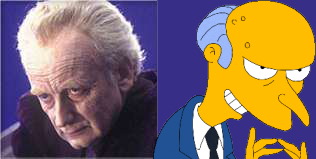
Palpatine & Burns: separated at birth?
Another standout--but overlooked--character was R2D2. Finally, we have the R2D2 of the original movies: free-spirited, independent, and exhibiting a great sense of humor. I give credit to Lucas for taking this garbage can-looking robot and giving "him" a distinct personality. However, R2D2 has now developed abilities not seen in the other movies, such as flying. He never flew in the original movies...
Of course, the heart of the movie is the transformation of Anakin Skywalker into the villainous Darth Vader. What can I say about Hayden Christiansen? Well, I can't say that he's an accomplished actor. I've been told he's very good in Shattered Glass. I don't know because I haven't seen it, but I know he's pretty flat in the second and third prequels. Kathy pointed out that there's a huge distinction in the opening scene between Hayden's and McGregor's reactions. Maybe this has to do with an actor's maturity because in reality, they are acting in front of a blue screen and they can't see the images around them that we see. But when you watch the film, McGregor seems to really be interacting with his surroundings. Christiansen is not very believable.
Natalie Portman returns as Skywalker's love interest, Padmé, but this is the weakest of her three prequel performances. There's really not much for her to do here other than worry about Anakin, give birth to Luke and Leia, and die (oh stop it--I have NOT given away any plot points you didn't know about). Lucas proves again that he cannot write romantic dialogue. The love talk between Padmé and Anakin makes you want to hurl into your Junior Mints.
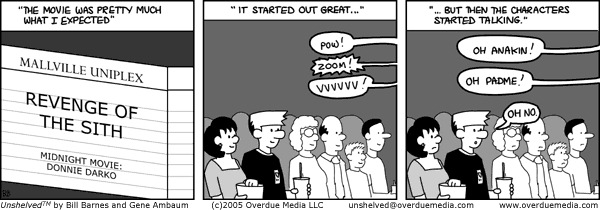
As I said, this is the best of the prequels, and I genuinely liked this movie. But it's not without its faults, including the dialogue referenced above. It's also the most violent and the only chapter of the six to receive a PG-13 rating. Get ready for lots of dismemberment and beheadings, and even a disturbing final solution for the Jedi younglings.
Further, Anakin is too easily manipulated by Palpatine. I mean, how naive can a person be? And I was disappointed with the reasons behind Padmé's death. It just seemed a bit too simple and convenient. They have so much technology in the Star Wars galaxy. However, not only can they not perform a simple ultrasound so that the Skywalkers know they're expecting twins, but they can't (and don't) do anything to try to save Padmé. Put her on life-support or something. Sheesh.
Fortunately, this movie doesn't need life-support. It's doing quite well and deservedly so. If you're a Star Wars purist and have either avoided the prequels or were disappointed like I was, ROTS will probably please you. Too bad all three of the prequels couldn't be like this.
Narnia Is Coming
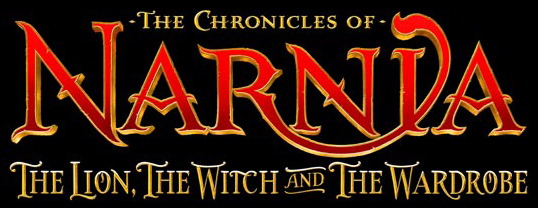
USA Today ran an article today (I can't think of any other way to phrase that) about the upcoming big screen adaptation of C. S. Lewis' Chronicles of Narnia: The Lion, the Witch, and the Wardrobe.
The first trailer will air this Saturday night (May 7) during ABC's showing of Harry Potter and the Chamber of Secrets. I suppose that's a fitting time to show it because in terms of literary ancestry, we probably wouldn't have Harry Potter if we had not had The Chronicles of Narnia first. As soon as the trailer is available online, I will update this blog entry to provide a link.
Update: the trailer is now available: http://www.apple.com/trailers/disney/thechroniclesofnarnia/
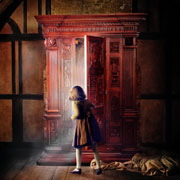
- The movie is co-produced by Disney and Walden Media (the creators of family entertainment such as Holes and Because of Winn-Dixie).
- Plans are currently to produce all seven books into movies (just like the plans for the Harry Potter series).
- The director is Andrew Adamson who also directed Shrek and Shrek 2.
- Tilda Swinton (who I thought was wonderful as Gabriel in Constantine) plays the witch. Very good casting in my opinion.
- Douglas Gresham, head of Lewis' estate, is co-producer of the film (which means it has family support).
The movie itself won't be out until December. But that's okay. We need something to pick up the slack since the Lord of the Rings trilogy ended as the end-of-the-year-big-movie-tradition. Until then, I suppose you can read the story again to yourself or read it to your children. And be sure and explain to them exactly what a wardrobe is. I doubt it's in their vocabulary.
So Long and Thanks for All the Fish!
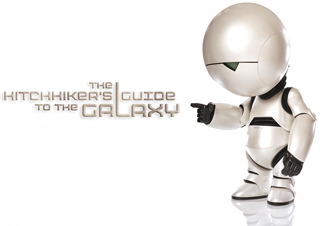
The answer to the meaning of life, the universe, and everything is 42.
Okay, if you're already familiar with the book(s) by Douglas Adams (and if you liked them), you will like this movie. It's not a perfect adaptation because LOTS of material is left out. However, it's just about as good as you can get in a two-hour adaptation.
If you're not familiar with the Hitchhiker's Guide, but if you liked a TV show like Futurama (which ripped off a lot of material from Hitchhiker's Guide), you will probably like the movie.
Having said that, the Hitchhiker's Guide to the Galaxy is about a normal fellow named Arthur Dent who loses his house and planet in one day as he is swept away from earth with his friend Ford (who turns out to be an alien) and embarks on an adventure with an assortment of unusual characters.
I know that's very vague, and I'm being that way on purpose. Part of the fun of the movie is the gradual discovery of things as the story unfolds. The screen adaption was written by the book's author, Douglas Adams, before his death a couple of years ago. Perhaps this is why it retains so much of the feel of the original story. Hitchhiker's Guide has some of the most unusual characters you will ever meet. The movie portrays most of them pretty close to the way I pictured them when I read the books and listened to the BBC adaption many years ago. The movie has some incredible special effects with some scenes that all but gave me a sense of vertigo seeing it on the big screen. The aliens were created by Jim Henson Studios, and they do a good job, but they have that fairly standard Jim Henson/Fraggle Rock look.
The movie is funny, quirky, and leaves you shaking your head in disbelief at times. But I also admit that it also grew a bit tedious now and then when I wanted the characters to just "get on with things."
If you're a fan, by all means see it. If you're not a fan already and know nothing about it, you're on your own. The movie is very British in style and sense of humor. If that appeals to you, I would imagine you will like it. I predict that this will not be a blockbuster, but the fans who appreciate it will be satisfied.
Overall, I liked the screen adaptation of Hitchhiker's Guide to the Galaxy, but for some reason, I feel like I would have liked it more about twenty years ago. I wonder why that is?
The Bruce And Me
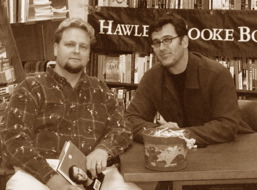
Last year when I wrote a review of Bubba Ho-tep , I mentioned that I had actually met THE BRUCE a few years back. Tonight, I happened to come across the long-lost picture. This photo of Bruce Campbell and me was taken October 31, 2001 at the now-defunct Hawley-Cooke bookstore. He was there to sign copies of his book, If Chins Could Kill: Confessions of a B-Movie Actor .
Now, if I could just find that picture of me and Ron Ely ...
Oliver Stone's Alexander
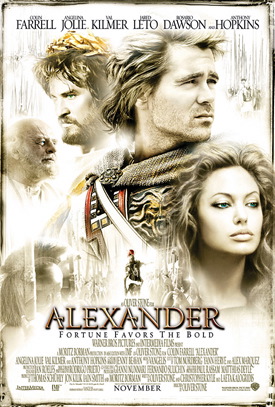
After this he fell sick and perceived that he was dying. So he summoned his most honored officers, who had been brought up with him from youth, and divided his kingdom among them while he was still alive. And after Alexander had reigned twelve years, he died.
1 Maccabees 1:1-8, NRSV
Colin Farrell will not look back on this picture as the highlight of his career.
I really cannot recommend Alexander for entertainment's sake. If you love ancient history as I do, you might get something out of it. Frankly, I breathed deeply as I looked out over the city of Babylon with Euphrates River flowing directly through the middle of the city. The landscapes and battles interest me, but that's about it. I was not pleased with the story written by Oliver Stone who also directed the movie.
Oliver Stone loves to twist history. I suppose that by creating an Alexander with bisexual tendencies, an Alexander with a maniacal obsession to find the eastern edge of the world, an Alexander who was poisoned at his death gives Stone some kind of warped feeling of significance. But as far as I know, Alexander the Great was none of these things.
The movie has an all-star cast. Christopher Plummer plays Aristotle. Anthony Hopkins is Ptolemy and narrates much of the movie. Val Kilmer is an excellent choice to play Alexander's father, Philip the Macedonian. Surprisingly, Angelina Jolee delivers perhaps the best performance of the film as Alexander's ambitious mother, Olympias.
But I am sure I am not the only person who has pointed out that Colin Farrell makes a lousy Alexander. I didn't feel that he ever fit the part, and frankly, it was a distraction throughout the movie. Casting for the younger Alexander was very well done as the boy they selected looked so much like Colin Farrell that you would think they filmed these scenes twenty years ago. Yet Farrell as Alexander was a disappointment.
Alexander is extremely violent and contains some of the bloodiest battle scenes I've ever watched. If you're a hard-core history fan and want to see a modern recreation of the ancient world, you may enjoy at least a little bit of the movie. However, if you aren't the least bit interested in such things, I would recommend that you stay away from Stone's interpretation altogether.
I know of no direct evidence that Alexander had leanings toward homosexuality. It could be possible since he was educated by Aristotle and the Greeks promoted the erotic love of young boys as a viable lifestyle. Note that this idea was not as welcome later in Roman society and absolutely forbidden in Jewish thought. But Stone wants to portray Alexander as a modern person--open to all forms of sexuality and openly welcoming all people, including the non-Greek-speaking (the barbarians) as equal. But it just doesn't work in the film.
Although the battle scenes were exciting at first, there are eventually so many of them that they become routine and trying to line up movie battles with actual historical battles became a bit tedious, if not impossible. By the time Alexander and his troops were in India where the locals charged into battle on elephants, I felt like I was back watching The Return of the King as the" oliphants" attacked.
From a biblical perspective, Alexander was a very significant individual. Alexander is referenced implicitly in Scripture if you interpret him as the third beast in Daniel (Dan 7:6). And he is mentioned by name in 1 Maccabees as quoted above. His real contribution comes from spreading the Greek culture, something that he--like his father Philip before him--had been quite enamored with. In reality, both Alexander and his father Philip were Macedonians, but they saw Greek education and government as something superior to their own.
By spreading a common language throughout the known world, New Testament Christians would be able to spread the Gospel without virtually any language barrier. The New Testament itself was written in Greek. The spread of the Gospel message would have been considerably more difficult had it not been for Alexander's military campaigns and the unifying effect he had on the ancient world.
I have attached an Adobe Reader/PDF file below that contains an article on the real Alexander from the IVP New Testament Backgrounds Dictionary. You will need the free Adobe Reader to access this file.
alexander.pdf
National Treasure
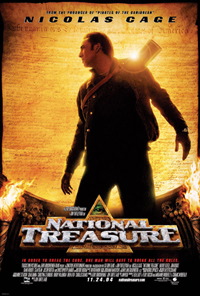
I'm sure you know this by now, but Nicolas Cage plays Benjamin Franklin Gates who is the inheritor of a family secret about an ancient treasure that has been passed down from the Templar Knights of the Crusades to the Founding Fathers of our nation. I'm not telling you anything the previews haven't to mention that the key to finding this treasure is written in invisible ink on the back of the Declaration of Independence. But Gates isn't the only one who knows this. And since the bad guys want to steal it, Gates decides the only right thing to do is to steal it himself. And thus, you have the setting for a race to get to the treasure first.
This movie has elements that you've seen before. Mix Raiders of the Lost Ark, Tombraider, Oceans 11/12, and the plot points of a Dan Brown novel and you have National Treasure. But in spite of the fact that it's not the most original of movies, it is a very well done movie, compared for instance with disappointing second Tombraider installment last year. If you like history, especially history of the Revolutionary War era, you will love this movie. I could realistically see a high school history teacher showing this movie to his class and then using it as a catalyst to discuss key events in the founding of our nation.
National Treasure makes a great date movie. It's just long enough at an hour and a half. It's clean, entertaining, and tells a great story.
Napoleon Dynamite
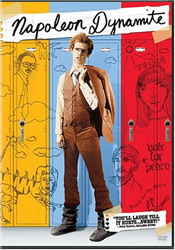
Girls only want boyfriends who have great skills. You know, like nunchuck skills, bowhunting skills, computer hacking skills...
Napoleon's compliment to Deb:
I see you're drinking 1% milk. Is that because you think you're fat? Because you're not. You could probably be drinking whole milk.
You'll find mixed reviews on this movie. I liked it. Roger Ebert hated it. So who're you going to go with? But Roger, like a lot of folks, will never get this movie. He's uncomfortable with it and compares it to Adam Sandler movies which he also doesn't like. He feels like these movies make fun of certain kinds of people and he doesn't like that. But if you look at an Adam Sandler movie like Water Boy , surely folks know that it is not about real people. Sandler's character is more of a caricature in that film than anything else. Maybe Ebert just feels a bit guilty for picking on the other kids when he was in school.
Napoleon Dynamite is not a caricature. I knew people just like him when I was in high school. Napoleon for the most part lives in his own fantasy world. He's into nunchucks, Chinese throwing stars, D&D, and more than anything else, he is not afraid to be who is.
I remember a friend of mine named Paul in high school. Paul was a bit of a misfit like Napoleon, but a very likable fellow if you got to know him. One day in the dressing room after PE, a much larger guy started picking on him. Paul reached down and pulled out a pair of nunchucks from the front of his pants (yeah, really). He raised them up in the air and struck a pose right out of a B-grade martial arts movie. The bully simply reached down, took the nunchucks from Paul, and hit him over the head with them. I walked over to Paul and helped him up off the floor. My suggestion to him? I said, "Paul, in the future, if you are going to pull those things out, you'd better use them or run."
Anyway, Napoleon Dynamite lives with his brother and grandmother in [the beautiful state of] Idaho. Grandma gets hurt riding dune buggies, and Uncle Rico comes to live with them. Meanwhile, Napoleon befriends Pedro, the only latino and the only guy with a mustache in the school. He decides to help Pedro run against the popular girl Summer for class president. Oh, and both Napoleon and Pedro seem to like the same girl, Deb. That's essentially the plot.
It's really a pretty funny movie. Really.
But you'll either get it or you won't. It's according to what kind of sense of humor you have. Probably guys will like this movie more than girls, although Kathy laughed all the way through it.
I liked Napoleon. He's not afraid to be himself in spite of being very different from his classmates. He's not afraid of being an outsider. He had a strong sense of fairness and unfairness. He's not afraid to stand up for others who are being picked on, and he's a loyal friend.
This movie also has a number of throw-away scenes that have nothing to do with the central plot. There's a scene where Napoleon identifies different kinds of tainted milk for a panel and is extremely pleased with himself that he can get every one correct. This has nothing to do with anything, but it gives you further insight into Napoleon's character.
Kathy and I saw this movie over the weekend at the Village 8, here in Louisville--a theater that shows movies a few months after their release for a lower ticket price. There was a group of folks in the theater who obviously had seen the movie before. Had it not been for them, we wouldn't have known to wait until the credits were over to see the wedding scene.
Napoleon Dynamite is an independent film that was a hit at the 2004 Sundance Film Festival. The entire movie was edited in producer Jeremy Coon's apartment on a Mac using Final Cut Pro. Fox Searchlight Pictures picked it up after representatives saw it at Sundance. It was released over the summer and is now on DVD. Rent it, and don't be surprised if you find yourself asking things like "Do the chickens have large talons"?
At the Movies This Weekend: The Incredibles, New Revenge of the Sith Trailer, and More
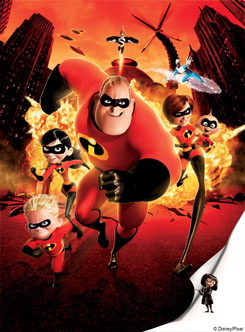
1. The ability to fly. I do this a lot in my dreams, but it would be nice during the waking hours, too.
2. The ability to read, write, and speak any language, past or present.
3. The ability to turn invisible at will.
After those would come the normal invulnerability, rays from my eyes, etc.
Well, this is a super-hero movie, and a very fun one. The Incredibles is the newest movie from Pixar , the same company that made animated films such as both Toy Story movies, Finding Nemo, A Bug's Life, and Monsters Inc. I know I am still the only person in American not to have gotten around to seeing Finding Nemo yet, but it's on my To Do List.
Rabbit Trail #1: Although Disney's name is on this movie, the mouse really has nothing to do with it. Pixar is the company responsible for these movies. Disney just distributes them. They had a multi-movie deal that is now up. Steve Jobs, who heads Pixar (and Apple Computers), tried to negotiate a better deal with Disney in the way profits are shared. Michael Eisner of Disney wouldn't budge on the old terms, and Pixar has now said, "See ya" to them. So look in the future to Pixar movies without the Disney logo. That is unless a new deal is reached or if Eisner is ousted and Jobs is made head of Disney. This could happen.
Oh yeah...back to the movie.
We don't think about the private lives of super-heroes very often, do we? Sure Clark Kent is a reporter for a great metropolitan newspaper, Bruce Wayne is a millionaire playboy, and Peter Parker is a photographer. But how often do we see them getting nagged by their wives, stuck in traffic, having to break up fights among the kids? How often do we see them worried about the extra pounds they've put on or whether they can still fit into the old costume?
The Incredibles is a movie that takes place in a world fifteen years after super-heroes have been ordered to go into hiding through government relocation programs. They are trying to blend in with society and lead "normal" lives, but it is not easy. The movie doesn't waste time with origin stories. We have no idea why these individuals have their powers. Maybe it's a mutant issue, kinda like with the X-Men, but the story doesn't worry with such things. Instead, the principle characters are trying to live normal lives and not use their powers so that they can blend in. But it's hard to be normal after the glory days of saving the world from imminent destruction.
Rabbit trail #2: Have you ever wondered why in the movies and on television, people want to hide their powers? Darren always wanted Samantha to not use her powers, and Major Nelson tried to keep Jeanie hidden in the bottle (that was before he gave in and asked to be a Texas oil baron). The Kents never want Clark to let anyone in Smallville know of his "special abiliites." If it were me, I'd be showing off my powers to everyone. If I still had to go to work, I'd fly there. I'd say to the waitress at the Chinese restaurant (in perfect Mandarin, no less), "Hey, I heard what you just said about me, and what's really in the hot and sour soup." And I have to admit it would be difficult not to use my invisibility to my own advantage. Hmm....maybe that's why God doesn't give us "super powers." Spiritual gifts, sure; super powers, no.
The characters have a variety of powers which leads to some very creative teamwork. Mr. Incredible/Bob Parr (voiced by Craig T. Nelson) has a personality that is a cross between Buzz Lightyear and The Tick. His super power is basically super strength and near-invulnerability. His wife, Elastigirl/Helen Parr (voiced by Holly Hunter) can stretch to amazing lengths (think Plastic Man or Reed Richards of the Fantastic Four). They have a teenage daughter, Violet, who can make herself invisible and create force fields. Her younger brother Dash can run at super speed. And then there's the baby who begins to develop his own very creepy powers. All I can say is that it seemed to be a cross between the Human Torch and Hell Boy. Samuel L. Jackson gives voice to a super-hero, Frozone, who can create ice out of the moisture in the air. I kept waiting for him to misquote Ezekiel 25:17, but it never happened. Oh well...maybe in Revenge of the Sith.
Kathy pointed out that the powers the characters had seemed to fit the roles of the individual family members. The father is the very strong leader. The mother has to be flexible to meet the needs of every situation. What teenage girl hasn't wanted to make herself invisible or put a shield between her and others. Every little boy runs here and there and is a handful to keep up with. And the thought of an infant screaming at the top of his lungs seems to match the unique abilities of the youngest Incredible.
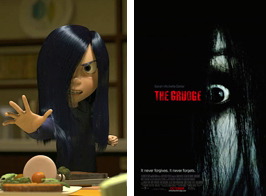
Anyway, I don't want to give away too much of the plot of The Incredibles, but it has great messages about team-work, getting along, and especially finding one's place and purpose in the world. The movie is written and directed by Brad Bird who also wrote and directed another animated great, The Iron Giant . Like that movie, Bird shows a keen interest in robots in this movie, too. The mood in The Incredibles often has a late fifties/early sixties feel to it especially with the big band music that could have come straight out of a Sean Connery James Bond movie.
Take some time to see The Incredibles this weekend. Go by yourself or take the kids. The movie is suitable for all ages, although there is some violence. A handful of people get killed, but their deaths are often more implied than explicitly shown. And even if you aren't normally a fan of animation, everyone enjoys the tales from Pixar, the most creative group to produce animated movies since...well...Disney...
______________________________________________________________________________
STAR WARS: REVENGE OF THE SITH TRAILER
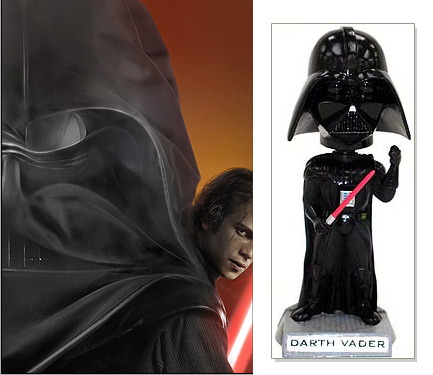
Anyway, this week Lucasfilm released a new poster (shown above left) and the first real trailer for the movie.
First the poster: it's awful. I suppose that Anakin's cape is supposed to be blowing in the wind to create a foreshadowing Darth Vader image. However, it's overdone and looks more like a giant bobblehead with Anakin looking out from behind. Sheesh. Throw it away and start over. Note that Anakin is sporting a scar. That gives it away, you know, because everyone with a scar is a bad guy...
However, maybe they did poorly with the poster because they were spending all their time on the trailer. The trailer looks pretty exciting and it makes me want to see the movie. Granted, a good bit of it is from the original 1977 movie. However, this is the movie that is supposed to tie both sets of films together.
You've got to see this thing. At the moment you are only able to see the trailer if you go see The Incredibles or if you are a paid subscriber to the Hyperspace section of the Star Wars website .
However...I've got it right here for you. Don't ask me how I got it, but I have it. I'll keep it up unless I get a cease and desist letter from George.
Enjoy.
NOTE (12/8/2004): SINCE THE TRAILER IS NOW FREELY AVAILABLE FOR EVERYONE TO SEE AT http://www.starwars.com, I HAVE REMOVED IT FROM THIS BLOG ENTRY TO CONSERVE SPACE ON MY WEBSITE.
______________________________________________________________________________
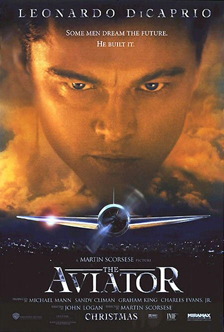
"upcoming attractions" poster of Leo's new
movie about Howard Hughes, The Aviator.
Okay, here's another "Is it just me," but does
DiCaprio make for a spitting image of an
"in-his-prime" Muhammad Ali in this poster?
Revenge of the Jedi-Sith
In 1983, we were all anticipating the third installment (now the 6th episode) of the Star Wars movies, The Revenge of the Jedi. We had seen movie posters and even advertisements for Kenner toys with the title. Then suddenly a few weeks before the movie's release, the name was changed to Return of the Jedi. Supposedly, Lucas decided that a Jedi wouldn't seek revenge. Whatever.
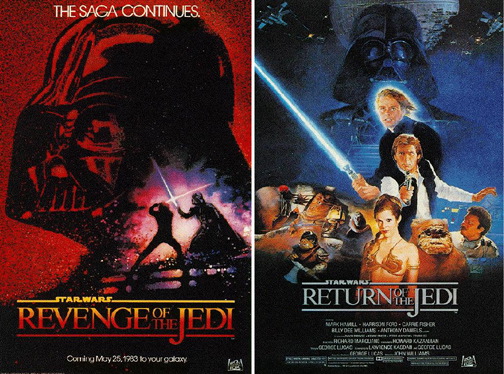
Flash forward two decades and the third episode of the Star Wars prequels has been announced with the title Revenge of the Sith. The natural question I have is whether or not Lucas would change the title last minute, but this time as a premeditated stunt?
Most will say that there's no way--that Lucas wanted a title with "Revenge" in it, and now he finally gets to do it. But consider the official description of the Sith from the Star Wars website: "The Sith are masters of the dark side of the Force and the sworn enemies of the Jedi. They were all but exterminated by the Jedi a thousand years ago, but the evil order continued in secrecy. They operated quietly, behind the scenes, acting in pairs - a Master and an Apprentice - patiently biding their time before they could take over the galaxy. In Episode III, they'll finally exact their revenge on the Jedi."
So as you see, the Sith are both returning and seeking revenge. I guess we'll have to wait until about three weeks before the final release.
A Shelbyville Movie Review
The following conversation actually took place tonight when I was at urinal row in the mens room at the movie theater:
Bubba [I'm just guessing this is his name]: What movie d'you see?
Me [thinking, "oh my. someone's talking to me in the bathroom"]: Ummm....Wicker Park ?
Bubba: Well, all I can say is, don't go see Hero ! That's the one I'm in.
Me [nervously avoiding eye contact]: Okay.
Bubba: They got people flyin'--jumpin' high as a tree an' fightin' w' swords.
Me: Really?
Bubba [starting to walk to the door without washing his hands--I'm not going to point this out to him]: I kin see jumpin as high as a house...but not as high as the trees!
Me [relieved that he's walking out the door]: Well, thanks for the tip.
Bubba [who's turned around and actually come back in the restroom]: ...Plus, I'll tell ya wun more reason not to see it!
Me [thinking, "oh my. He's coming back in here"]: What's that?
Bubba: You gotta READ the whole movie!
Harry Potter and the Prisoner of Alcatraz
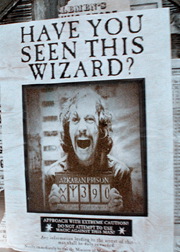
For some of you, Harry Potter is huge. Friday last week (opening day) a friend of mine instant messaged me to ask if I was excited about the new Harry Potter movie. "Not as excited as you, I imagine," I responded.
To be honest, I've been kind of indifferent about Harry Potter. I mean, I'm not a great fan, but I'm not a detractor either. I certainly thought some of the outcry in the Christian community was a bit unfounded, and the emails that circulated with made up facts was little more than bearing false witness. I expect any day now to see a new email circulating that says if you watch Harry Potter while talking on the cell phone, you will become a brain cancer stricken devil worshipper. I'm not saying that the sorcery and divination of Harry Potter aren't worthy of question, but the outcry over it was way overblown with more pressing issues faced by the Christian community. Plus, with the logic some were suggesting, we would also need to remove The Wizard of Oz and perhaps even The Chronicles of Narnia from our bookshelves.
I did read the first two books of the Harry Potter series. They were good--not great, but good. Rowling certainly knows how to write a page-turner. However, I will probably not read any more of them. It's not that I dislike them, but there are so many books out there that I want to read that I don't have time for anyway...
Plus, I know a person , who knows a person who knows J. K. Rowling. He (the person I know) told me that he heard (from the person he knows who knows Rowling) that after the second book was such a hit, the publisher now sends every manuscript back to Rowling asking her to add a couple hundred more pages. They know that fans will buy the books no matter what, so if they can add a few more pages and increase the price significantly, they will stand to make lots more money (this is also why you have to wait longer for the next book). I guess if I could get the original, thinner form of the books, I might read them. But I'm not going to take the time to read the huge tomes that have come out in the last couple of installments.
Anyway, back to the movie. Yes, I did see Harry Potter and the Prisoner of Azkaban on opening night--not so much because I was dying to see it, but because Kathy wanted to see it and she's a pretty big fan (definitely once a huge fan, but maybe not so huge anymore). I went with no expectations. I mean I figured it would be better than a Star Wars prequel, but probably not as good as say, Spider-Man 2. I had seen the first two movies. They were okay, but not great. Clever and imaginative, but certainly not Lord of the Rings fare.
In fact, I had wondered if they would be able to continue to hold the attention of audiences for four more movies as the series is being continued. Floating candles and moving staircases are only intriguing the first few times you see them.
Well, let me tell you I was surprised. This movie was very good. I was engaged from at least after the first fifteen or so minutes to the very end of the movie. Having not read the book (I had started it, but never finished it because I ran out of summer two years ago), the plot twists took me very much off guard. I like it when a story is not predictable, and this one certainly wasn't--at least not to me.
I am not certain why this installment seems better than the first two, but it is. Maybe it's the fact that there's a new director. Maybe it's because Harry and his friends are growing up and I can relate to teenagers better than children. Maybe, the story was just better than the first two. I don't know--it's probably a combination of the three. Regardless, I recommend this movie to you if you are familiar with the storyline so far or if you like fantasy in general. I don't think you'll be disappointed.
Mischief managed...
Chronicles of My Riddick Experience
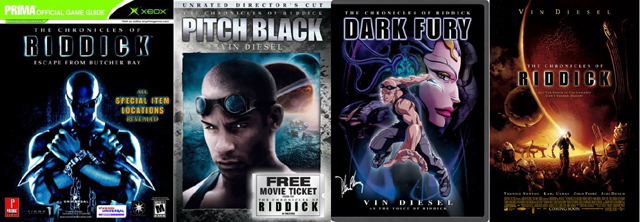
How do you create a Science fiction/movie franchise? Ask David Twohy, the driving force behind the possibly ongoing Chronicles of Riddick saga. I say "possibly ongoing" because the future of the storyline (according to what I've heard) depended a whole lot on ticket sales from the first two opening weeks of The Chronicles of Riddick which debuted at #2 in its opening week but sunk all the way to #6 this past weekend. However, considering it has now made $42 million which is $2 million more than Pitch Black made in its entirety, we may see more of Riddick.
But wait...I'm getting way ahead of myself. There's much to be explained, isn't there? Way back in the year 2000, then barely known actor, Vin Diesel stared in the movie Pitch Black as anti-hero, Richard B. Riddick. Diesel's character is a prisoner of a mercenary simply named Johns who is presumably transporting him to get a reward when their ship crash lands on a planet where the sun hardly ever sets. Well, it sets about every twenty-three years or so, and wouldn't you know it--Riddick, Johns and a whole group of survivors are there at just the right time. Once night falls, monsters come out of the ground. Pitch Black fell squarely into the science fiction-horror genre along the lines of the Alien movies. Oh, and since as you may have guessed from the title, at one point in the movie everything goes...well...pitch black, and you might also find it interesting that among Riddick's more interesting characteristics is his surgically enabled ability to see in the dark.
Flash forward four years and Vin Diesel is a big star now commanding eight-figure salaries. Plus, that little movie Pitch Black, originally made for a measly (by Hollywood standards) $23 million has created a healthy cult following. So how do you make a sequel? With the Alien series, the first movie was good...and really, so was the second one, Aliens. But by the time you get down to the third and fourth installment (I won't include in this example this summer's Alien vs. Predator), all you really have is four rounds of Sigourney Weaver fighting an ugly monster.
Well David Twohy dreamed big, really big. If he had followed the Alien plan, he could have had Riddick back on the planet for round two with the creatures that only come out at night. However, he decided to do something on a much grander scale in this summer's Chronicles of Riddick. He not only changed genres from Sci-Fi/Horror to Sci-Fi/Adventure, but he set about to create an epic Space Opera. But this is not George Lucas fare. Riddick is no Han Solo, and he's certainly not a Luke Skywalker. This series is much darker. And if there is going to be a franchise, Twohy wanted to do everything possible bring us quickly up to speed on Riddick's backstory.
How can I explain this? You see, as of this summer, there are now four parts to the story so far. Twohy wants to do a trilogy, but from what I understand, Pitch Black is NOT part one. This summer's Chronicles of Riddick is part one. Consider Pitch Black to be a prologue where we get introduced to the Riddick character. In fact, EVERYTHING will now fall under the title Chronicles of Riddick. The newly released DVD version of the first movie has now been renamed Chronicles of Riddick: Pitch Black. And my guess is that if Twohy gets the go-ahead to make two more movies, this year's movie will eventually get a subtitle the way the first of Lucas' movies became Star Wars: A New Hope. My prediction (and you heard it here first) is that the current Riddick movie will eventually become known as Chronicles of Riddick: The Underverse if later movies get made.
Pitch Black and Chronicles of Riddick are so different that if I could make a bad Star Trek analogy, the first movie would be kind of like your run of the mill TV episode that's easily forgotten like the one where Kirk meets Abraham Lincoln. But Chronicles of Riddick would be as significant as Wrath of Khan in the ongoing history of the Riddick character. In fact, if you've never seen Pitch Black it wouldn't matter in terms of following the story in Chronicles.
So as I mentioned two paragraphs up, if Twohy is going to create a whole Riddick universe and ongoing franchise, we've got to get up to speed on the background of the Riddick character. He has done this through the release of cross-media. The Matrix series did this in 2003 with the release not only of the final two installments in the movie trilogy, but also through a straight to DVD collection of animated stories (The Animatrix), a video game (Enter the Matrix), and a collection of comic book stories. All of this was designed to give a back story to the events in the movies and give the fan details which were left out of the cinematic tellings. And of course the Star Wars and Star Trek series have done this for years by including video games, novels, and comic books that expand on the stories in the movies.
So this year to coincide with the release of Chronicles of Riddick, fans also have a video game (Chronicles of Riddick: Escape from Butcher Bay), and a straight to DVD animated tale (Chronicles of Riddick: Dark Fury). The video game helps to set the stage for Pitch Black explaining how Riddick got his eyes that see in the dark. And the animated tale bridges the gap between the first and second movies.
So here's the proper chronological order if you're following this so far:
1. Chronicles of Riddick: Escape from Butcher Bay (video game)
2. Chronicles of Riddick: Pitch Black (first movie)
3. Chronicles of Riddick: Dark Fury (animated DVD)
4. Chronicles of Riddick (this summer's movie)
These stories are set in what seems to be our future. I say that it is our future (as opposed to something like the Star Wars universe which takes place "a long time ago, in a galaxy far, far away) because there are cultural references and slang that originated in our culture. But unless, I missed it, no one has ever said for sure.
I had not see Pitch Black when it was first at the theater. In fact, I barely remember it at all. But I was intrigued by the trailer and online buzz surrounding Chronicles of Riddick, so I rented it two days before going to see the current movie. As I've already mentioned, the first movie is very different from the second one. Everyone calls Riddick an anti-hero. In the second movie, that description applies, but it's hard to know if it's applicable in the first one. In Pitch Black, I can't decide if I even like Riddick at all. I mean anti-heroes range from the selfish Han Solo in the Star Wars stories to perhaps even (on the other extreme) Warren Beatty's portrayal of Clyde Barrow. To me an anti-hero is someone who is flawed but either does good things in the end (like Han Solo) or doesn't do good things (like Clyde Barrow), but because of the way the story is told, you are drawn to him anyway.
In Pitch Black, I don't know if I even liked Riddick. He was selfish, arrogant, mean, and there was very little if anything redeemable about him. Let me give you a comparison. In the first Star Wars movie, Han Solo is a fairly selfish guy and says he is not going to help the Rebellion fight the Death Star even though they really need him. But in the end, he changes his mind and comes through for them because his conscience makes him. Well in Pitch Black, there's one point in the movie where Riddick is going to take the only available ship and leave the planet even though he knows he is leaving the other survivors to a certain death. Had the ship's captain not caught up with him, he would have certainly gotten away with it. However, when one character makes the ultimate sacrifice for Riddick in the movie, you begin to feel for a moment that perhaps Riddick does have a heart after all because the act seems to visibly move him. That was enough to intrigue me and make me want to see more.
As I've mentioned, this summer's movie is vastly different from the 2000 installment. How do I describe it? This movie is so large. In it Riddick comes out of a self-imposed exile to stand in the way of an oppressive force known as the Necromongers--a group of bad guys that are somewhere between the Empire in Star Wars and the Borg in Star Trek. It turns out that he isn't a nobody, but a person of huge significance for the future of freedom in the universe. The movie has a very unexpected ending (which oddly reminded me of the Conan movies) and honestly, I have no idea where Twohy will go with sequels if he makes them. Chronicles of Riddick received a PG-13 rating opposed to the R rating that Pitch Black received. Both language and violence were toned WAY down. In fact, most of the fight sequences were shown through quick cut-away shots that give the viewer a sense of action but very little detail.
After seeing the first two movies, I rented the video game, Chronicles of Riddick: Escape from Butcher Bay from Blockbuster. Most video games that are movie tie-ins, frankly stink. Escape from Butcher Bay is a rare exception. Visually, it is one of the most graphically detailed games ever created for the X-Box (it is not available for the PS2 or GameCube). Although much of it plays like a first person shooter, it is much more than that. Also involved is quite a bit of stealth, problem solving, and there's even a short run in mech assault type armor. As I've already mentioned, this game serves to explain how Riddick got his "nightvision" and how Johns (the mercenary) and Riddick came to be aboard the ship in Pitch Black. The story revolves around Riddick's attempt to escape from maximum security prison, "Butcher Bay" (also referenced in the current movie). I had the game rental for a week and played it all the way through with a day to spare. It is rated M for mature because of violent content and language. Violent content can be lessened in the optional settings. What I don't understand is why video games don't have similar features regarding language.
Tonight, I rented Chronicles of Riddick: Dark Fury. Chronologically it takes place immediately after the events in Pitch Black. Riddick, Imam, and Jack (Kyra)--the survivors of Pitch Black are taken captive aboard a ship of mercenaries. The story is written by David Twohy and the animation is primarily the work of Peter Chung who also was behind "Matriculated" in The Animatrix (incidentally, Chung's work is some of my least favorite in Animatrix, but that's just me). We are also introduced to the mercenary Toombs who is prominently featured in The Chronicles of Riddick. I was disappointed that after spending $4 for this rental, the story lasts only about 35 minutes. There are a handful of behind the scenes segments, but nothing really that stands out. It's too bad that they didn't have time to create a few more Riddick stories to go on this disc. Although this is supposed to bridge the five years between the first two movies, I think it would be safer to say that it bridges about a day's worth. There's certainly room to tell a whole lot more. For instance, although it is hinted at, what really caused such antagonism to develop between Kyra and Riddick by the time we get to the second movie. Yes, we are told that he left when she needed him and all that, but her feelings were really intense by the time Riddick finds her in this summer's installment. Interestingly, in Pitch Black, actress Rhiana Griffith played Jack and also provides his voice in Dark Fury. The grown up Jack-turned-Krya in Chronicles of Riddick is played by Alexa Davalos.
Throughout the storyline so far (with maybe the exception of Escape from Butcher Bay) is Riddick's own personal struggle against his own nihilistic tendencies and perhaps even faith in something beyond himself. In the first movie, Imam, the Islamic cleric (played by Keith David), tries to encourage Riddick to have faith. Imam tells Riddick that his problem is that he doesn't believe in God. Riddick counters that it's Imam who doesn't understand. Riddick explains that he was found as an infant in a dumpster with his umbilical cord around his neck and that he's spent more than half his life in prison. He says that it's not that he doesn't believe in God. On the contrary, he does believe in Him and he hates him. He is out for self. But it's the sacrifice of Fry in Pitch Black that seems to reach beyond that tough exterior and hints that perhaps there's something more than just a hardened criminal in the person of Riddick. In Dark Fury, in one particular tight spot, Riddick simply says to Imam, "Pray." And then in Chronicles of Riddick, there is a religion that the Necromongers bring to conquered worlds, but it is not a religion of freedom but of darkness and slavery. When they conquor a people, they offer the simple chance to either convert or die. Conversion leads to reorienting one's thoughts and begins a life devoted to eventually reaching the "Underverse." Riddick rejects such a distortion of faith. It will be interesting to see if Twohy continues to pursue this part of Riddick's faith journey (if there are future installments).
The only part of the Riddick push I haven't taken part in (and don't plan to) are the novelizations of the movies. Although the first was done by a writer known for writing novelizations of movies, Chronicles of Riddick is novelized by sci-fi great, Alan Dean Foster. The makers of the series are trying very hard to create a hard core sci-fi franchise. This summer's movie made Riddick's world seem immense--Frank Herbert-Dune-size immense. The question remains as to whether or not they will be successful. Right now, reviews seem to be a bit mixed. I enjoyed my time spent with Riddick, but it didn't intrigue me as much as The Matrix series did. Nor did it stir my imagination in the way that Tolkien did when I read his books as a teenager or even when I saw the original Star Wars trilogy. But who knows...maybe Riddick will grow on us.
__________________________________________________________________________________________
Side note: Has anyone noticed that movie rentals have gone up to $4? When did that happen?
Bored by the MTV Movie Awards
In years past, I've gauged how "in-touch" I felt with pop culture and especially the under-25 crowd by how many presenters I recognized. Last night I didn't even care that much. All I saw was two hours of self-absorbed, self-indulgent ego.
Consider Adam Sandler and Drew Barrymore accepting the award for "Best On-Screen Team" (a very loosely defined category based on the nominees). They didn't really have anyone to thank, so they thanked the state of Hawaii where they filmed the movie. Seann William Scott who won for "Best Dance Sequence" in a very goofy and stiltingly memorized acceptance speech thanked Patrick Swayze, Kevin Bacon, and John Travolta (for their past dancing roles).
The MTV Movie Awards used to be known for their spontaneity. Regardless of how scripted it actually was, it used to not seem that way. Everything was scripted last night from the introductions to many of the acceptance speeches. And the scripting itself seemed poorly done.
Listening to Snoop Dog botch his lines as he used the award for Best Kiss to finagle a kiss from Paris Hilton was nothing but painful. And what have we come to as a culture when the winners of Best Kiss are three individuals, not two?
In past years, MTV has spoofed the most popular movies of the year. They moved away from that this year and engaged more in dialogue and faux interviews from Will Ferrell's character Ron Burgundy from the upcoming movie Anchorman. Two were mildly noteworthy. The opening sequence featured Ben Stiller and Vince Vaughn portraying Hollywood producers trying to convince Peter Jackson (played by himself) to stretch the Lord of the Rings just a bit more into a fourth movie. It was mildly amusing.
And then Ron Burgundy interviewed Jim Caviezel (who portrayed Jesus in The Passion of the Christ). I'm still convinced that Caviezel is a clone of the taller guy on Adam 12, but that's another matter. In this piece, Ron Burgundy was under the impression that Jim Caviezel really was Jesus Christ in disguise. In the end Caviezel gets tired of denying it and gets up to leave in disgust only to walk across the top of a swimming pool as Ron Burgundy runs after him. Okay, we saw that (or something like it) coming, but it was still somewhat amusing. Caviezel was nominated for Best Male Performance for his role in The Passion, by the way.
Politically, the left was represented, but even that only felt like token representation. Jack Black was wearing a "Kerry for President" t-shirt. And Michael Moore, via a pre-recorded spot, plugged his new "documentary," Fahrenheit 9/11 under the guise of "we have 15 extra seconds because one of the winners isn't here." Sheesh.
Here's a lineup of what won:
Best movie: The Lord of the Rings: The Return of the King
Male performance: Johnny Depp, Pirates of the Caribbean: The Curse of the Black Pearl
Female performance: Uma Thurman, Kill Bill: Vol. 1
On-screen team: Adam Sandler and Drew Barrymore, 50 First Dates
Best kiss: Owen Wilson, Amy Smart and Carmen Electra, Starsky & Hutch
Best villain: Lucy Liu, Kill Bill: Vol. 1
Action sequence: "The Battle at Gondor," The Lord of the Rings: The Return of the King
Dance sequence: Seann William Scott, American Wedding
Breakthrough male: Shawn Ashmore, X2: X-Men United
Breakthrough female: Lindsay Lohan, Freaky Friday
Best fight: Uma Thurman vs. Chiaki Kuriyama, Kill Bill: Vol. 1
Comedic performance: Jack Black, School of Rock
One final thought... I found it interesting that Lord of the Rings won both Best Picture at the Academy Awards and the same top spot at the MTV Music Awards. Everyone likes LOTR--young and old, liberal and conservative, religious and non-religious.
I guess in the end, Tolkien brings us together...
Bubba Ho-Tep
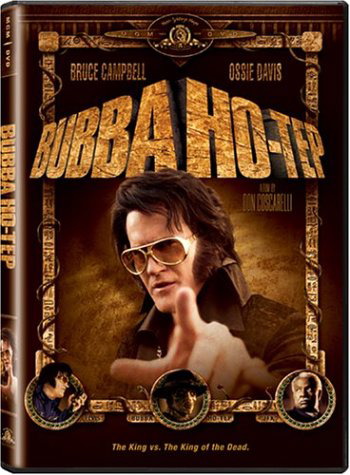
When I sat down with him, I said, "Mr. Campbell, I am a Bible teacher at a private Christian school and it just so happens that Army of Darkness is one of my favorite movies of all time." He laughed at that and said, "Well, it's not evil--it's just tongue-in-cheek fun and a lot of people like it." I talked to him a little bit more, but I don't remember what we said. I even had a picture made with him, but unfortunately I can't find it.
Anyway, that night when The Bruce spoke to everyone assembled at Hawley Cooke was the first time I had ever heard of Bubba Ho-Tep . Evidently, the movie was finished and Bruce mentioned then that they didn't have a distributor for it yet. In fact, flash-forward three years later and they never did find one which is why you probably haven't seen this movie at your local theater.
There are lots of good independently produced movies out there that get made without Hollywood funding. They make the rounds of the film festivals and some art house theaters, but that's about it. Incidentally, this was the same situation with Mel Gibson's The Passion of the Christ. It was not backed by any Hollywood studio, but by Gibson's own funds. Only a few weeks before it was to be released, it was finally picked up by a national distributor (probably due to all the pre-release attention that it received). Had this not happened, it would have been relegated to the festivals and private showings.
Well, Bubba Ho-Tep was never picked up by any national distributor. However, almost any movie can make money through video rentals these days, so MGM picked it up for VHS and DVD release. It was released on March 25. I picked it up at Hollywood Video and watched it over Memorial Day weekend.
If you haven't heard of this movie or seen the trailer , you're not going to believe this plot. Okay, here goes...
Imagine that Elvis is not dead. It seems that before his death, he switched places with an Elvis impersonator with the understanding that they would switch back if Elvis ever wanted to. The impersonator turned out to like drugs even more than Elvis, but unfortunately had a bad heart. He died in 1977. Then Elvis, who was impersonating an impersonator impersonating himself (think about that for a while), fell off a stage, cracked his hip, went into a coma and woke up in an East Texas rest home. This is where the beginning of the movie finds him.
Think that's bizarre? Wait, there's more. Now imagine that one of Elvis' fellow residents at the nursing home is a man who claims to be John Kennedy (played by the venerable Ossie Davis ). The problem is, of course, that he's black. But he claims that he didn't die in Dallas. Instead, the CIA dyed his skin black, replaced part of his missing brain with a bag of sand, and put him in this nursing home.
Wait...there's even more...
In addition to the geriatric Elvis and JFK is an Egyptian mummy who is stalking the halls of the nursing home at night stealing the souls of the residents. He is part of the Ho-Tep Egyptian dynasty, but since this is East Texas, the mummy is wearing a western hat and boots. So instead of being Amen Ho-Tep or something similar, he is "Bubba Ho-Tep." Get it?
I remember seeing Heartbreak Hotel in the late eighties in which David Keith played a fictional episode in the late King of Rock & Roll's life. I thought at the time that Elvis Presley was taking on legendary status because now stories were being told about him that didn't actually happen. I mean what else is the definition of a legend other than when new stories are being made up about that person's life? Then, of course there were the Elvis "sightings" of the late eighties as well. Elvis' status as a larger-than-life legend is pretty well in place. We don't really want to believe greats such as Elvis or even JFK are dead. Bubba Ho-Tep allows us to negate history and imagine what these figures would have been like had they made it to old age. Further, we see them as we would like to remember them--with heroic status.
Bruce Campbell makes a great Elvis. I mean certain people are just cool. Bruce is cool like The Fonz was cool (in the first few years of the show, after the powder blue jacket and before the black t-shirt). Elvis (or at least the public image of Elvis) was cool. There were already Elvis references in Army of Darkness ("Hail to the King, baby"). It's a good fit, a natural fit. In this movie, granted, he is playing Elvis as a senior citizen, but he also plays a younger Elvis in the flashbacks. In the scene where Elvis is walking with the "Memphis Mafia," he's got Elvis' swagger down. And he certainly has the voice down.
You really believe that this is Elvis, not just some guy who thinks he's Elvis. However, you're not so sure with the Kennedy character, although he certainly believes he's Kennedy right down to wearing 60's era gray suits and having a red telephone in his room.
What kind of movie is this? Well, it's hard to say. The whole scenario is a gag unto itself. But is it a comedy? If it is, it's a very dark comedy, but it's also played very straight. Maybe Bruce Campbell says it best in one of the DVD extras where he calls it "A redemptive Elvis mummy picture."
There is an underlying theme about growing old and the value of senior citizens in our society. We ignore their past achievements or we patronize and treat them like children. The Elvis in this movie is an Elvis who is cognizant that he is at the end of his life. He is amazed at how quickly it went by, and how he went from fame and fortune and all the women he wanted to a shell of a man confined to a bed in an out-of-the-way rest home. He is haunted by the loss of Priscilla, and he regrets that he was not there for Lisa Marie as she grew up. More than anything else, he just wants to tell his daughter that he loves her.
Bubba Ho-Tep will not be seen by wide audiences. However, it will have instant cult-status because first, it was hard to see at the theaters without a distributor and a video release took two years to finally be realized. Second, anything with Bruce Campbell automatically has cult-status because he has cult status. When I rented it at Hollywood Video, I was pleased to see that they had quite a few copies. But if you wait a year or two, I would guess that your mainstream video shops won't stock it. You will have to go to the out of the way video stores that specialize in foreign films and cult classics to find it .
Bubba Ho-Tep is rated R for language, some sexual content, and brief violent images. My biggest complaint about the movie is the strong language which I found unnecessary. It seems that often if a movie centers on pre-adolescent boys or male senior citizens, there is an overemphasis upon body functions. This movie is no different. The movie is based on a "novella" by Joe Lansdale. I've never read anything by Lansdale, but in one of the bonus features on the DVD, he reads the first chapter of his story upon which the movie was based. The language of Lansdale's work is even stronger than that in the movie, and I thought the movie was a bit crude in some places. I really regret that Don Coscareli, who wrote the screenplay and directed the movie, didn't aim for a PG rating because the R rating comes primarily from the language. But I suppose that Coscareli was aiming to be faithful to the original story, and that's too bad. The concept is both original and clever.
Did I like it? Yes. Do I recommend it? Well, I don't know. It's more up to you and your tastes. When you hear the plot that a geriatric Elvis & JFK duo are battling a mummy in an East Texas nursing home, does that excite you or do you think it's just plain odd and you wonder about my tastes, too? Well if it excites you, go see it. If you think that it's really weird, well...you probably just won't get it.
Thank you...thankyaverymuch...
Midnight Showing at the Local Mosque
According to a news story at ChristianityToday.com , the most popular movie right now in the Middle East is...get this...The Passion of the Christ.
Although the movie is banned in some countries such as Kuwait and Saudi Arabia, Muslims are seeing the movie anyway thanks to bootleg DVDs (does the Koran allow for stealing, as long as it's stealing from infidels?) that are in the local markets.
Why is the movie popular? It's popular because--if you remember--the early buzz on the movie said it was anti-Semitic (it's not as noted in my review, elsewhere in this blog). Having heard the buzz, Muslims are flocking to see the movie hoping that it puts the Jews in a bad light.
Let's hope instead that they see a message of One who offers forgiveness to his enemies rather than retaliation.
Jesus is referred to as a prophet in the Koran, but essential aspects of his life and nature such as the virgin birth and his claim to the title of Son of God are denied. Hopefully, this movie will have a similar effect in the Middle East as it had in the US--maybe it will encourage viewers to actually read THE BOOK.
Shalom.
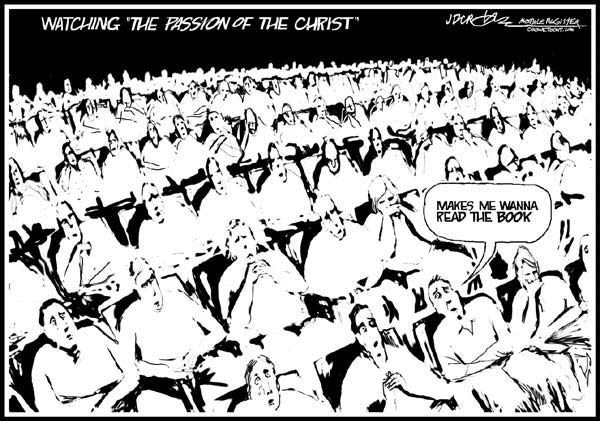
The Passion of the Christ
My church has reserved three screens for The Passion of the Christ in March. So why did I go opening day? I suppose I wanted to experience it first simply by myself. If I wanted to cry, I could cry. If I wanted to sit and ponder, I could do that in peace. I wouldn't have to worry about someone turning to me at the end and saying "So, whadid ya think?"
No one could ignore this movie with all the buildup surrounding it. I was a bit surprised when I first heard that Mel Gibson was producing and directing it. Mel Gibson? Mad Max? The guy who was in three Lethal Weapon movies? Yeah...that Mel Gibson. But I really wasn't hit with the significance of it all until I saw the Diane Sawyer interview a few days ago. Yes, it was that Mel Gibson. And he was quoting Scripture and espousing theology really well (except for that thing about the exclusivity of the Gospel, but I think if I could sit down with him, I could set him straight).
And then there was the controversy. But is this anything new? And I don't mean this to be anti-Semitic at all, but haven't certain Jews been trying to debunk and detract from the whole Jesus story since Matt 28:13? But I want to bang my head on this one. I don't think it's fair to call the gospels anti-Semitic because what people seem to forget is that Jesus himself was a Jew! And so were the majority of the writers of the New Testament for that matter. Heck, you can legitimately say that the New Testament is a Jewish document.
Can we get beyond this blame issue regarding who killed Jesus? On the surface, yes, there were a group of Jewish leaders who had been conspiring to kill Jesus ever since he raised Lazarus from the dead (John 11:47 ff). But it's ludicrous to blame all Jews for the rest of eternity for this. I mean if Jesus had been born a Baptist, the Baptists would have killed him! (I know that makes no sense, but you know what I mean...)
I grew up in the deep South where there was lots of prejudice. I don't remember ever hearing racial statements made against Jewish people. I really don't think this is an issue anymore in most areas of our society. Granted there are some neo-Nazi, white-supremist types who hate Jews, but they hate everybody.
Mel Gibson has a solid understanding of who killed Jesus. He revealed to Diane Sawyer that in the movie, the hand holding the nail to be pounded into Jesus' palm is his own left (Latin: sinister) hand. Who killed Jesus? Mel did. I did. You did. Jew and Gentile alike killed Jesus.
What can I say about the movie that hasn't already been said? Yes it is well done, and yes it is violent--extremely violent. A friend of mine wrote me a couple of days ago to say that he really didn't think people were quite as prepared as perhaps they should be in regard to just how violent it is. He is right. And if you don't like the sight of blood, do not go to this movie. This is not Max Von Sydow in The Greatest Story Ever Told. It is VERY bloody. And any parent needs to really think through taking a child. The movie is Rated R for a very good reason.
Obviously, this movie is like the Titanic in that you already know how it is going to end, so there's not a lot I can worry about giving away here. But there are lots of nice touches throughout the movie. There is a very interesting point of view/camera angle at the moment that Jesus dies on the cross. Intermixed with the trial and crucifixion, there are a number of flashbacks to the Last Supper, the Sermon on the Mount, and even a glimpse of Jesus' childhood relationship with his mother. The movie features some of the creepiest portrayals of the demonic I have ever seen. And I think I realized the movie was going to integrate Scripture seriously when in the first few minutes, Jesus smashes his heel upon the head of a snake, thus fulfilling Gen 3:15.
Throughout the movie, Jesus is pursued by a trio of his followers: Mary his mother, Mary Magdalen, and John, the beloved disciple. Frequent movie goers will recognize Monica Belluci (who played the striking Persephone in the second and third Matrix movies) as Mary Magdalen. Magdalen is portrayed in a flashback as the woman caught in adultery in John 8. And in that scene for a moment, I thought we were going to get to see finally what it was that Jesus wrote in the sand that day. As I watched the actor correctly going from right to left, all I could make out was a Hebrew/Aramaic lamed (equivalent to our "L"). At least now we've narrowed it down to what letter it begins with...
There are only a few seconds devoted to the resurrection (perhaps borrowing from Mark--shorter ending?). At first, I wondered if the average movie-goer might confuse the scene of the resurrected, non-bloody, combed-hair Jesus with one of the flashbacks and totally miss the message. But then the final shot (which I won't reveal here) left nothing to doubt. I was very pleased.
The other thing I might mention is that this movie is very Catholic. Roger Ebert was correct in his review that the movie follows the 14 stations of the cross. Although in interviews, it was said that Gibson primarily followed the Gospels of Matthew and John, I would think it safe to say that the movie's structure is primarily around these Catholic stations. There is even great attention given to Veronica (not mentioned by name in the movie) preparing a drink of water for Jesus and wiping the blood and sweat away from his face (this is the 6th station of the Via Delorosa, by the way--I looked it up). However, to Protestants and other non-Catholics, much of these elements found in conversations and names of characters (such as the names of thieves, Gesmus and Dismas) will come across as artistic embellishment. However, the roots of these elements, while not necessarily biblical, go back hundreds of years into Catholic tradition.
The depictions of the crucifixion in art rarely are all that accurate, and unfortunately, some of the inaccuracies remain in the movie. For instance, we now know that what Jesus probably would have carried on the way to Golgotha was merely the crossbar (the patibulum). The vertical posts (stipes) were usually permanently placed at execution sites. Ironically, in the movie the two thieves correctly carry only the crossbars, but Jesus, for some unexplained reason has to carry an entire lowercase, t-shaped cross. I guess Catholics just can't get away from the image of Jesus carrying an entire cross. The other crucifixion inaccuracy has to do with the placing of the nails. Catholics in the Middle Ages had no real understanding of Roman crucifixion, so they always placed the nails right in the center of the palms in paintings. That misconception continues to this day. However, if a person was crucified by his palms, the nails would tear through and the body would be hurled to the ground. It's now commonly known from archaeology that the nails went into the wrists.
But you know what? These are nitpicks that only someone like myself would even notice. None of that matters. What is important is the message of the movie. As the picture opens, Isa 53:5 is flashed onto the screen. This is the only real context given for the events that take place in this movie. And that has been one of the criticisms from the movie's detractors that audiences might not understand why the Jewish leaders want this Galilean rabbi executed. Well, I suppose that's true enough, but it sure does give the church an opportunity to explain things, doesn't it? And I have a hunch that Mel Gibson knew and wanted it that way. Tell you what...as we're explaining it, why don't we begin around Leviticus 16 and end somewhere around Hebrews 9?
Finally, I might mention the entire movie experience. Yes, this is not the best "date movie" (or is it?). I didn't feel compelled to sit and eat popcorn while Jesus was being crucified (although I did sneak in a thermos of Starbucks coffee). And it's rare to find so many people at the theater in mid-week. Around 12:30 Wednesday afternoon, I tried to reserve my ticket through MovieTickets.com for the 10 PM (last) showing, but it was sold out. I managed to get in a 9:30 showing. I had to stand in a long line that wrapped around the concession area just to present my ticket.
This was the first movie in recent memory that didn't begin with commercials and the first movie I have ever seen in a theater that was not preceded by trailers for coming attractions. I did observe one woman get up and leave during the scourging scene and she did not come back. When it was over, it was over. There was no applause as there had been at the end of the Lord of the Rings movies. Everyone just kind of sat there for a moment. Then, slowly, but not all at once, people began to leave the theater in silence--as if they were quietly exiting a prayer service.
As I walked toward the exit of the theater, I noticed a young woman with cross-shaped ashes smudged on her forehead. I had forgotten it was Ash Wednesday! And because of what I had just experienced, that wonderful symbol from some of the more liturgical expressions of Christianity had a whole new sense of meaning and holiness to me.
But when Christ appeared as a high priest of the good things to come, He entered through the greater and more perfect tabernacle, not made with hands, that is to say, not of this creation; and not through the blood of goats and calves, but through His own blood, He entered the holy place once for all, having obtained eternal redemption (Hebrews 9:11-12, NASB)
Open Range
The movie Open Range will be released on DVD January 20. Not only is it rare to see a western these days, it's even rarer to find a good one. I originally saw Open Range when it was released at the theaters last Fall. My thoughts below are adapted from an email I sent to a few friends after viewing the movie.
Parts of Open Range are very bloody, and a few of its elements seem a bit forced, but it is a good movie overall. It had the feel of a 1950's western, although much more violent than would have been made back then. Some of the dialogue seemed so hokey (Costner: "I'd better go rustle up them cows."), but I think that it was done purposefully, not as camp mind you, but as a throw back to the kind of western that used to be made and that style is taken very seriously in this movie.
Robert Duvall was perfect, but his age is really starting to show. I think if he is smart, this (or at least Secondhand Lions with Michael Caine) will be the last of his rough and tumble action pictures. In the shootout, he is injured, though it is never really shown to what extent. Afterwards, he is seen with this hand at his waist and it almost looked like my grandfather holding his pants up after he has loosened up his from a big meal.
Kevin Kostner's character was reminiscent of the kind of role Clint Eastwood used to play in movies like Pale Rider in which he is struggling to put a past violent way of life behind him but current circumstances force him to resort to his old ways.
Annette Benning is quite beautiful in this movie, and I don't really think I've ever seen her so attractive. With her hair long, she probably looks ten years younger than in real life.
However, the romance between Costner and Benning seemed a bit of what I call a "Love Boat" romance in which people who have only known each other for a few hours or days suddenly realize they are in love and want to spend the rest of their lives together. She talks about the fact that it is a small town, but my gosh, did her life not exist before Costner walked into town? But again, I think this is a throw back to the genre they were trying to produce--a traditional Western with traditional values.
Another aspect that was very traditional, not just for movies, but for the culture is that Costner and Benning never kissed until after he asks her to marry him. From what I understand of 19th century courtship, this is pretty accurate as a lady would never allow herself to be kissed until at least there was an engagement of some kind.
There is a very human scene as Duvall and Costner stand over the grave of their slain friend and attempt say a few words. Duvall, although really the moral center of the two, refuses to speak to God because he is so angry with Him over the situation He has let them get in. Costner's character prays, though, but at the end of his words, also acknowledges that he is angry with God, and then says "So, I guess that means 'amen.'"
The movie seemed a bit long at times, but that may be what I have been preconditioned to in movies over the past few years. There were lots of really nice scenes and conversations that could have been easily cut out, but added to the overall charm of the characters. Leaving some of these things in and the attempt to make a more traditional movie almost makes this movie "experimental" by today's standards.
I've gotten to where I don't read any reviews anymore before I go see movies. I simply base my decision on whether I want to see it on the trailer (the marketing people would be glad to hear that I am sure). But I did read Roger Ebert's review afterwards and he is spot on in the way he describes its strengths and weaknesses. I would recommend it to you after you see the movie or if you probably won't see it at all.
I also recommend the movie to you if you like traditional westerns with traditional values (as opposed to something like Sam Raimi's 1995 The Quick and the Dead [which I also like]). Be warned though, although the genre and values are traditional, the movie is fairly violent in keeping with modern standards, so it is not for the squeamish.










